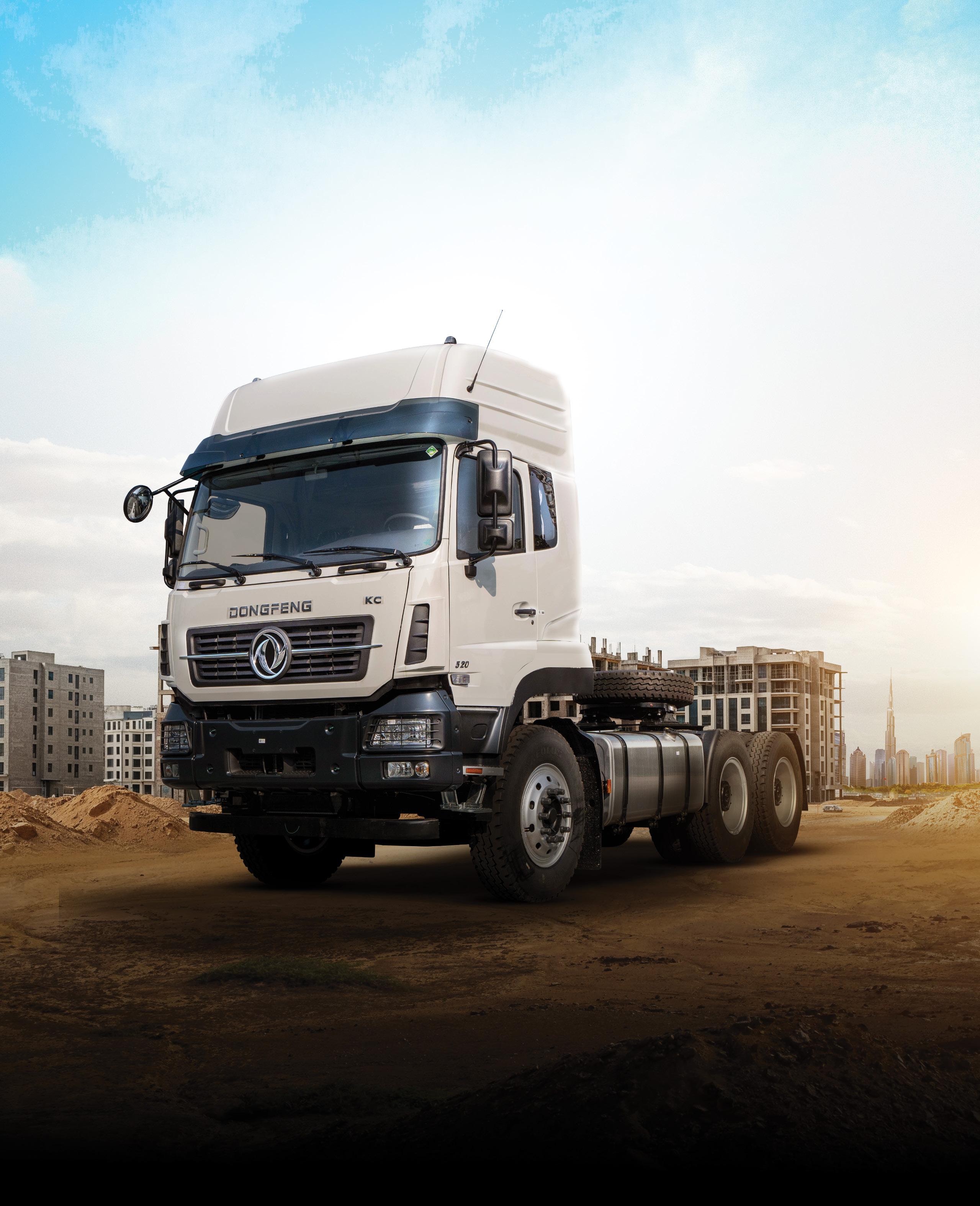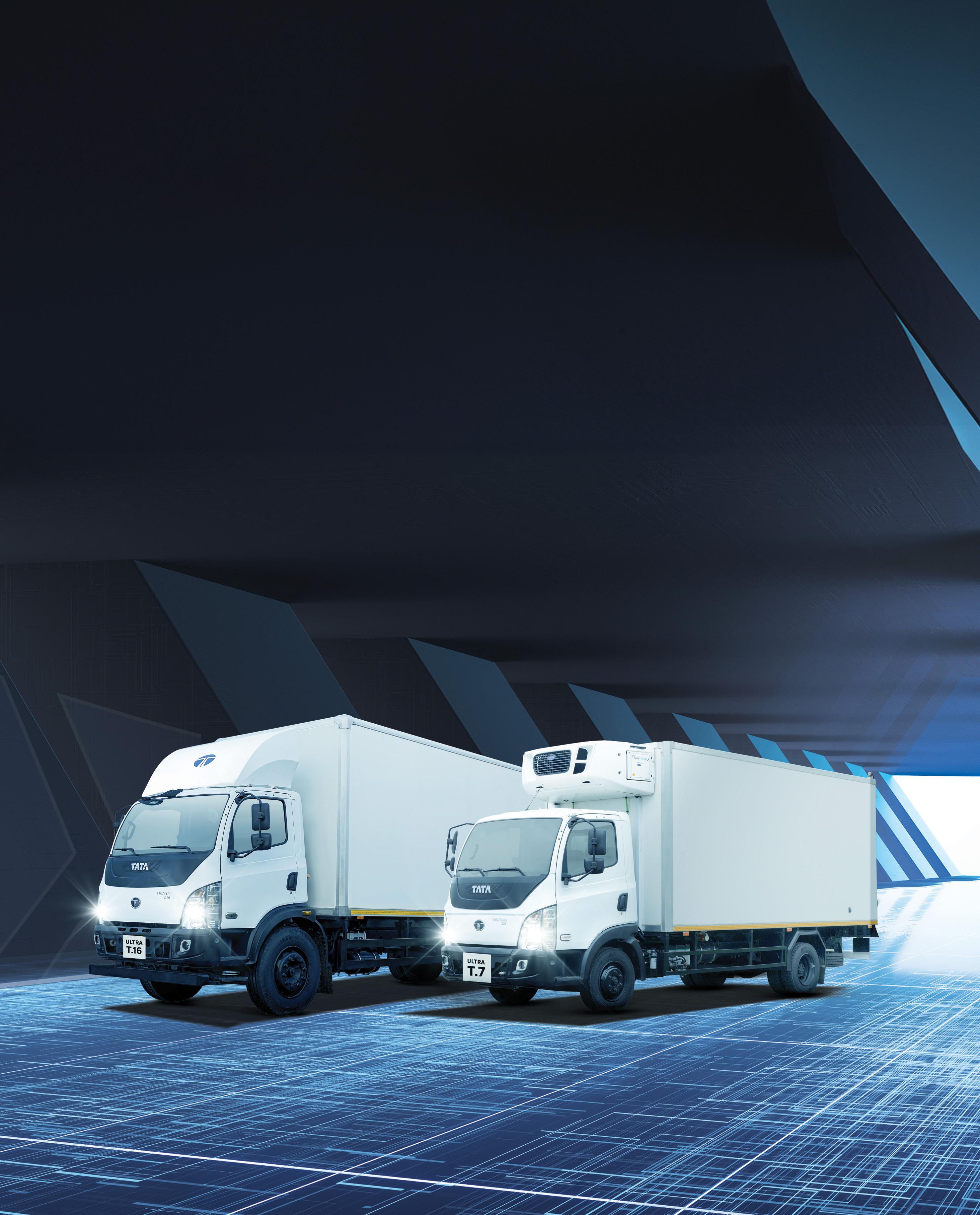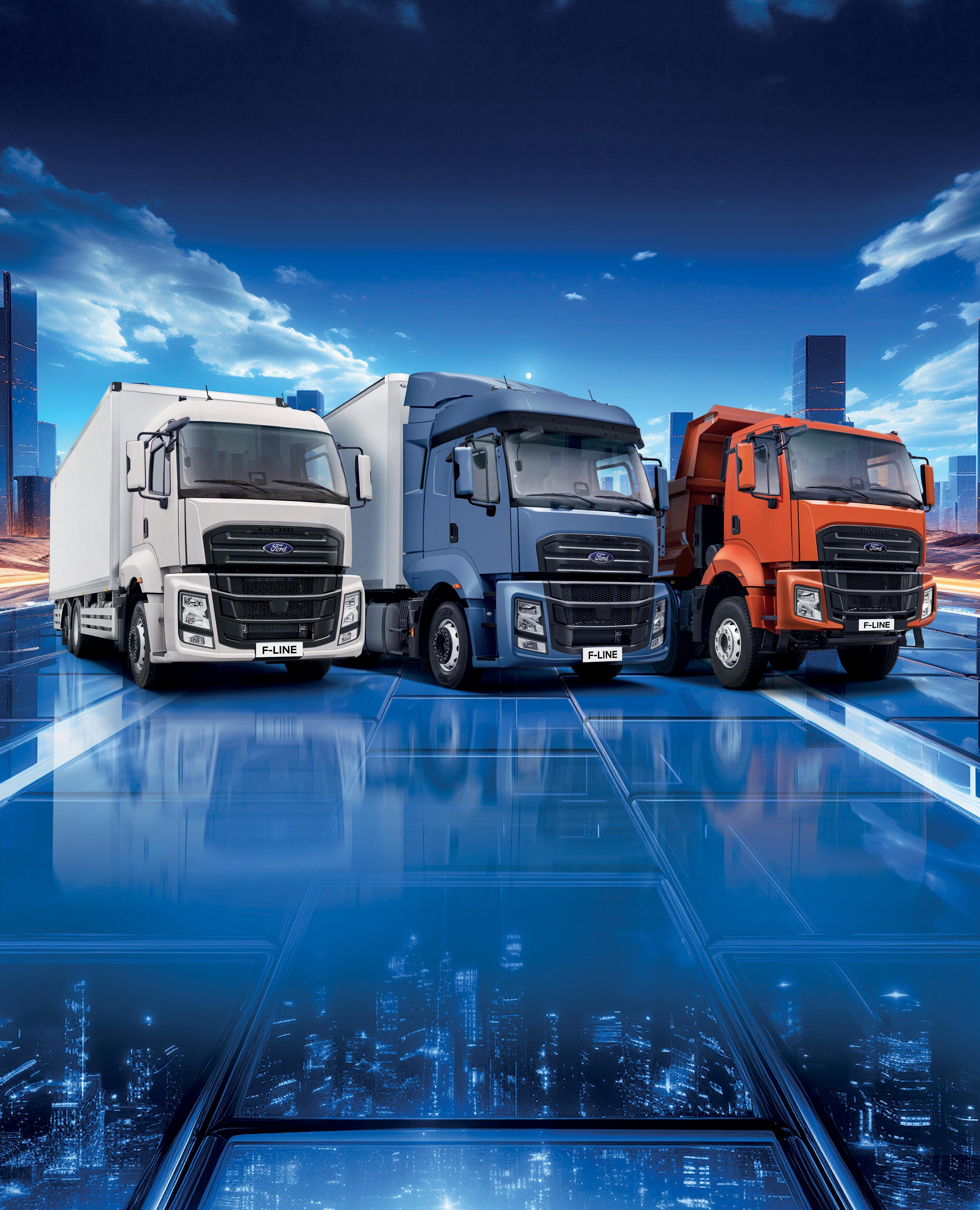

NEW LINE-UP! MEET
T&FME looks at why three is the magic number when it comes to Ford Trucks’ F-Line, its new multi-purpose truck series


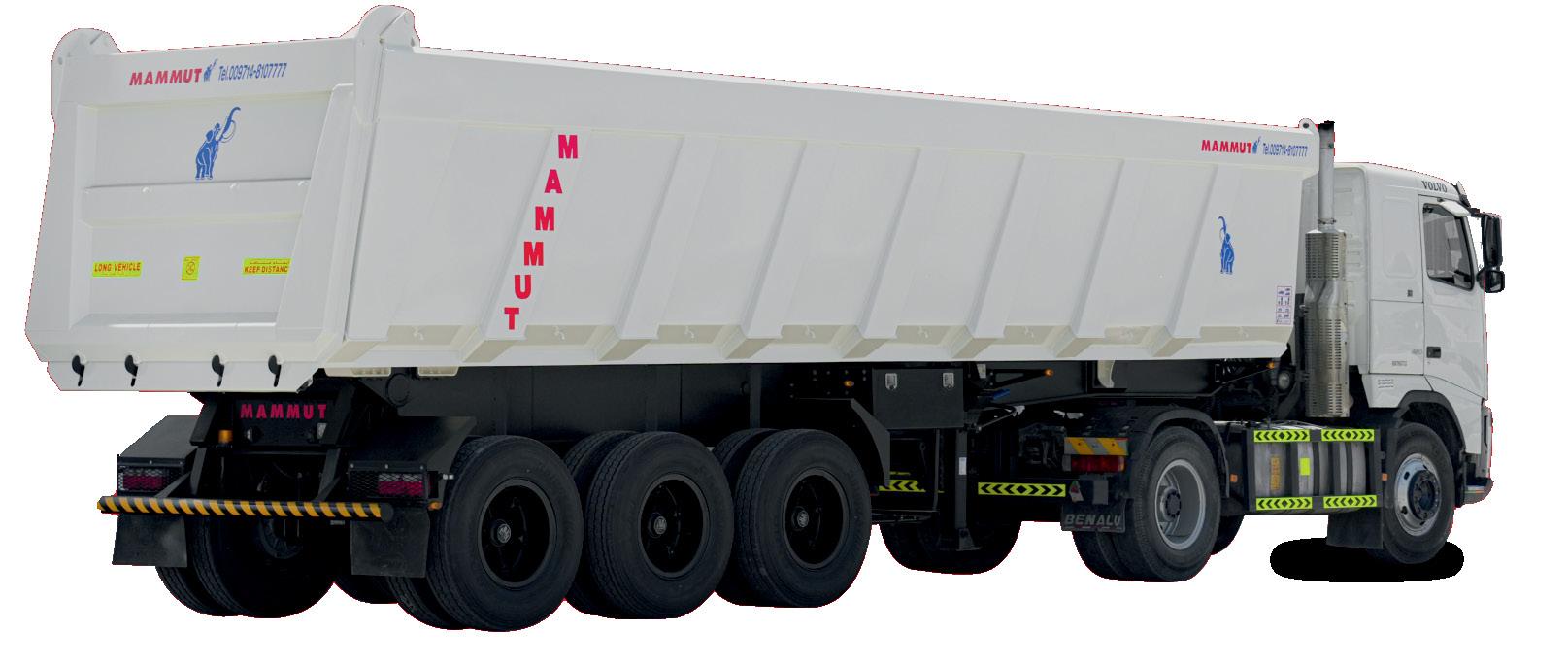

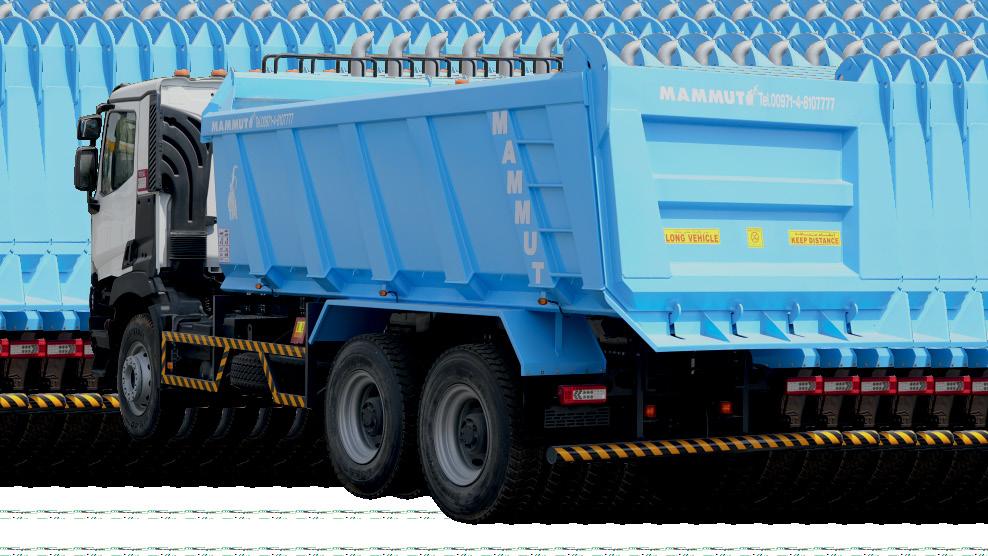
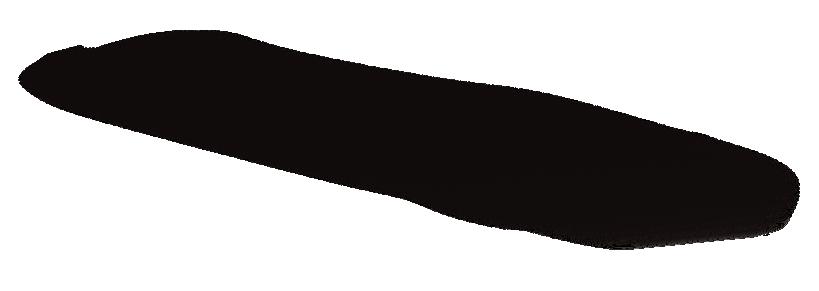

TIPPER TRAILERS
AVAILABLE CAPACITIES: 18 | 23 | 32 | 36 | 48 CBM

TRANSPARENT SPECS AND PROVEN DURABILITY
BUILT FOR THE HEAVIEST LOADS, WITH NO RECONFIGURATIONS
ENGINEERED FOR UPTIME: FEWER BREAKDOWNS, FEWER DELAYS
nazindustries.ae info@nazindustries.ae sales@nazindustries.ae +971 48107777
77th Street, DIP 2, Dubai, UAE

Scan and equire

FEATURE
16 / FORD F-LINE
T&FME takes a look at Ford Trucks’ follow-up to the multiple award-winning F-Max.

ALSO THIS ISSUE …
NEWS
06 / NEWS FROM THE MONTH
Analysis of ADNOC’s latest results.
LAUNCHES
10 / EPIQ FEELING
Skoda unveils its affordable SUV at IAA.
TEST DRIVE
12 / NIO WAY TO DRIVE
T&FME tries out NIO unique charging experience in the EL8 in Abu Dhabi. INTERVIEW
20 / STATE-OF-THEAFTERMARKET
Micky Mathews of ZF Middle East on this career and ZF’s cutting approach to the aftermarket.
SPECIAL INTERVIEW
24 / ASHOK CEO INTERVIEW
Stephen White meets Ashok Leyland’s CEO
Shenu Arguwal to discuss the Indian CV giant’s plans for growth in the region.
FEATURE
28 / DAIMLER’S DILEMMA
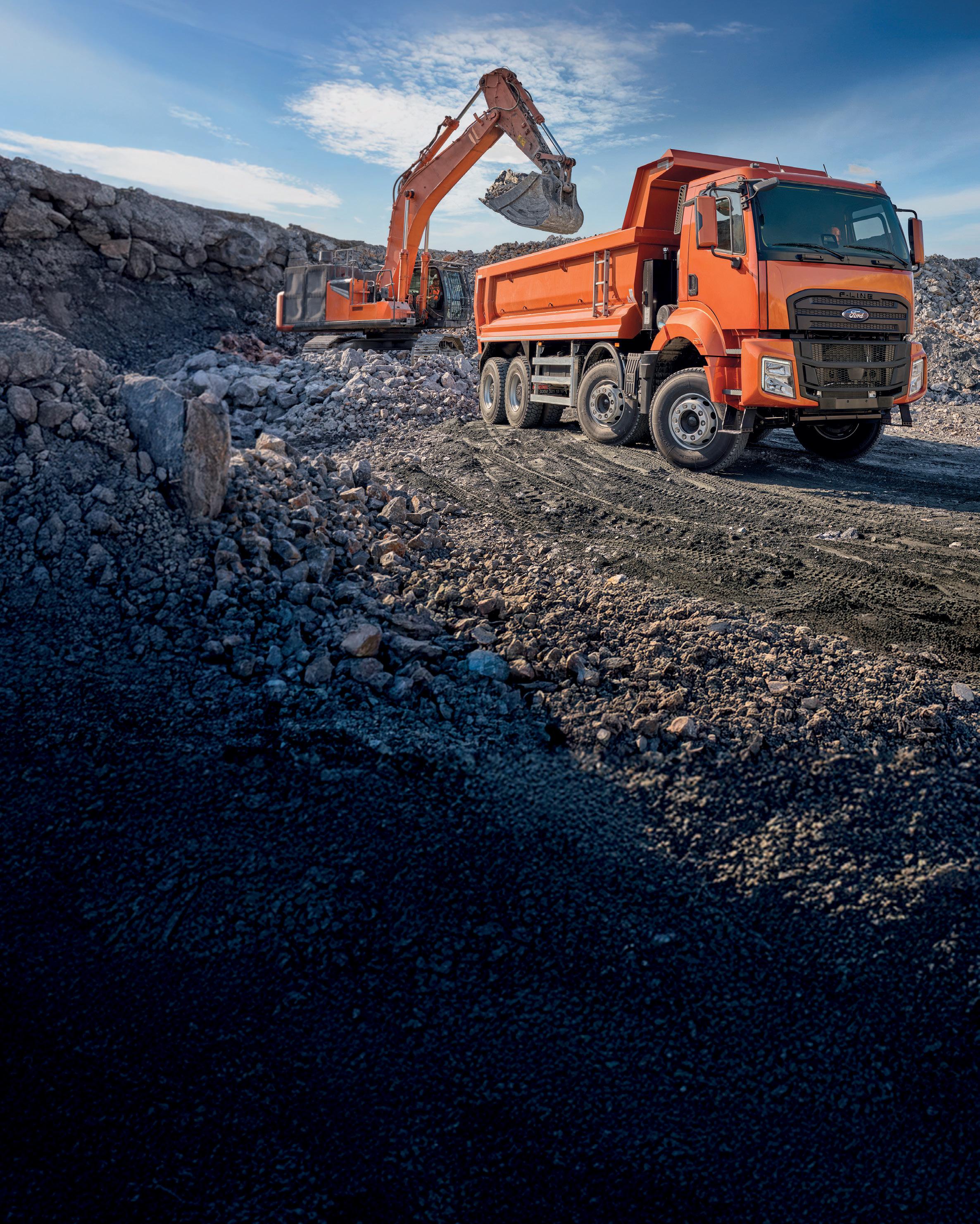

The latest Daimler Truck results demonstrate both the challenges and opportunities for the truck giant in the global market. 06
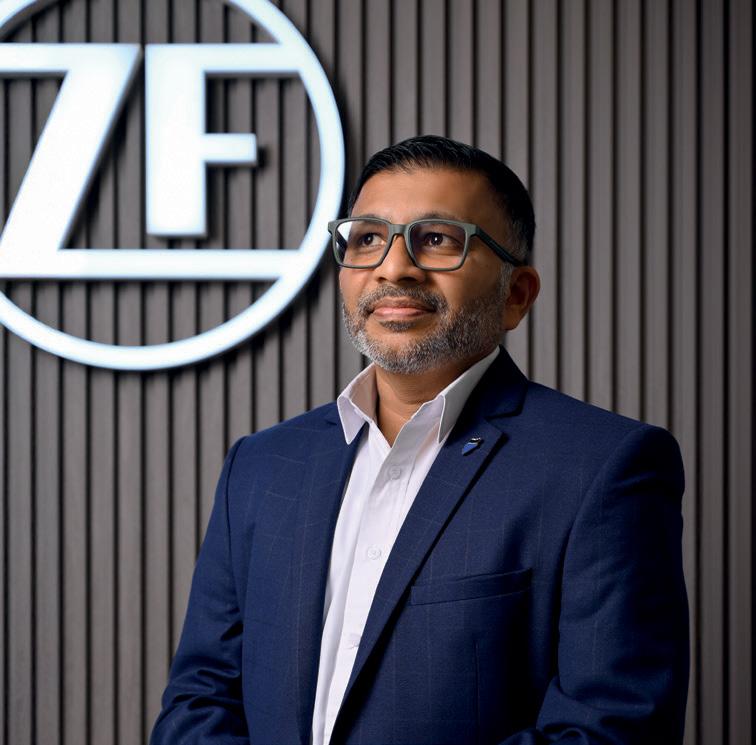
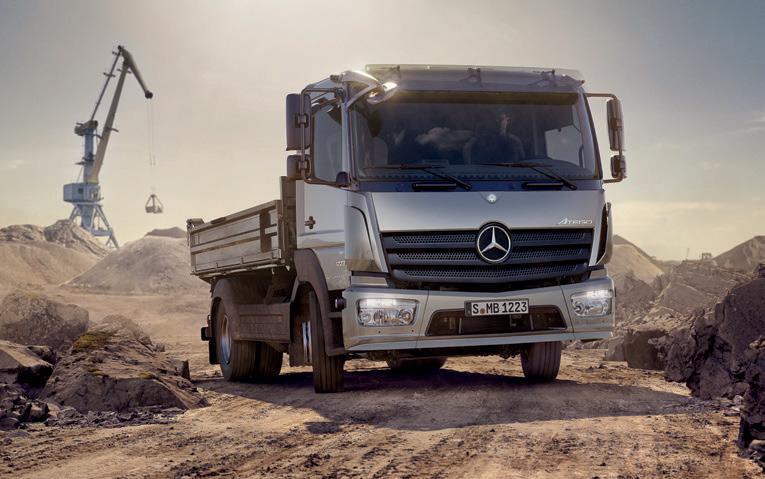
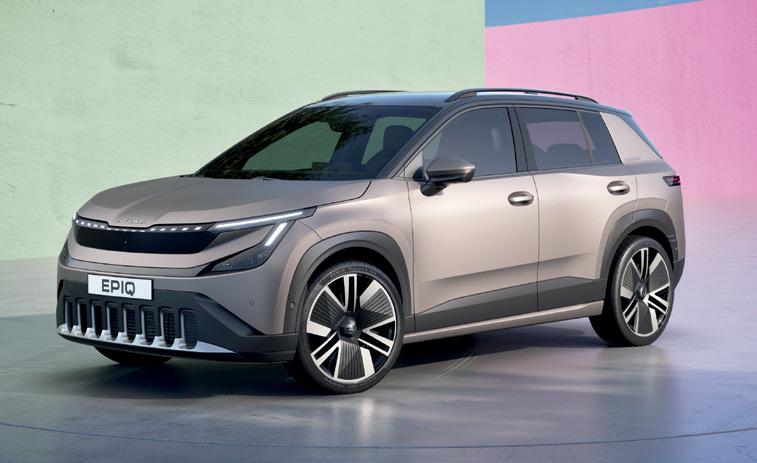
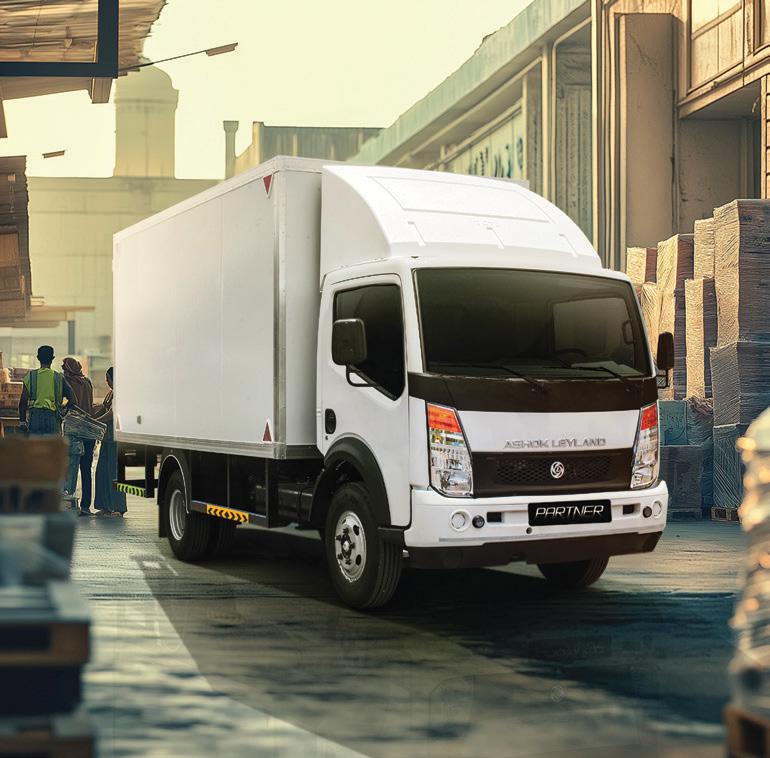
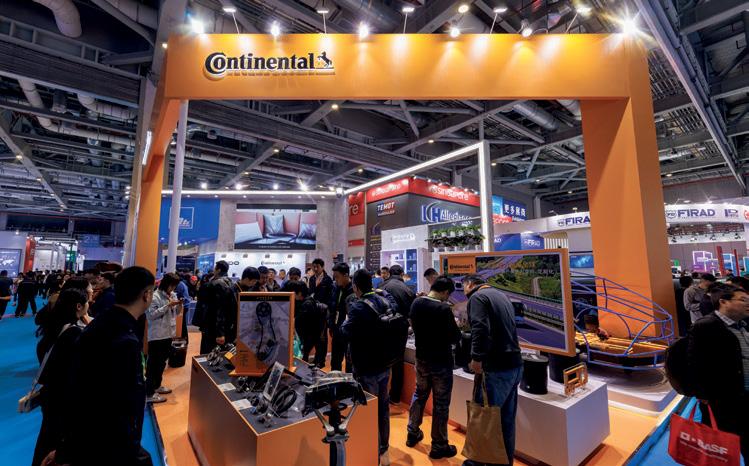

THE MIDDLE EAST AND INDIA’S RELATIONSHIP MATTERS MORE THAN EVER
I was at the Ashok Leyland and FAMCO announcement this month when I was reminded about the historical links between the two countries they represent. On the shores of Dubai’s Creek you can still see dhows being built and repaired. It was a slightly incongruous sight from the ultra modern, marbled atriums of the Intercontinental Hotel but it was also a reminder of the legacy those boats have in continuing the special links between the region and the Indian subcontinent. Generations of sailors have set sail from the ports following the coastal route between the two continents and continue even today.
The fortunes and history of the Middle East and India have been linked for hundreds of years and continues to be one of the major foundations of the region as it builds its future.
For centuries, Indian businesses have looked to the Gulf as a natural extension of their markets. Today, those relationships are evolving into strategic partnerships that combine local knowledge with global scale. Ashok Leyland — India’s largest truck manufacturer and the world’s fourth-largest bus maker — is a prime example of this trajectory. From Chennai to Doha, its journey underscores how Indian innovation is finding resonance in the Gulf’s fast-changing mobility landscape.
Ashok Leyland’s phased market entry — buses first, then light commercial vehicles, and finally trucks — shows a thoughtful approach rooted in understanding operator needs, not
simply chasing numbers. That customer-first ethos is mirrored by Al-Futtaim, which has already proven its ability to build a strong presence for the brand in Saudi Arabia.
This matters because service, not just sales, will determine who wins in the Gulf’s increasingly competitive fleet sector. Chinese OEMs are entering aggressively, European and Japanese brands continue to dominate, and governments are driving a sustainability agenda that will soon extend to electrification and alternative fuels. Against this backdrop, the India–Middle East connection brings something unique: a blend of affordability, durability, and service-centric thinking that speaks directly to the needs of operators balancing tight margins with high expectations. For Ashok Leyland, the partnership is an extension of a 78-year legacy in commercial vehicles and a signal of its global ambitions. For Al-Futtaim, it is part of a wider regional strategy to become the most comprehensive commercial vehicle partner in the Middle East. And for Qatar’s fleets, it promises not just access to new vehicles, but to a partner invested in long-term service and support.
The India–Middle East relationship is no longer about simple market access. It is about alignment — of values, of strategy, and of vision. Whether in Saudi Arabia, the UAE, or now Qatar, Indian manufacturers and Gulf distributors are showing how collaboration can unlock growth, resilience, and innovation. That, ultimately, is the road ahead.
STEPHEN WHITE HEAD OF CONTENT, MOBILITY & CAPITAL ASSETS

STEPHEN.WHITE@CPITRADEMEDIA.COM
GROUP
MANAGING DIRECTOR RAZ ISLAM raz.islam@cpitrademedia.com
+971 4 375 5471
DIRECTOR OF FINANCE & BUSINESS OPERATIONS
SHIYAS KAREEM shiyas.kareem@cpitrademedia.com +971 4 375 5474
PUBLISHING DIRECTOR ANDY PITOIS andy.pitois@cpitrademedia.com +971 4 375 5473
EDITORIAL
HEAD OF CONTENT, MOBILITY & CAPITAL ASSETS
STEPHEN WHITE stephen.white@cpitrademedia.com +971 58 584 5818
ADVERTISING
SALES MANAGER BRIAN FERNANDES brian.fernandes@cpitrademedia.com +971 4 375 5479
STUDIO
ART DIRECTOR SIMON COBON simon.cobon@cpitrademedia.com
DESIGNER PERCIVAL MANALAYSAY percival.manalaysay@cpitrademedia.com
PHOTOGRAPHER MAKSYM PORIECHKIN maksym.poriechkin@cpitrademedia.com
CIRCULATION & PRODUCTION
DIRECTOR OF MARKETING & MEDIA OPERATIONS
PHINSON MATHEW GEORGE phinson.george@cpitrademedia.com
PRODUCTION & IT SPECIALIST JARRIS PEDROSO jarris.pedroso@cpitrademedia.com
MARKETING
MARKETING & EVENTS EXECUTIVE LAKSHMY MANOJ lakshmy.manoj@cpitrademedia.com
SOCIAL MEDIA EXECUTIVE FRANZIL DIAS franzil.dias@cpitrademedia.com
WEB DEVELOPMENT
SENIOR DIGITAL MANAGER ABDUL BAEIS abdul.baeis@cpitrademedia.com
WEB DEVELOPER UMAIR KHAN umair.khan@cpitrademedia.com
FINANCE
CREDIT CONTROL EXECUTIVE CAMERON CARDOZO cameron.cardozo@cpitrademedia.com +971 4 375 5499
FOUNDER DOMINIC DE SOUSA (1959-2015)
The publisher of this magazine has made every effort to ensure the content is accurate on the date of publication. The opinions and views expressed in the articles do not necessarily reflect the publisher and editor. The published material, adverts, editorials and all other content are published
CPI Trade Media. PO Box 13700, Dubai, UAE. +971 4 375 5470 cpitrademedia.com © Copyright
Built to last
features – engineered with purpose to excel in the most
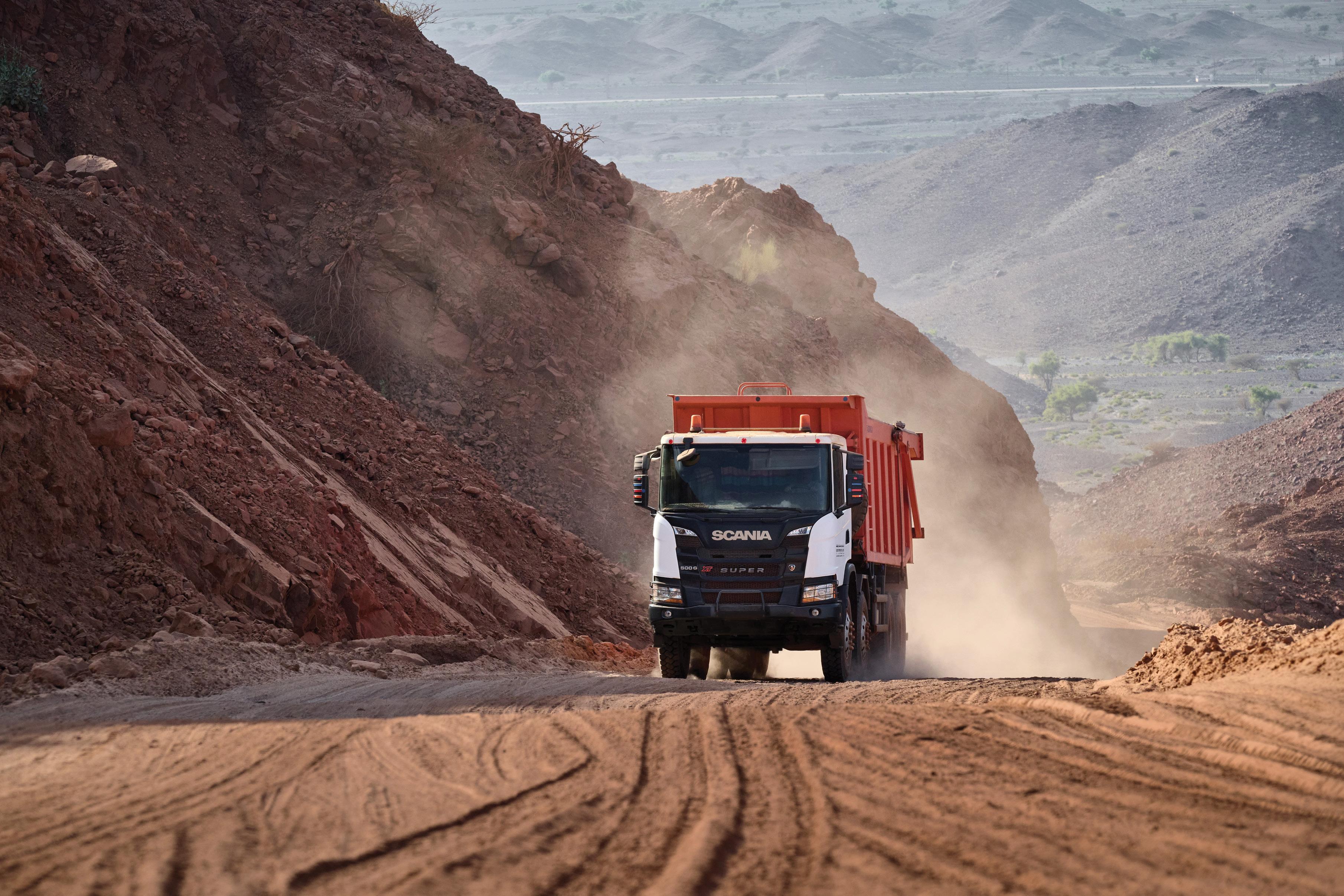


FLEET
MG Motor claims MG 8 PHEV has record-breaking 1,650 km range
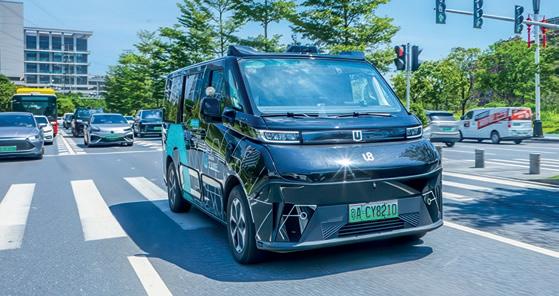
FLEET
World’s first commercial autonomous point-to-point taxi service launches
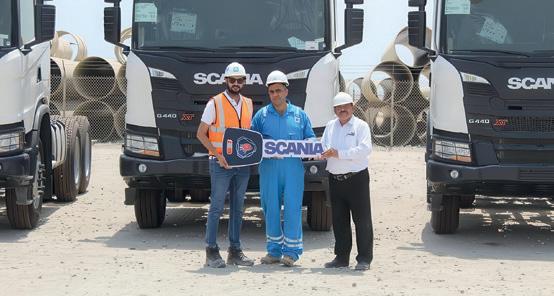
FLEET
GCC Olayan delivers new Scania 6×4 tractor head fleet to ROLL Group in KSA
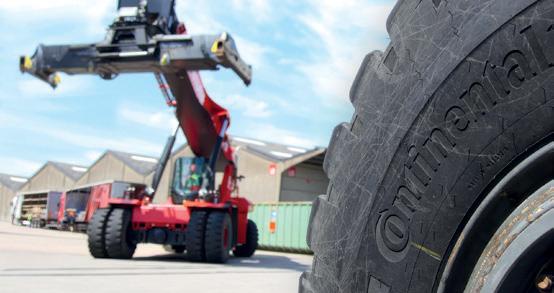
LOGISTICS
Continental receives Kalmar supplier award for sustainability

FLEET
Dubai Tourism Police welcomes new Audi RS7 Performance and Audi R8

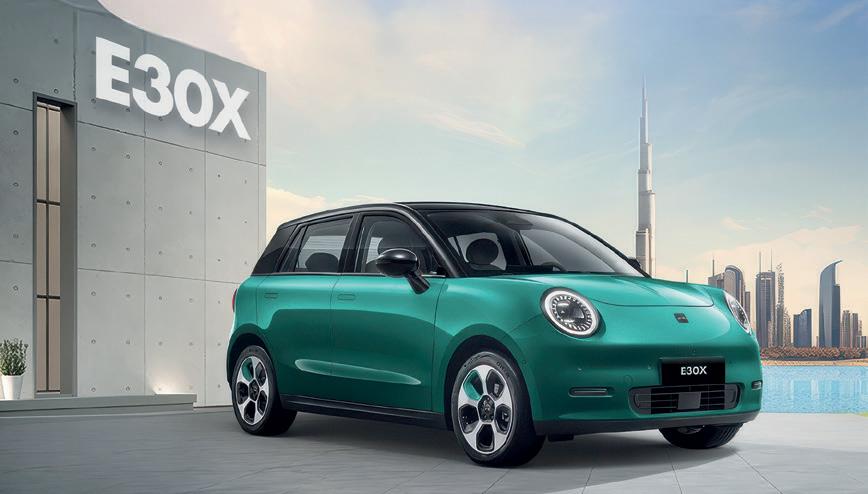
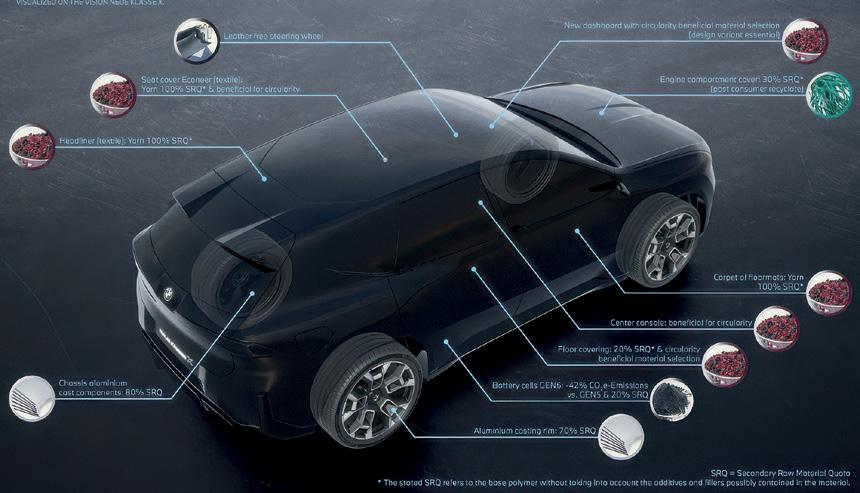
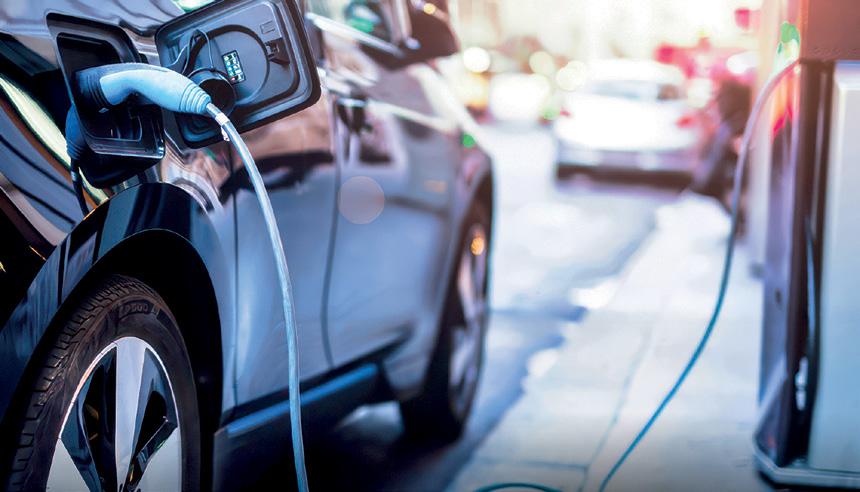
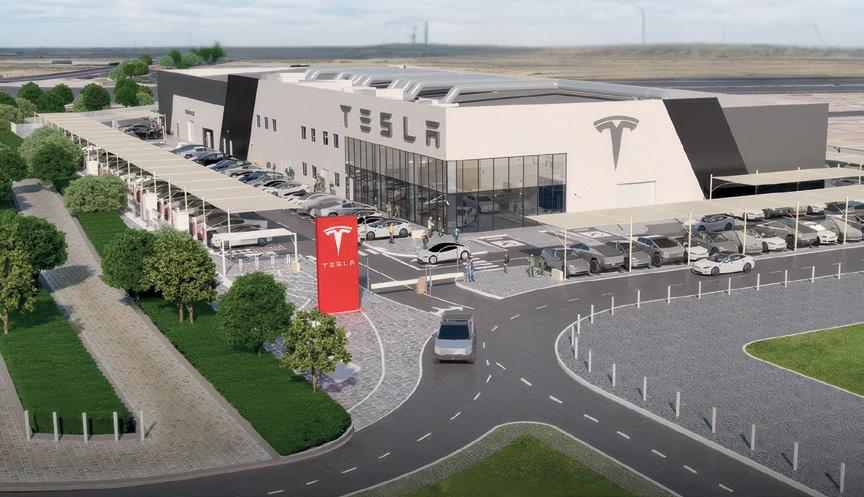
FLEET
NIO Hub opens in Dubai
The 772-square-meter facility includes a 433-square-meter showroom and a 339-square-meter delivery center
FLEET
EVs are a growing reality in the UAE, says Al Habtoor Motors’ CEO as it launches flexible leasing offer for JAC EV
The JAC E30X delivers on a promise of both performance and practicality, says Ahmed Al Habtoor
SUSTAINABILITY
BMW enters a Neue Klasse of green manufacturing
German giant's new iX3 outperforms a comparable internal combustion engine (ICE) BMW model after just 21,500 km
ELECTRIFICATION
How ADNOC Distribution is expanding its E2GO EV charging network across the UAE
The E2GO network is part of ADNOC Distribution’s broader fiveyear strategic growth plan
FLEET
Aldar to build UAE’s First Tesla Experience Centre on Yas Island
Spanning more than 5,000 sqm of leasable area, the centre is designed to deliver a seamless customer journey - and yes there is charging
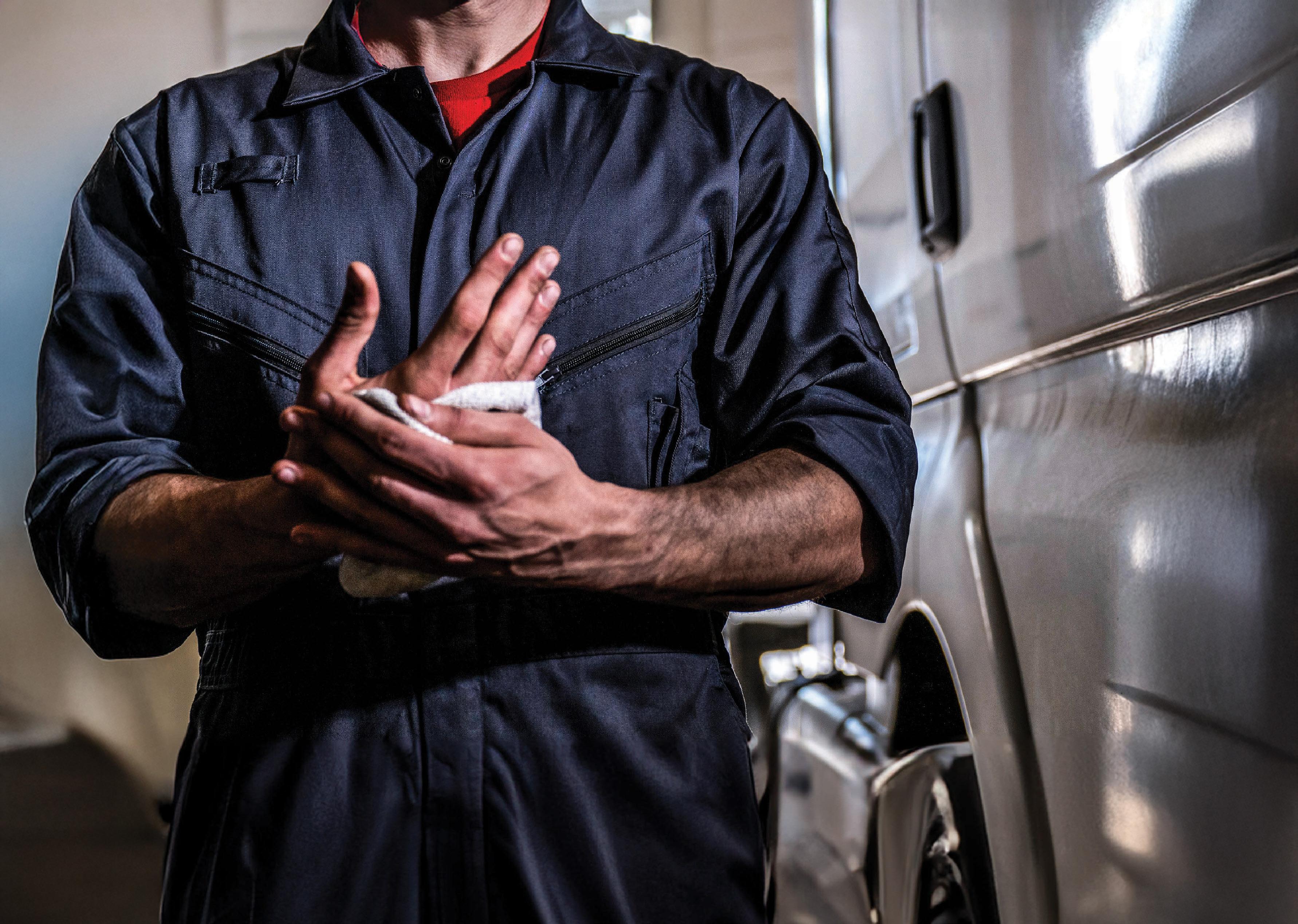

ADNOC Distribution looks to accelerate KSA expansion
ADNOC DISTRIBUTION HAS ANNOUNCED ITS LATEST SET OF ROBUST FINANCIAL AND OPERATIONAL RESULTS FOR THE FIRST HALF OF 2025, RECORDING A 12.2% YEAR-ONYEAR RISE IN NET PROFIT TO $358 MILLION AND THE HIGHEST-EVER H1 EBITDA OF $566
FLEET
The UAE’s largest fuel and convenience retailer also reported a 5.6% increase in fuel volumes to 7.62 billion litres – its bestever H1 performance – as it continues to deliver on its five-year growth strategy through 2028.
“Our strong H1 2025 results demonstrate the successful execution of our 2024-28 growth strategy, driven by operational excellence and customer-focused innovation,” said Bader Saeed Al Lamki, CEO of ADNOC Distribution.
The company’s non-fuel retail business, which includes
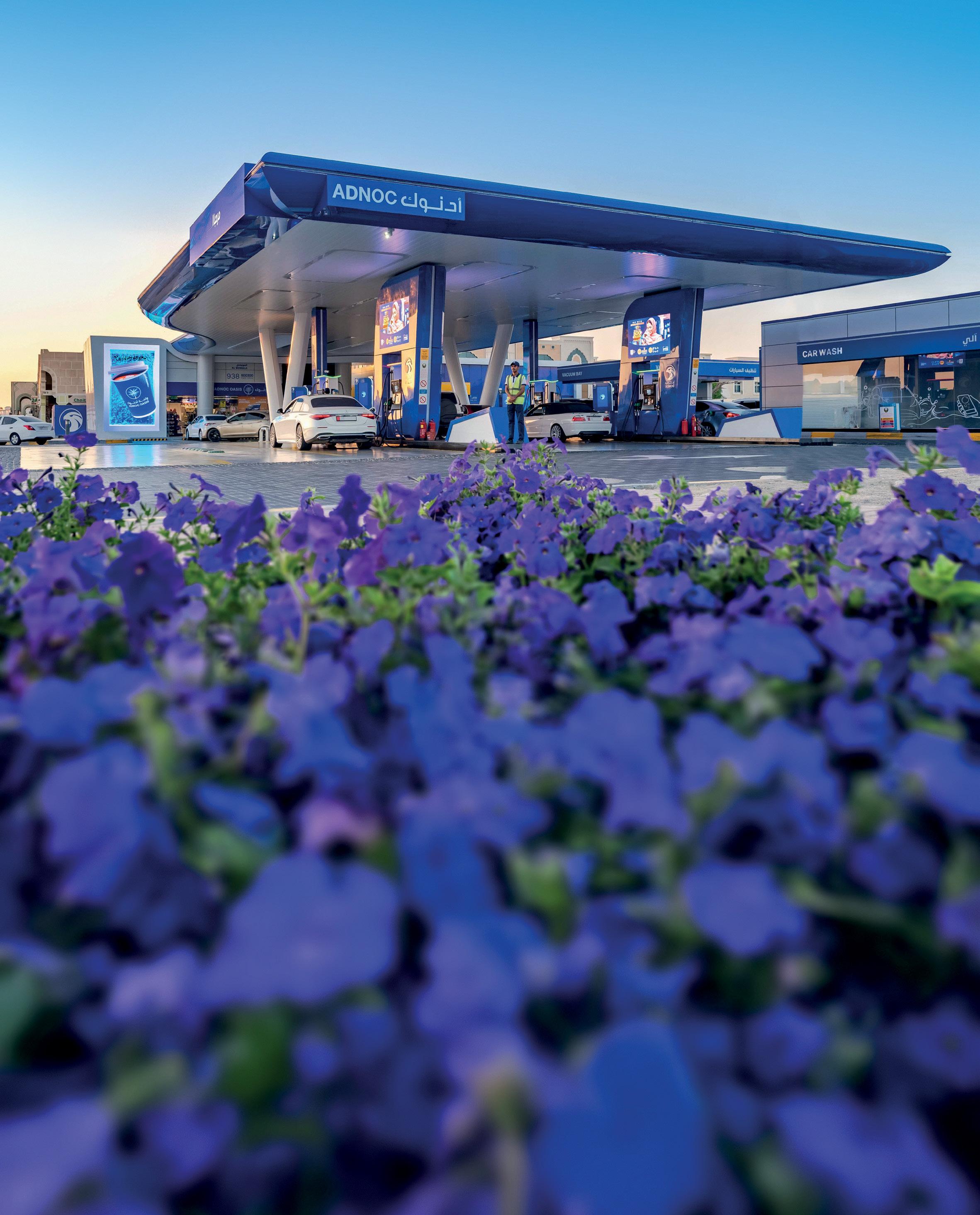
convenience stores, car services, property management and lubricants, also posted a strong H1, with gross profit growing 14.9% year-on-year. Transactions rose 10.4%, while its ADNOC Rewards loyalty programme reached nearly 2.5 million users, up 19.5% year-on-year.
In terms of fuel retail, ADNOC Distribution’s strategic focus on Saudi Arabia continues to pay off.
Of the 47 new stations opened in H1 2025, most were located in the Kingdom, where the company has doubled its network in the past year to 140 locations. As a result, the company has revised its
2025 expansion target to 60–70 new stations – up from previous guidance – with 50–60 planned in Saudi Arabia. In May, it introduced its ADNOC Voyager lubricant line in Egypt, marking its retail debut in the country. ADNOC aims to reach 3,000 points of sale in Egypt by end-2026, with its lubricants now exported to over 47 countries.
Meanwhile, ADNOC Distribution’s commitment to sustainable mobility has seen its E2GO EV charging network grow to more than 300 locations across the UAE, with plans to install over 100 new charging points this year and reach more
than 500 by 2028. The company continues to embrace digital innovation, leveraging AI to improve operations through tools such as predictive fuel demand modelling and personalised offerings. It also deployed MEERAi, ADNOC’s AI-powered board advisory tool, to support faster, insight-driven decision-making at the executive level. Backed by a resilient business model, ADNOC Distribution reiterated its annual CAPEX commitment of $250–$300 million and reaffirmed its goal to scale both regionally and internationally while unlocking new value from its assets.
BREAKING: THE RTA HAS INTRODUCED NEW REGULATIONS DESIGNED TO IMPROVE THE SAFETY AND SERVICE QUALITY OF TOURIST TRANSPORT

SELFDRIVE MOBILITY LAUNCHES ZEROINTEREST ‘RENT TO OWN’ CAR SERVICE IN THE UAE
CAR RENTAL
The new service allows users to drive a vehicle for as little as one month before deciding whether to switch to full ownership.
SelfDrive Mobility has launched a new ‘Rent to Own’ service in the UAE, offering customers a flexible and transparent pathway to car ownership with no interest, no credit checks, and the ability to purchase their vehicle at any point during the first 12 months of rental. The new service allows users to drive a vehicle for as little as one month before deciding whether to keep renting, return the car, or switch to full ownership. All monthly payments are deducted from the final purchase price, with only the downpayment remaining non-refundable. Designed to reflect the UAE’s increasingly flexible employment landscape and growing demand for alternative car ownership models, SelfDrive’s latest offering includes full insurance, servicing, and maintenance, with all vehicles sourced and maintained through official dealers.
Soham Shah, Founder and CEO of SelfDrive Mobility, said the offering is aimed at providing flexibility to a growing segment of customers who fall outside traditional financing systems.
“More than three million people in the UAE work in freelance or contracted roles, according to recent government employment statistics,” Shah said. “These professionals need transportation solutions tailored to their unique requirements. ‘Rent to own’ provides customer control, clarity, and flexibility, with no hidden surprises.”
truckandfleetme.com
ARAMEX DOMESTIC EXPRESS DELIVERS RESULTS
FLEET
Aramex has reported ‘stable’ group revenues of AED 3.06 billion for the first half of 2025, up 1% yearon-year, as growth in domestic and regional logistics operations offset a sharp decline in its international express business.
In its financial report covering the first half of 2025, the company noted a marked shift in shipment flows during the period, with brands increasingly prioritising proximity to end-consumers.
This “nearshoring” trend has redirected activity from long-haul international routes towards regional and domestic channels, boosting Aramex’s Domestic Express, Logistics, and Freight Forwarding divisions.
Domestic Express revenues rose 13% year-on-year in H1 2025, while Logistics surged 22% and Freight Forwarding grew 8%.
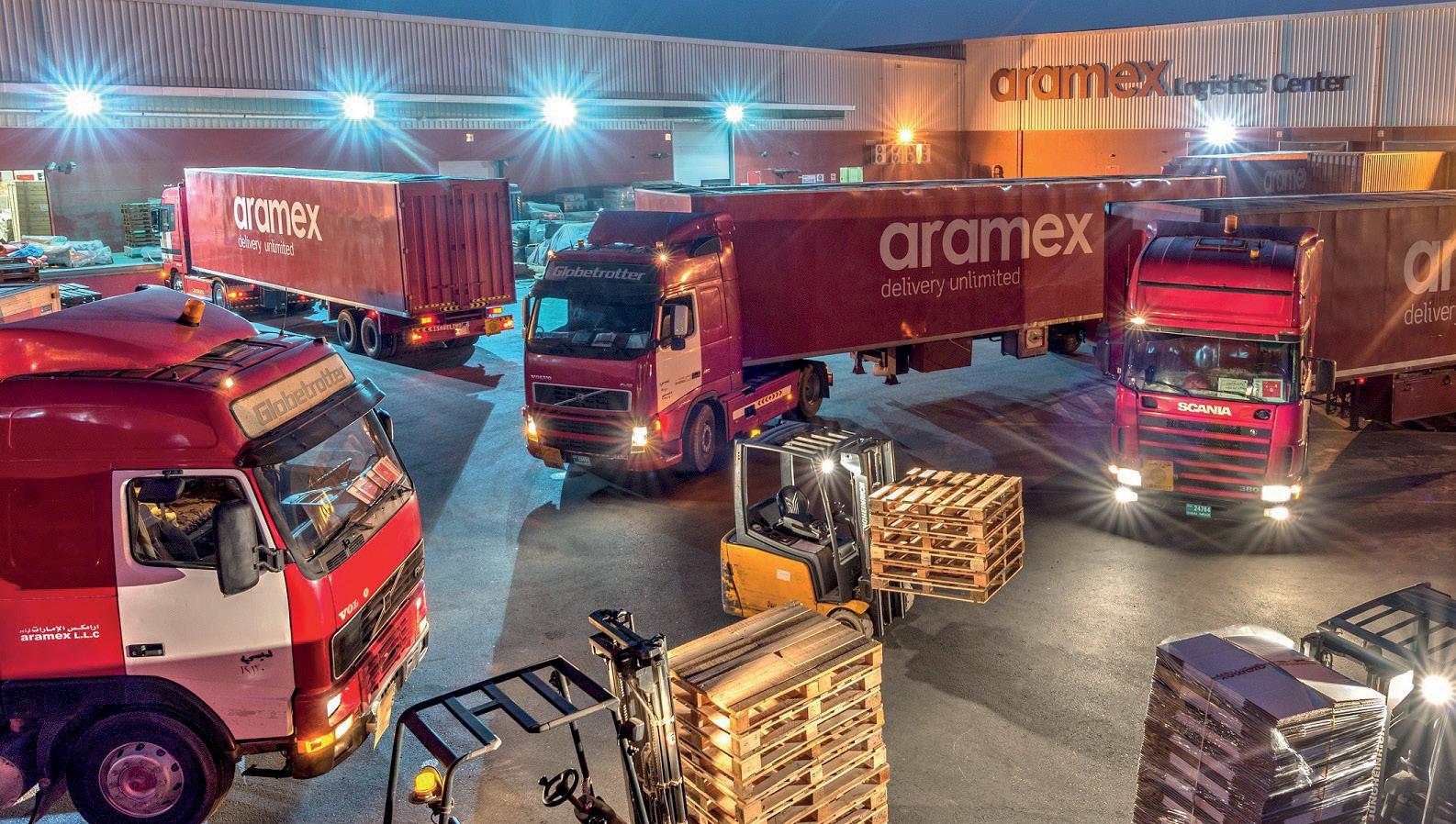
International Express revenues, however, fell 15% in the same period, reducing the segment’s contribution to group profits.
Gross Profit for H1 2025 stood at AED 694 million, down 6% year-on-year, with margins easing to 23% from 24% a year earlier due to the change in product mix, higher capacity costs in growth markets, and persistent market pricing
pressures. One-off expenses of AED 26 million linked to the Q Logistics acquisition, regional restructuring, and transformation programme further weighed on profitability.
Excluding these one-offs, normalised EBIT fell 32% to AED 95 million, while normalised net profit dropped 34% to AED 33 million. Reported net profit for the half was AED 8 million.
CHANGAN SETS SIGHTS ON MIDDLE EAST MARKET
CAR-MAKERS
China ChangAn Automobile Group Co., Ltd. has officially been established in the UAE following the integration of ChangAn Automobile, Chenzhi Group, and ChangAn Auto Finance. The new Group, now solely focused on the automotive industry, brings together a robust ecosystem of vehicle manufacturing, finance, logistics, and aftermarket services under one unified umbrella.
Backed by 41 years of automotive experience and a registered capital of RMB 20 billion (approx. AED 10 billion), the Group reported total assets of RMB 308.7 billion and annual revenues of RMB 340 billion. With a workforce of around 110,000 people and operations spanning 117 subsidiaries and 21 manufacturing bases, China ChangAn is aiming to become a global leader in intelligent and new energy vehicles (NEVs).
As part of its long-term global expansion strategy, the Group is reinforcing its commitment to the Middle East, identifying it as a key strategic market. This includes plans to expand its Dubai Parts Distribution Center, enhancing aftersales support and parts availability across the GCC.
“The establishment of China
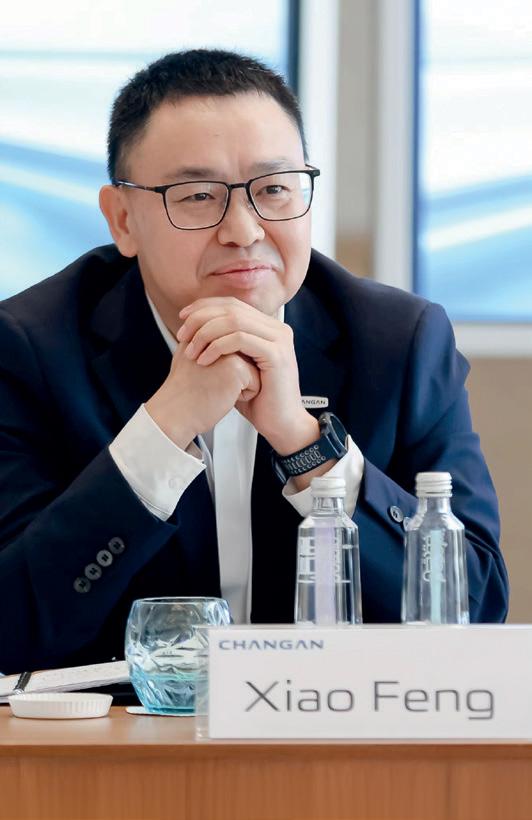
ChangAn Automobile Group marks a bold new chapter in our global journey,” said Xiao Yong, Vice President of the Group. “The Middle East is a strategically important market for us. We are committed to delivering worldclass products and services tailored to local needs.”
Under its “Vast Ocean Plan”, China ChangAn aims to reach 5 million annual vehicle sales by 2030, including 3 million NEVs, with overseas markets contributing 30% of the total. Its global line-up includes models from its AVATR, DEEPAL, and CHANGAN brands, already gaining momentum across international markets. With a stronger focus on innovation and supply chain integration, the new Group is expected to accelerate its delivery of smart, sustainable, and connected mobility solutions for customers in the Middle East and beyond.
DUBAI FIRM COMPLETES ROBOT LOGISTICS HUB
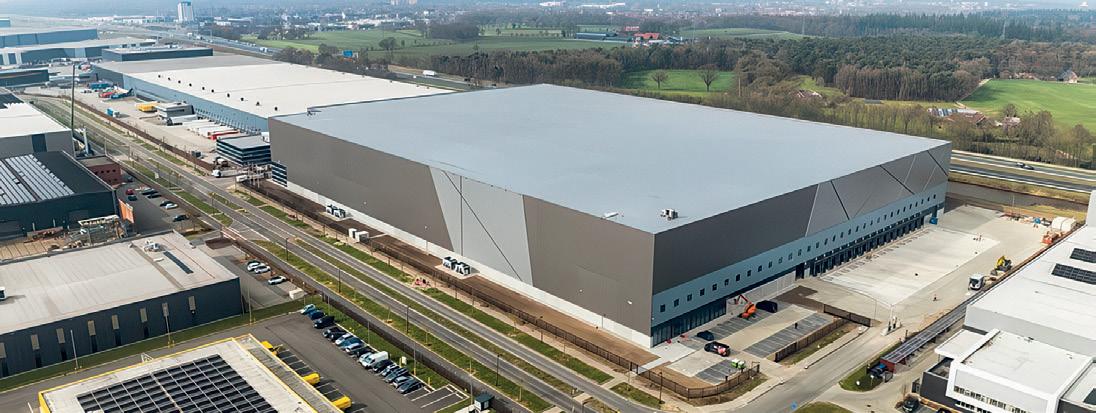
LOGISTICS
Rasmala Investment Bank Limited has announced the successful delivery of a robotics-enabled logistics facility in Almelo, Netherlands, marking a major milestone in the firm’s growing European portfolio.
Constructed over a 15-month period, the custom-built distribution centre has been pre-leased for 15 years to a New York Stock
Exchange-listed outdoor fashion brand. The €38 million project reinforces Rasmala’s position as one of the leading alternative investment managers in the region, with expanding logistics interests across key European trade corridors.
The Almelo facility spans approximately 312,000 square feet, with a 25-metre height profile, and features warehouse,
mezzanine, and office space, supported by 118 parking spaces.
Designed to meet the sophisticated demands of automated logistics, the facility has achieved a BREEAM Very Good certification and will serve as the tenant’s main EMEA distribution hub.
“This is a high-quality asset that benefits from a long-term, inflationprotected lease with a reputable tenant, offering a stable return, coupled with capital preservation,” said Ali Taqi, Deputy CEO of Rasmala. “Delivering bespoke structures has been a key guiding principle of Rasmala for 25 years.”
Located in the XL Business Park in Almelo—a major logistics corridor in the Netherlands.
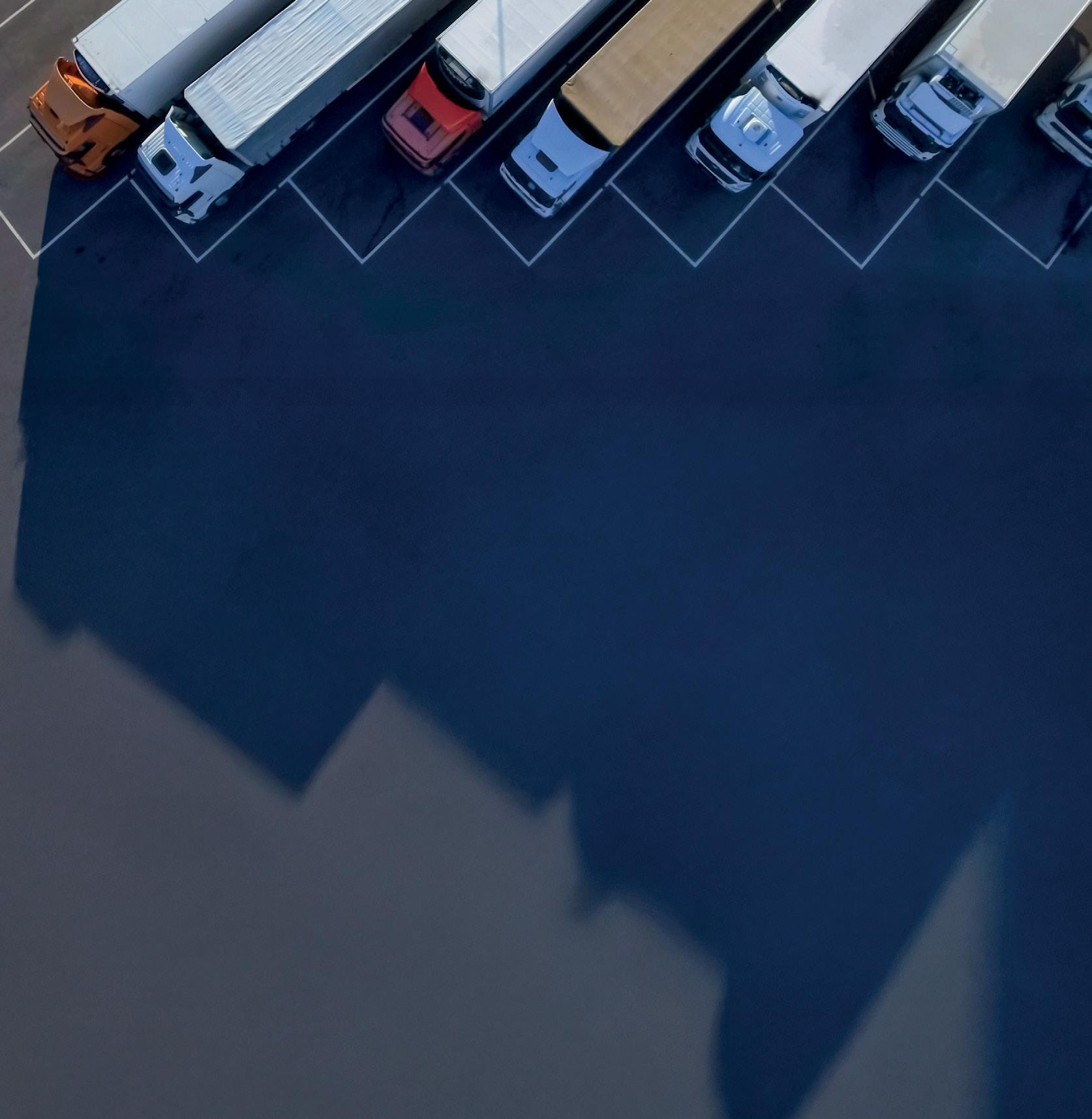
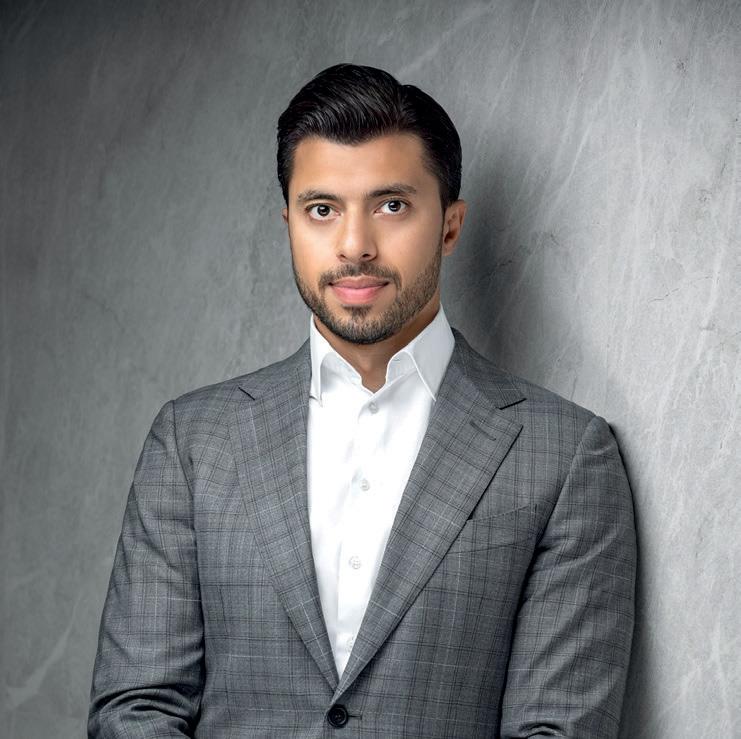
ETIHAD RAIL IS A ONCE-IN-AGENERATION
INFRA SHIFT,
SAYS FÄM
PROPERTIES CEO
LOGISTICS
The Etihad Rail network is set to deliver an economic transformation that will stretch far beyond transport, creating new corridors for living, trade, and investment across the Emirates, according to UAE property expert Firas Al Msaddi, CEO of fäm Properties.
Al Msaddi says the rail network’s full-scale connectivity will reshape the UAE’s economic landscape, cutting travel times, boosting inter-emirate productivity, and driving demand in emerging real estate markets.
KEZAD AND Q MOBILITY TO ESTABLISH A TRUCK-PARKING FACILITY
FLEET
Khalifa Economic Zones Abu Dhabi (KEZAD) Group, an operator of integrated and purpose-built economic zones in the region, and Q Mobility, a subsidiary of ADQ that manages and operates parking and toll solutions in Abu Dhabi, have entered into an agreement to establish a truck-parking facility in ICAD I – KEZAD Mussafah. This initiative aims to enhance the overall parking experience within KEZAD Mussafah. Q Mobility will be responsible for developing and operating the 84,000 sqm truck-parking facility in ICAD I – KEZAD Mussafah. This facility will facilitate efficient and uninterrupted truck movement within the area. Additionally, Q Mobility will manage onstreet parking across ICAD I, II, and III – KEZAD Mussafah, as well as Rahayel Automotive City, to ensure smooth traffic flow within KEZAD’s industrial and commercial zones.
The primary objective of this agreement is to create integrate
parking spaces within KEZAD into the broader Abu Dhabi environment. Q Mobility will provide advanced parking solutions that optimise traffic flow, reducing congestion caused by heavy and light vehicles. The company will also offer options for large fleet owners in KEZAD Mussafah. The agreement envisions the development of relevant valueadded services and amenities within KEZAD to enhance the overall ecosystem and provide superior user experiences.
“When we saw Sheikh Mohammed riding the Etihad Rail from Dubai to Fujairah, that wasn’t just a symbolic moment – it was the announcement of a new real estate era in the UAE,” he said. ““It represented a once-in-a-generation infrastructure shift that will redefine how value is created, captured, and capitalized across the Emirates.
“We’re not just talking about transportation. We’re talking about speed, interconnectivity, and productivity, and how all of that compresses space and time. And when you compress space and time, you reduce opportunity cost. That’s where the real value is unlocked.
“Etihad Rail isn’t just a train, it’s a full-scale economic reset for the UAE. It will shift demand patterns, eliminate bottlenecks, and open up new corridors for living, trade, and investment.”



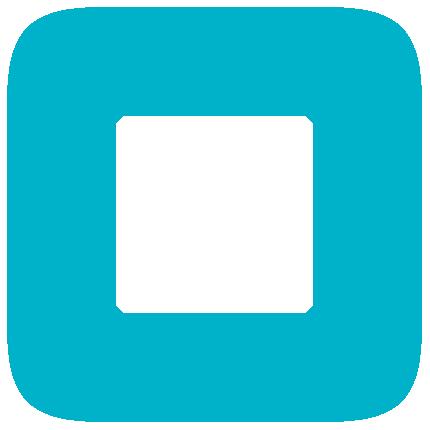
ŠKODA PREVIEWS AFFORDABLE ELECTRIC SUV AT IAA IN GERMANY / OFFICIAL LAUNCH IN THE UAE AND KSA FOR THE JAECOO J5
LAUNCHES
€25,000 LAUNCH PRICE
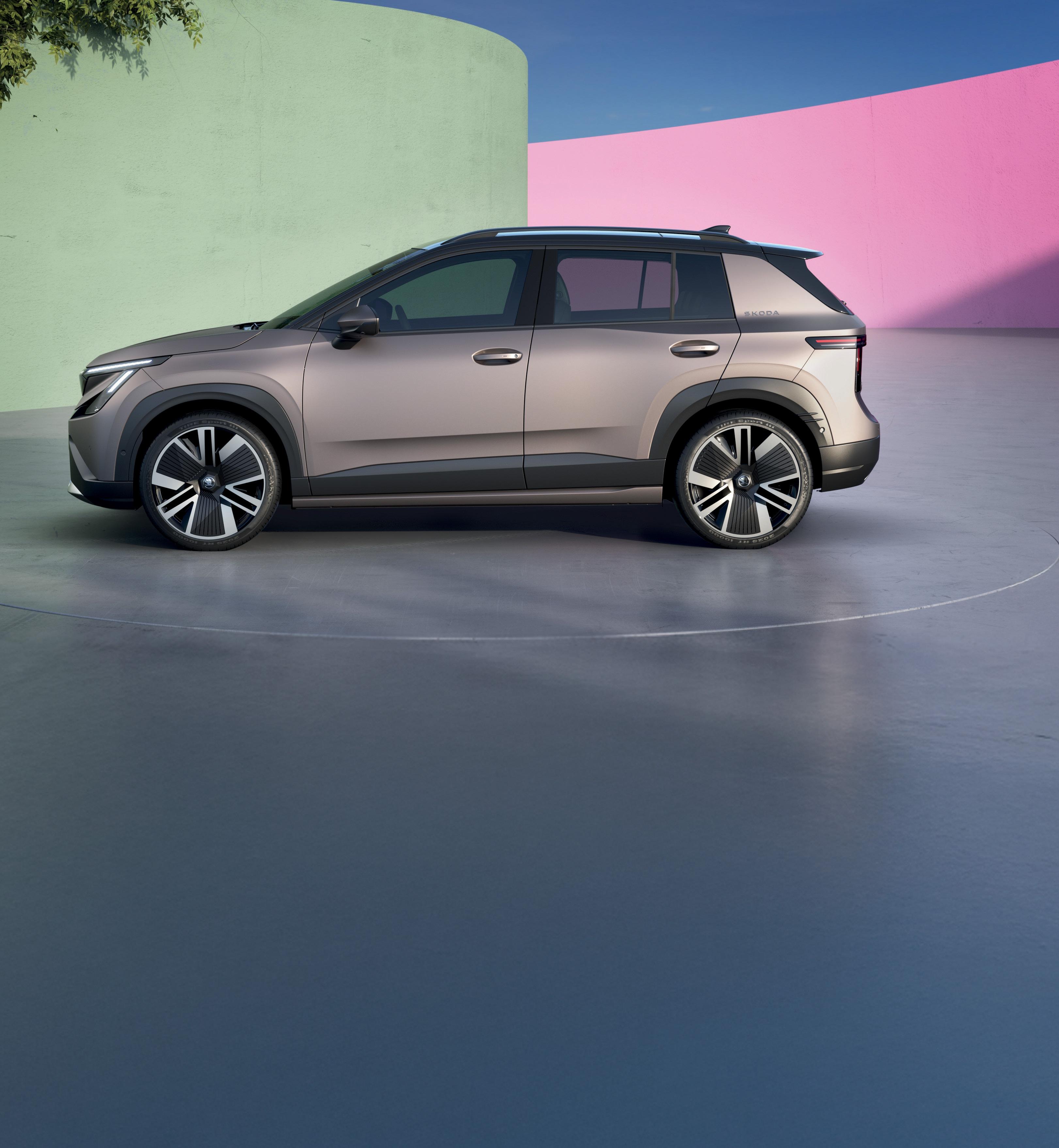
Škoda previews Affordable Electric SUV at IAA
NEW EPIQ IS A GLIMPSE OF ŠKODA’S EPIC JOURNEY INTO AN ELECTRIC FUTURE
Unveiled at the Volkswagen Group media workshop ahead of the IAA in Munich, the Epiq show car represents Škoda’s clearest signal yet of where it sees massmarket electrification heading. The compact SUV will be the first model to fully adopt the brand’s Modern Solid design language, pairing minimalist, robust styling with functional interiors designed for everyday practicality.
“The Epiq show car offers a concrete glimpse into the next addition to Škoda’s successful allelectric family,” said Klaus Zellmer, CEO of Škoda Auto. “It embodies the essence of Škoda: modern solid design, a spacious interior within
a compact footprint, user-friendly, intuitive digital interfaces, and Simply Clever details that ensure a seamless experience – and above all – at an attractive price point.”
Measuring just 4.1 metres in length, the Epiq seats five passengers and offers a surprisingly generous 475-litre boot. A range of up to 425 km makes it viable for daily commutes and longer journeys alike. Crucially, Škoda expects the starting price of the production version to be comparable to the Kamiq, its popular ICE-powered counterpart — positioning the Epiq as the most affordable EV in its growing portfolio.
This focus on affordability, space, and range underscores Škoda’s strategy of making electric vehicles a practical choice for everyday drivers, not just a premium niche.
The exterior styling of the Epiq makes a clear break with tradition. Cashmere matt paintwork is combined with a glossy black Tech-Deck Face, flanked by T-shaped LED running lights. Strong shoulders and a sharp tornado line visually divide the glass cabin from the body, creating a confident stance.
Inside, the focus is on functionality and digital integration. The minimalist cabin
includes wireless charging, haptic scroll wheels, physical buttons for essential functions, and generous hidden storage. In line with Škoda’s ‘Mobile First’ approach, usability comes ahead of excess ornamentation, appealing to families and lifestyle-focused customers alike. The production version of the Epiq will roll off the line at the Volkswagen Navarra plant in Spain, forming part of the Volkswagen Brand Group Core’s Electric Urban Car Family (EUCF). This initiative, spanning Škoda and its sister brands, aims to democratise EV ownership by delivering four affordable electric

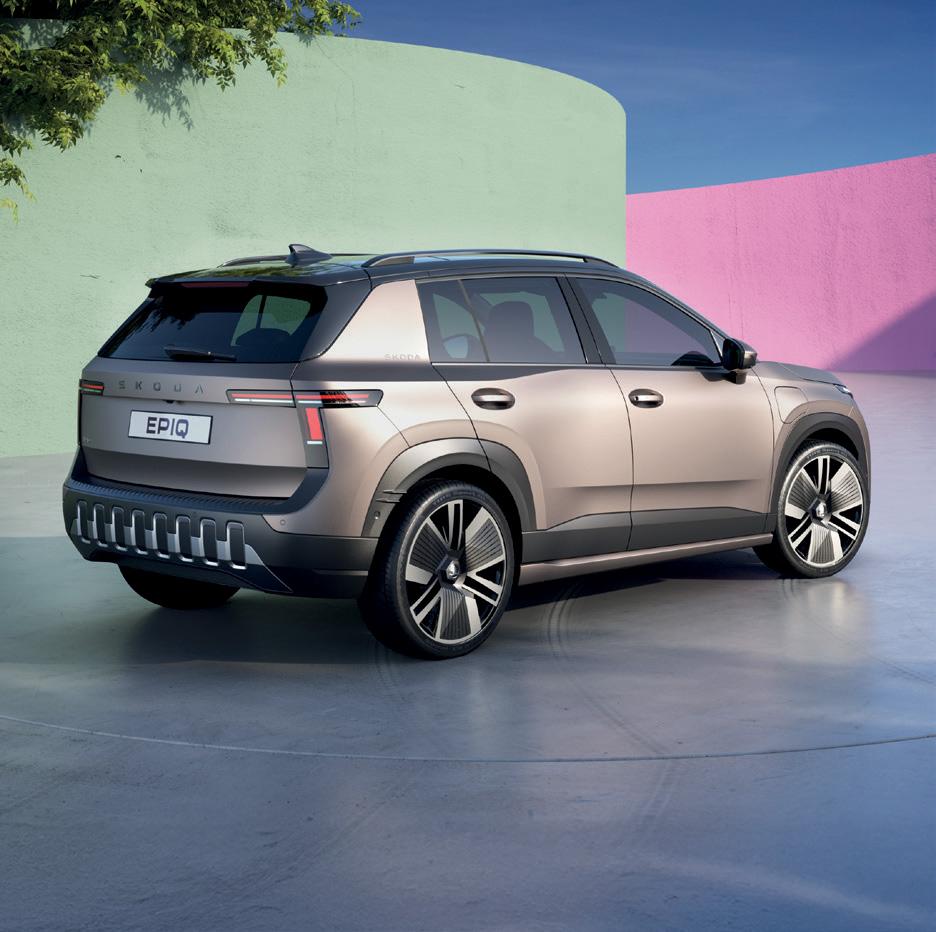

JAECOO J5 MAKES ‘EXPLOSIVE’ MIDDLE EAST DEBUT
OMODA&JAECOO ENTER THE HYBRID VEHICLE MARKET IN THE UAE WITH THE HIGHLY ANTICIPATED ARRIVAL OF THE JAECOO J7 SHS
(SUPER HYBRID SYSTEM)
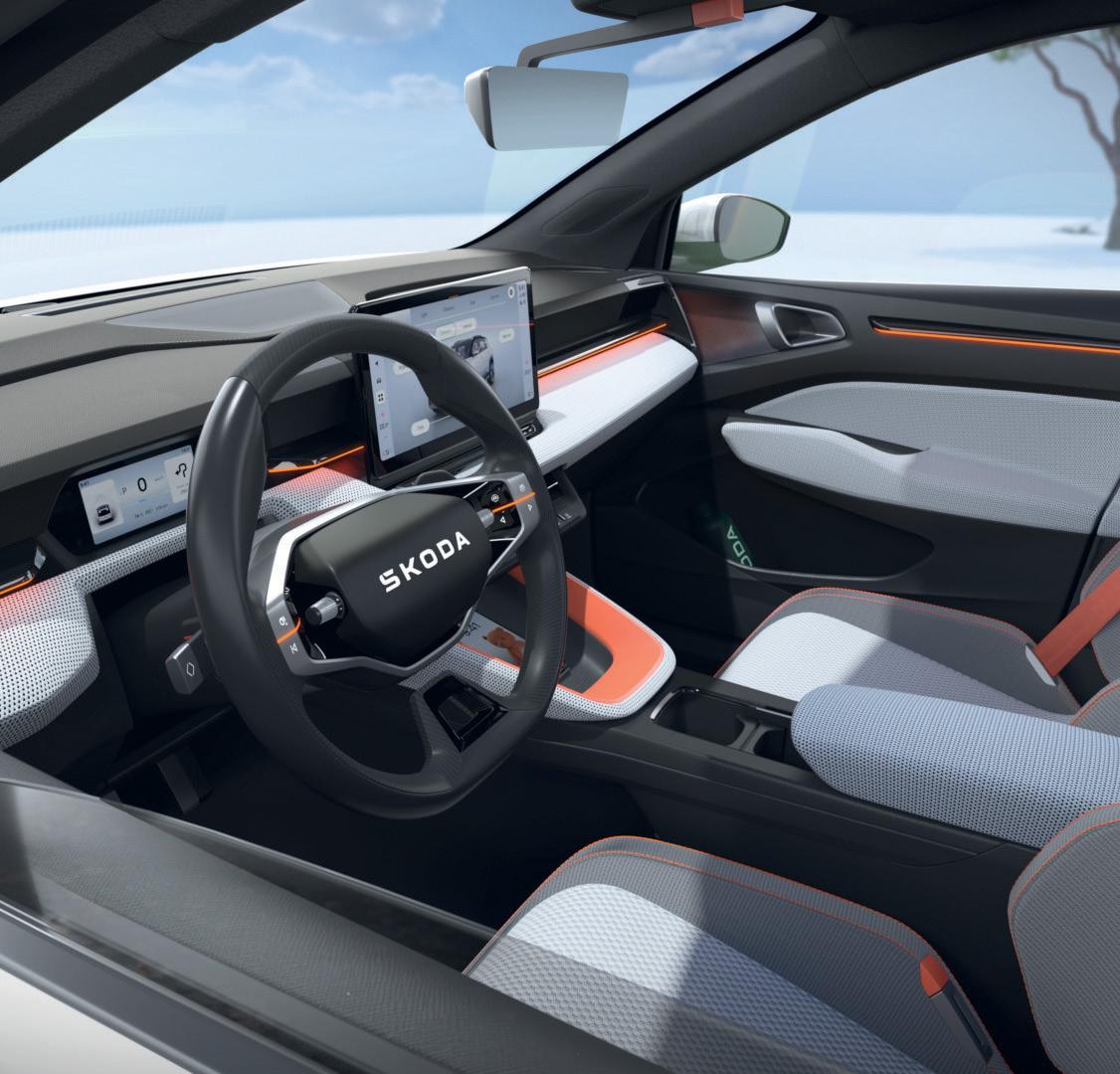
The
models in the coming years.
For Škoda, the Epiq represents a critical step in its electrification roadmap. Scheduled for its world premiere in mid-2026, it promises to offer the combination of practicality, innovation, and value that has defined the brand since its earliest models. By delivering a small
SPECIFICATIONS
SCHEDULED FOR 2026
SUV that balances space, range, and affordability, Škoda is positioning the Epiq as the EV that could bring a new wave of drivers into electric mobility.
For cost-conscious buyers — and for fleets looking at practical, versatile EV options — the Epiq may well be the model that makes the difference.
Powertrain Front-mounted electric motor
Power 155 kW/208 hp
Seating 5 pax
Boot Capacity 475–490l
Range Up to 425 km (264 miles)
Charging Up to ~150 kW fast charging; bi-directional
OMODA&JAECOO has made a highimpact entry into the Middle East SUV market with the regional debut of its allnew light off-road SUV, the JAECOO J5, at a high-energy “JAECOO DAY” launch event in Riyadh on 9 August. A second UAE launch followed later in the month,
The unveiling, described as ‘explosive’ by OMODA&JAECOO, marks the start of a coordinated multi-country rollout across Saudi Arabia, Kuwait, Qatar, and the UAE.
The Riyadh event, held under the theme “GO DISCOVER”, featured a surprise appearance by acclaimed singer and theatre director Bader Alshuaibi, named as JAECOO’s regional brand ambassador. Alongside the J5, the brand also presented the larger JAECOO J8 and previewed its Super Hybrid System (SHS), underscoring a commitment to intelligent, eco-conscious driving.
The JAECOO J5 is positioned as a stylish yet capable SUV for urban explorers and weekend adventurers. Standout features include a 540° panoramic camera, three intelligent ARDIS driving modes, an independent suspension system, karaoke mode, and even a rooftop camping setup.
Though built for the city, the J5
wears its adventure-ready identity proudly. An available Eco Kit adds sporty cladding and additional off-roadinspired detailing, while preserving urban comfort and driveability.
The UAE edition features configurations tailored to local driving conditions, climate, and customer preferences.
Powering the UAE-spec J5 is a 1.5-litre turbocharged engine paired with a front-wheel-drive system — ideal for smooth daily commuting, coastal weekend drives, and urban errand runs. The powertrain is tuned for efficiency and responsiveness, well-suited to the region’s roads and lifestyle. Inside, the JAECOO J5 continues to impress. Its clean, minimalist cabin features a digital dashboard, electronic column shifter, and a striking 1.45m2 panoramic sunroof that floods the interior with natural light.
SPECIFICATIONS
Engine 1.5-liter petrol
Transmission CVT
Towing Capacity 1,250kg
Seating 5 pax 1.45M2
PANORAMIC SUNROOF

Škoda Epiq is an upcoming electric subcompact crossover SUV that will be produced by Škoda Auto. It is set to enter production in 2026.
EPIQ SCOPE BUT NOT EPIC SIZE
At just 4.1 metres long, the Epiq offers spacious seating for five and 475 litres of luggage space, perfect for city drives and weekend getaways.
A NIO
WAY TO DRIVE?
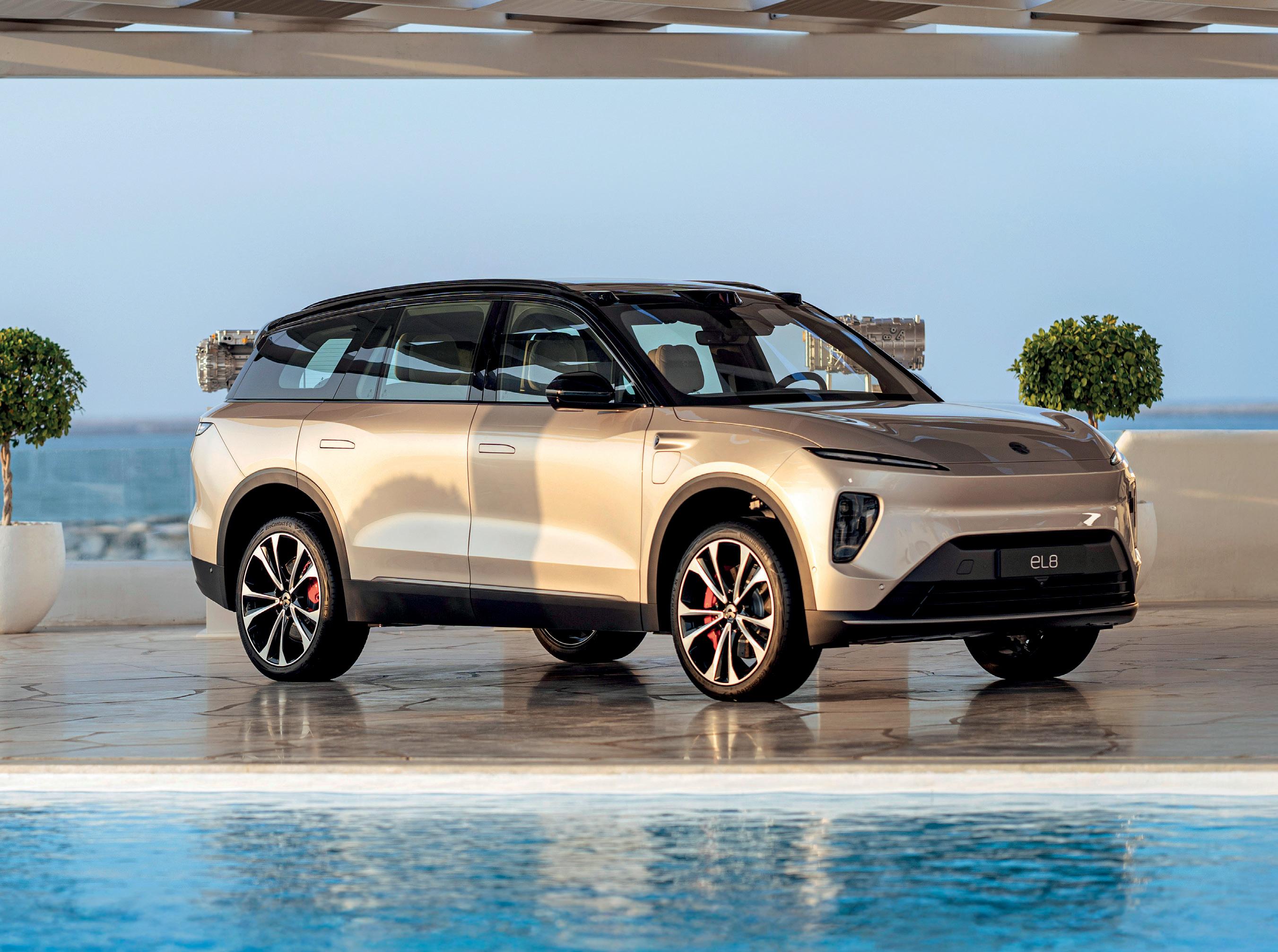
T&FME test drives the NIO EL8 to Abu Dhabi and a truly new way to re-charge your car
When I slipped behind the wheel of NIO’s EL8 SUV at Dubai’s Autodrome, I knew I wasn’t just test driving another electric car — I was experiencing a different way of thinking about mobility. NIO has built its reputation not only on performance but on reimagining how drivers interact with their vehicles, and the result is something that feels genuinely new in the UAE market.
As I set off for the battery swao station over an hour away at Yas Marina Circuit, I was immediately impressed by a cabin that was sleek and uncluttered, a blend of minimalist design and digital intelligence that
felt both premium and intuitive. It reminded me of the Exeed we reviewed earlier in the year and, like that Chinese-built car, on the move, the performance was immediate. Acceleration was strong yet controlled, and the ride quality impressed as I mixed with the usual rabble on the way to the Capital.
What truly set the experience apart, however, was not just the drive but what happened when the battery ran low. Instead of hunting for a charging point and waiting around, I drove into one of NIO’s battery swap stations. Within minutes, the depleted pack was removed and replaced with a fully charged unit. The whole process took less time than filling a fuel tank.
NIO are leaning heavily into the idea that the swap can be as little as three minutes. If
NIO’s commitment to the UAE is more than symbolic”
you’re on what their VIP list, you’re in and out faster than a trip to a filling station.
That claim isn’t just marketing. Sitting in the EL8 as AI-driven cameras and robots set about swapping the battery beneath me was a surreal but reassuring experience. Every swap includes a safety inspection of the undercarriage, and if anything looks wrong, the process won’t proceed. It’s fast, it’s safe, and it’s backed by more than 75 million swaps globally.
For fleets and frequent drivers, this is where NIO’s vision could really shine. Car owners and fleet operators don’t want chargers — they want uptime. The swap stations deliver precisely that, offering consistency, safety checks, and a battery that always performs like new.
On the road, the SUV held its own against



NIO are leaning heavily into the idea that the swap can be as little as three minutes. If you’re on what their VIP list, you’re in and out faster than a trip to a filling station.
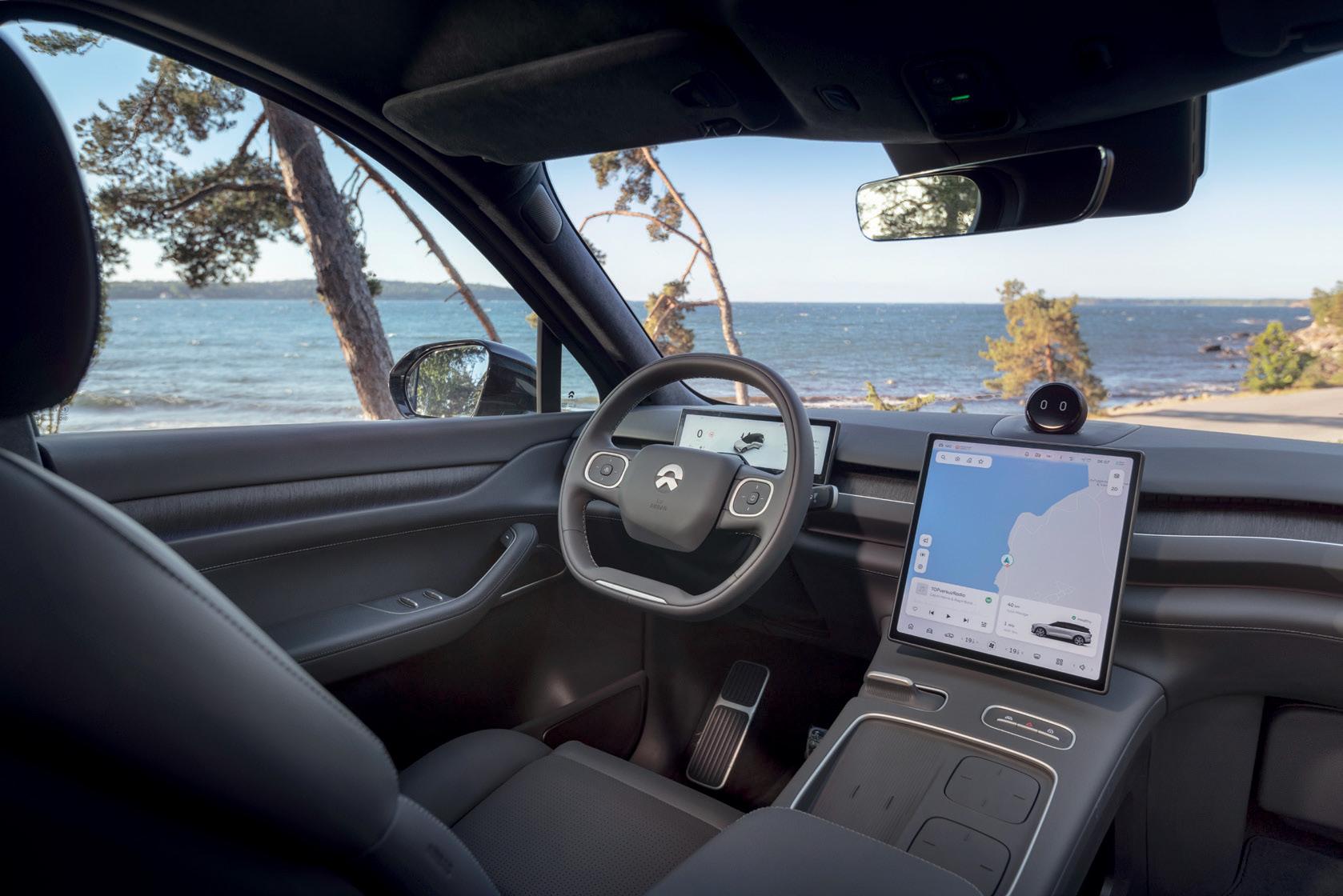
rivals such as the Audi e-tron and BMW iX — benchmarks that NIO openly compares itself with. The handling was sharp, the power plentiful, and the comfort level reassuringly premium. Is it top-of-the-line? No. But the quiet efficiency of the powertrain and the confidence of knowing I wouldn’t have to think twice about range that gave this test drive its edge. While performance isn’t the absolute cutting edge, it is NIO’s unique technology which feels ahead of the curve. Every swap station is AI-enabled, scanning the vehicle, checking undercarriages for damage, and ensuring safety before a battery is released. It’s not just fast — it’s smarter and safer than conventional refuelling.
The car itself was impressive, but what stood out most was the infrastructure being
built around it. NIO’s commitment to the UAE is more than symbolic. Abu Dhabi’s swap station is only the first step toward a network designed to make cross-border EV travel possible across the GCC. As Mohammed Maktari, CEO of NIO MENA, told me earlier in the summer, “We want to be able to say: you can drive from Dubai to Jeddah, or Beirut, and not worry. Just swap your battery along the way.”
At Yas, I was able to see this in action. The car ably reversed itself into the garage-like charging bay. As the car readied itself for the replacement, NIO’s technician told me that many drivers prefer to pay the 130-odd dirhams it costs to fully replace the battery than charge at home. I wonder if that would be the case, months done the line and the novelty has worn
off. And besides, while the cost and experience is mind-blowing, is it really convenient to drive all the way to Yas and navigate through track complex to get that battery replaced?
However, it is striking how well the car feels adapted for the Gulf. NIO sent a full engineering team a year in advance to test vehicles in UAE summers, fine-tuning the battery cooling and thermal systems. The result is a car that shrugs off 45°C heat without breaking stride. The EL8 even features a desert driving mode. I promised not to try it in the dunes so I will have to wait to see if it can master dune-bashing with the kind of composure you wouldn’t expect from an EV of this size.
That said, scroll through YouTube and you can see how the desert sand mode — tuned specifically for GCC conditions — works, and it shows just how much effort NIO’s engineers have put into testing for the region’s extremes. This isn’t a European EV parachuted into a foreign market; it feels like a machine designed with the UAE in mind.
Driving the NIO was a reminder that EVs are no longer about compromise but only when you have a workable and practical access to charging. When you do, they’re about rethinking what is possible when performance, convenience, and innovation align. The SUV itself ticked all the premium boxes — comfort, performance, technology — but the real story was the infrastructure backing it up.
The EL8 shows that premium Chinese EVs are no longer playing catch-up. In comfort, capability, and tech, it competes directly with the best from Europe. Add in the battery swapping infrastructure, and NIO’s approach feels both disruptive and distinctly practical for a region that values speed and convenience. After my test drive, one thought stuck with me: once you’ve experienced an EV with this kind of ecosystem, it’s hard to imagine going back.
Verdict
In comfort, capability, and tech, it competes directly with the best from Europe”
The EL8 is NIO’s flagship SUV, and it makes a strong first impression. On the move, it feels every bit as premium as its German rivals. The cabin is minimalist but inviting, blending soft-touch materials with intuitive digital controls. Ride quality is excellent, even across uneven stretches of road, while acceleration is instant and confidence-inspiring. If – and it is a big if – swapping stations scale across the GCC, operators could keep vehicles running almost around the clock. Unlike superchargers, which require expensive substations and heavy grid demand, swap stations charge batteries off-peak and recycle them through the day.
WITH THE UAE IN MIND
The EL8 doesn’t feel like a European EV parachuted into a foreign market; it feels like a machine designed with the UAE in mind.
RAPID REPLACEMENT
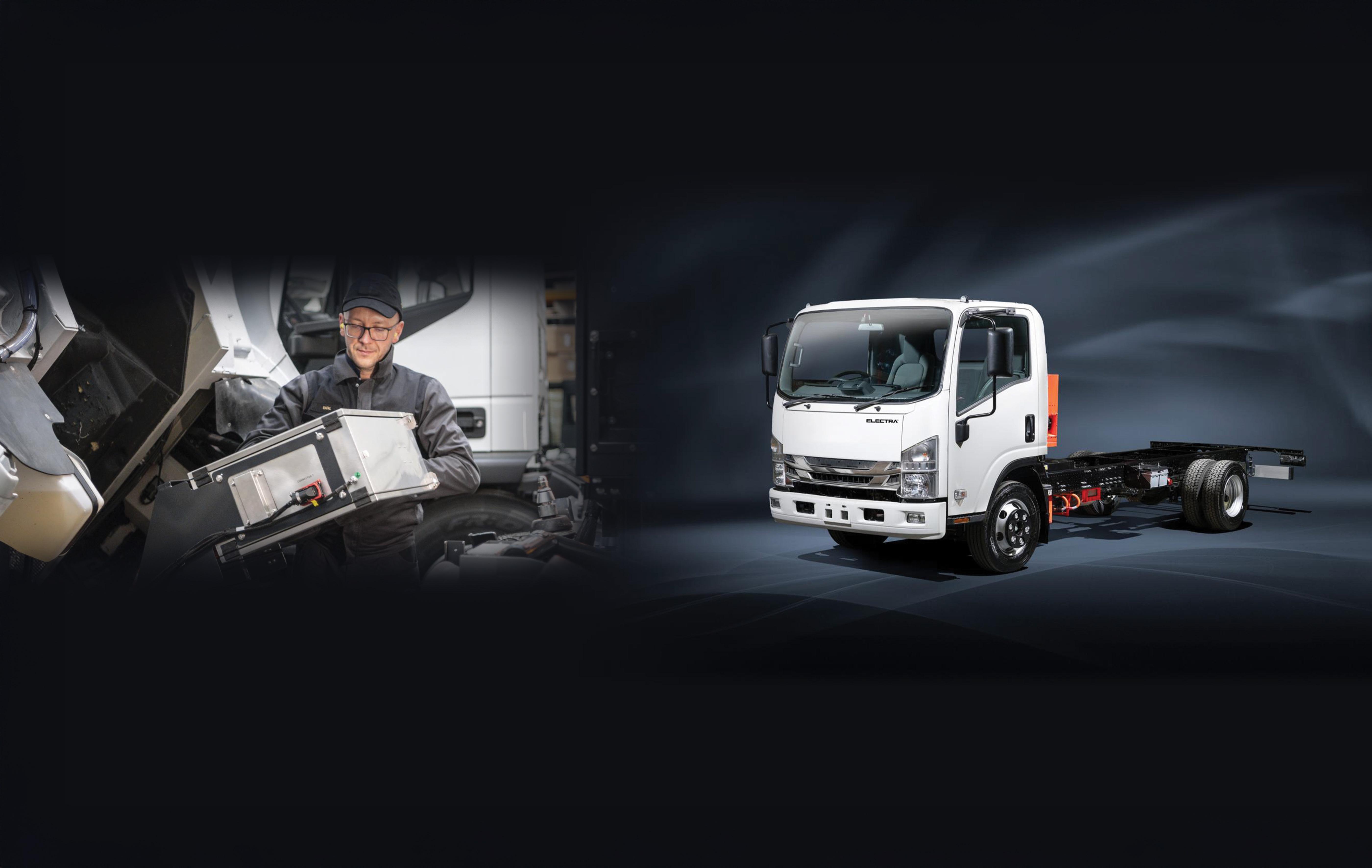


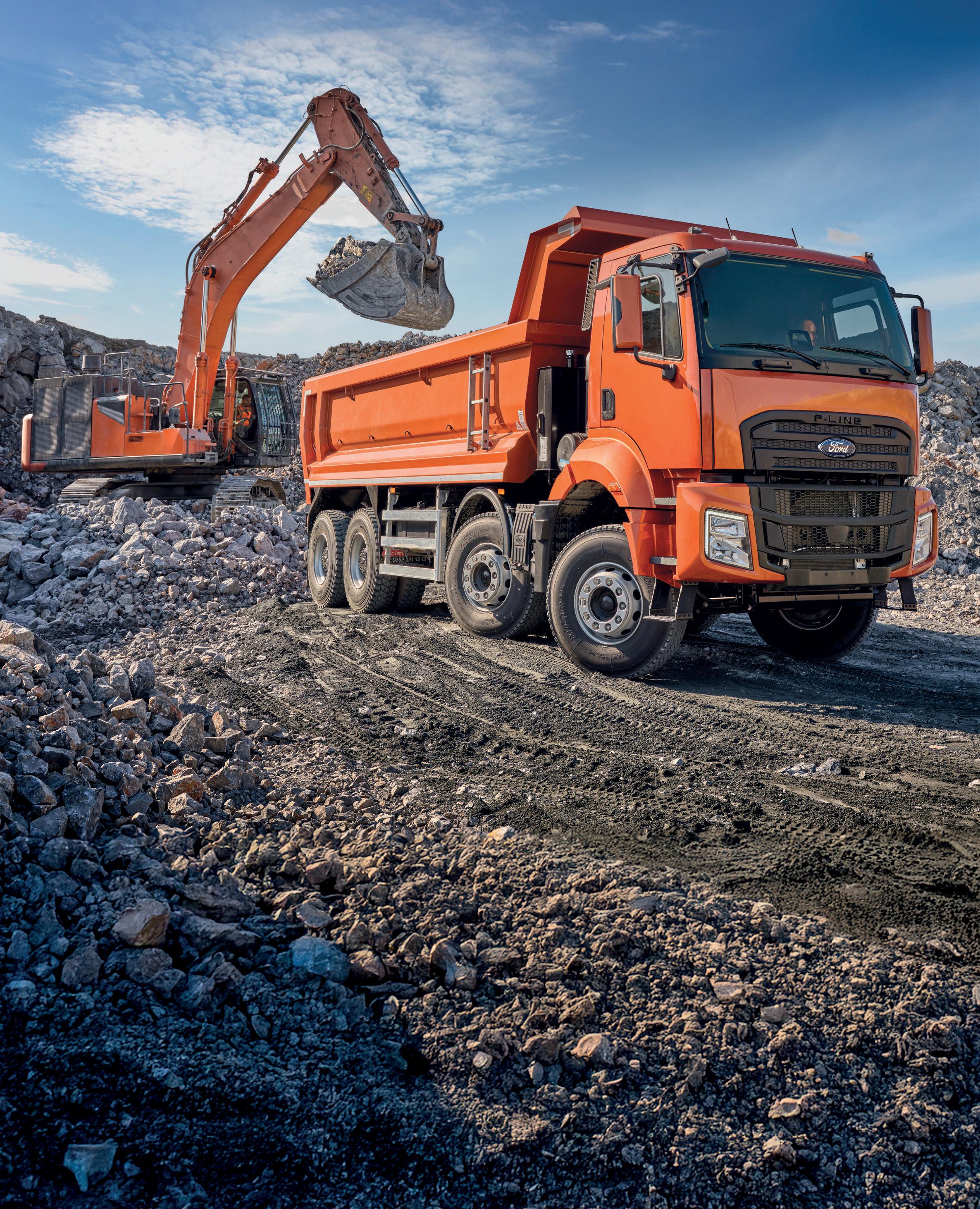
THE FUTURE FORWARD INTO
The F-Line from Ford Trucks and Al Tayer Motors takes an award-winning truck platform to the next level
The arrival of the full line-up of Ford Trucks
F-Line series in the UAE marks a major step forward for the brand’s heavy-duty transport offering in the region, introducing a family of vehicles designed around efficiency, connectivity, safety, and sustainability. Distributed exclusively by Al Tayer Motors in the UAE, the F-Line series reflects Ford Trucks’ strategy to deliver next-generation transport solutions tailored to the needs of fleets operating across the GCC.
The launch of the F-Line series is a cornerstone in Ford Trucks’ long-term growth strategy for the Middle East. The new series expands the product portfolio with modern design, advanced connectivity, and greater efficiency, directly supporting Ford Trucks’ vision of offering innovative transport solutions tailored to the needs of customers in the region. Building on record sales growth in 2024, the F-Line positions the brand to capture further momentum and sustain its leadership in the heavy-duty segment.
Inspired by F-MAX, built for fleets Ford Trucks really made its mark in the market a decade ago with the introduction
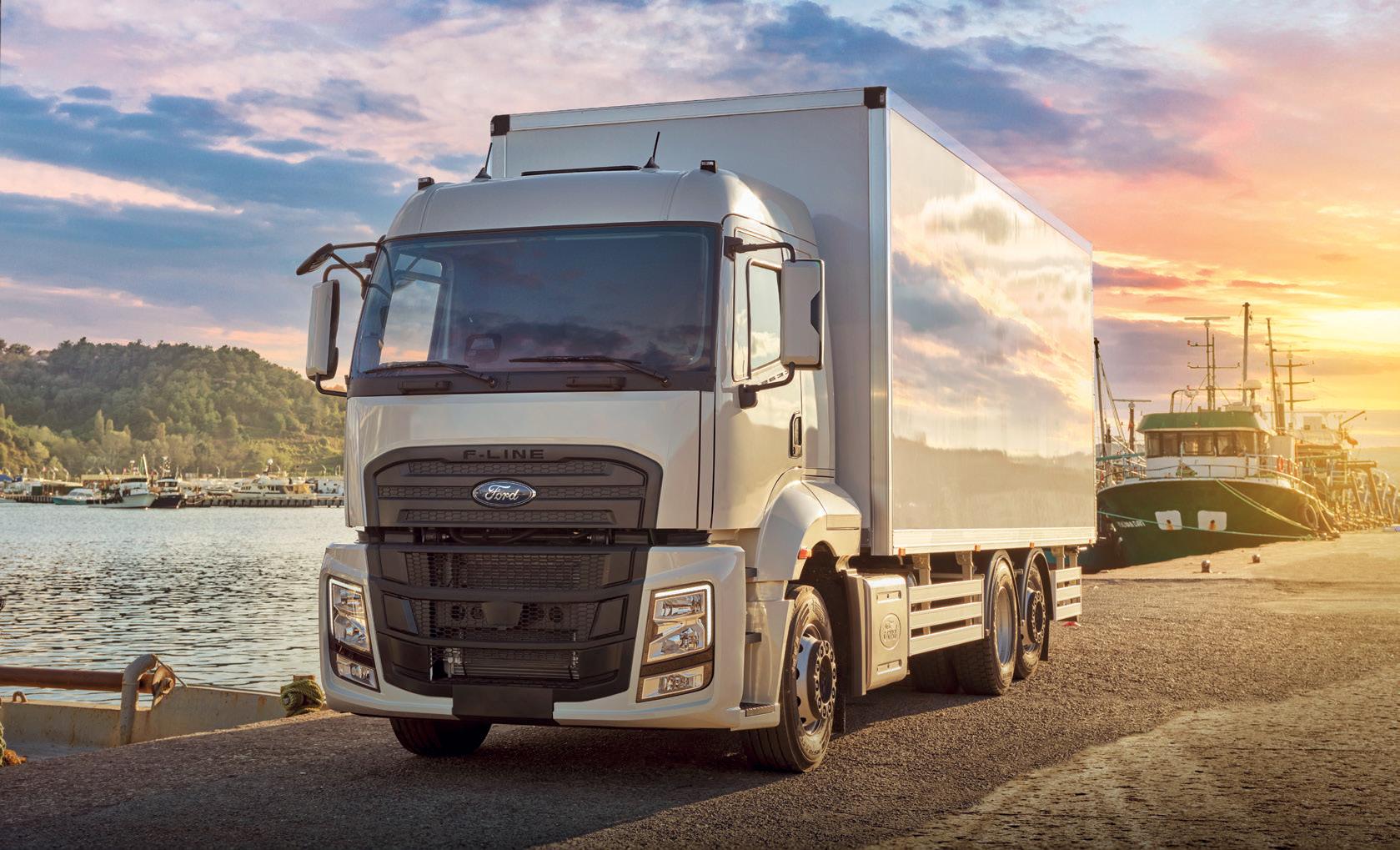
The F-Line has delivered immediate results”
of its construction and heavy-duty focused units designed to meet tight roles and requirements of heavy fleets in the region. Smartly, the brand ensured its early Construction and Tractor series entries into the market, led by the 4135M and 1843T models, arrived boasting industryleading warranty options and the muchappreciated Hot Climate Package. But its first models in the market were only the
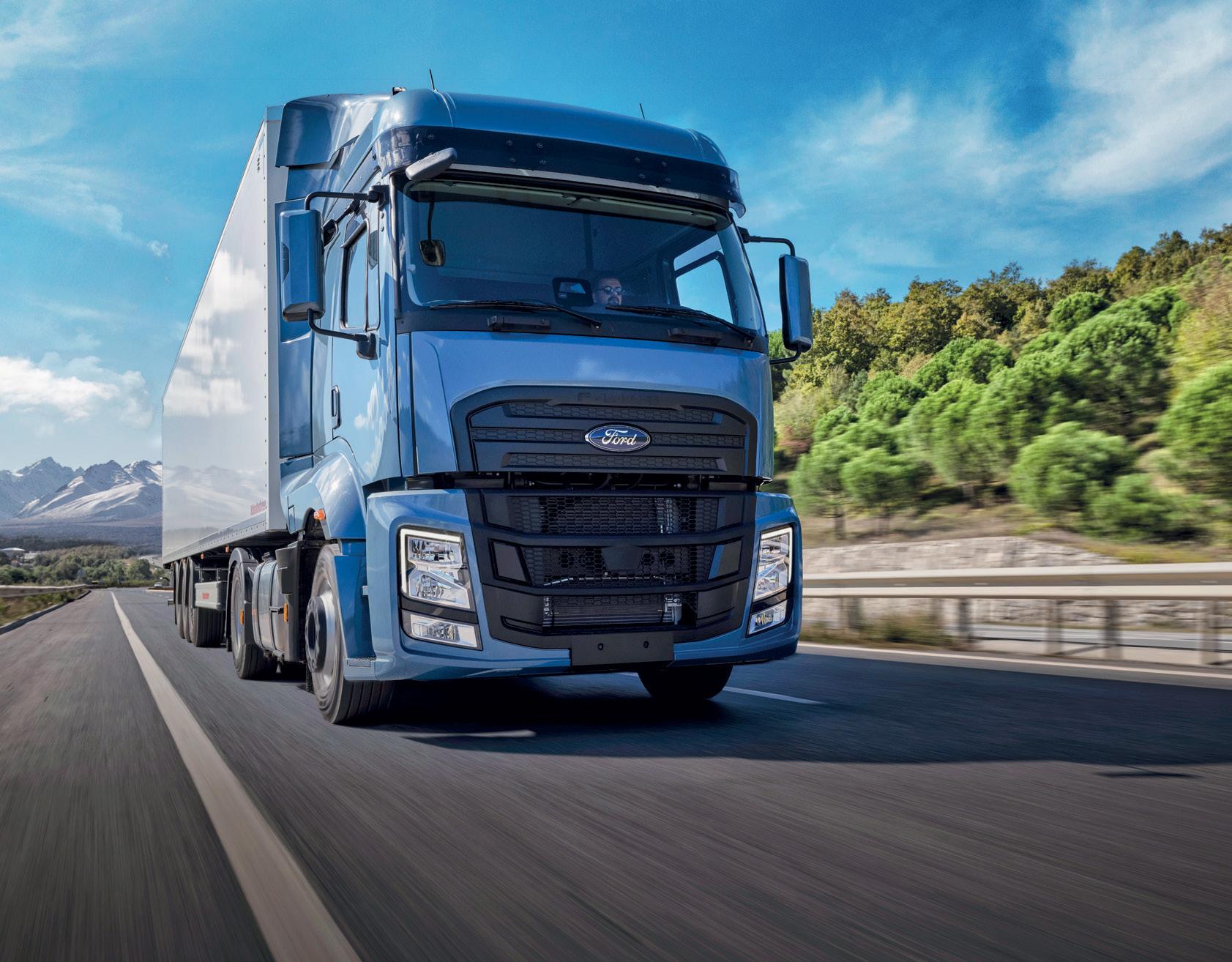
start of a rapid development programme that led to the hugely successful F-Max.
The F-Max proved to be a megatruck platform; fusing the knowledge and experience the Ford Trucks team had built-up with the earlier models along with the customer feedback that it had always embraced. The truck went on to win almost every global award it could and firmly established the company at the forefront of modern truck design.
In 2024, the company introduced the F-Line, a truck which represents the continuing evolution of Ford Trucks’ global heavy-duty platform. Compared with its predecessors, the range introduces a modern cabin designed with improved ergonomics. It demonstrates the brand’s “Sharing the Load” vision while directly addressing the daily realities of fleet operators in logistics, construction, and municipal transport.
Designed for every segment
The F-Line is structured into three dedicated series to meet a wide range of applications. The Road Series has been optimised for the efficiency and driver comfort required for long-haul logistics and cross-border fleet operations. Conversely, the newest Construction Series range meets the segment’s need for power and performance through a robust design, high-torque Ecotorq engines, and advanced Automated Manual Transmission (AMT) essential for infrastructure and heavy-duty projects.
PIVOTAL PARTNERSHIP
As Ford Trucks’ exclusive distributor in the UAE, Al Tayer Motors plays a pivotal role through sales, marketing, and customer engagement, ensuring that the F-Line launch reaches the right customer segments with strong aftersales support.
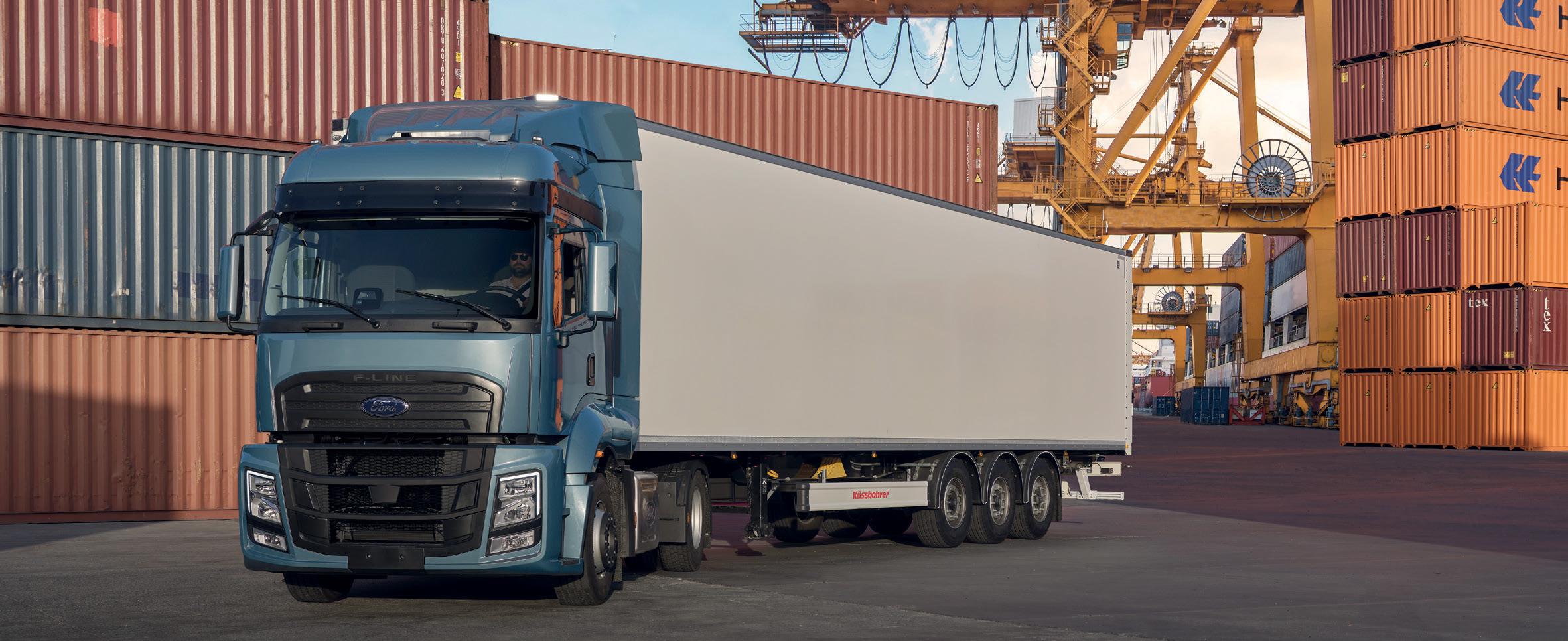
The F-Line’s Tractor Series, meanwhile, has been built for heavy-haul and towing, providing reliability for fleets moving large payloads across long distances.
The three-truck series multi-purpose approach ensures the F-Line serves distribution, construction, municipal, and long-haul fleets equally well.
Customer response and market momentum Al Tayer Motors, tells T&FME, that it recorded a 40% increase
The ergonomic cockpit improves visibility and usability”
in sales in the construction sector and a 24% rise in logistics sales, reflecting both operational performance and strong confidence from customers. Early adopters have highlighted the benefits of connected technology, uptime solutions, and the versatility of the series across fleet operations.
Comfort and usability for
drivers
Inside the cabin, Ford Trucks has prioritised ergonomics and comfort.
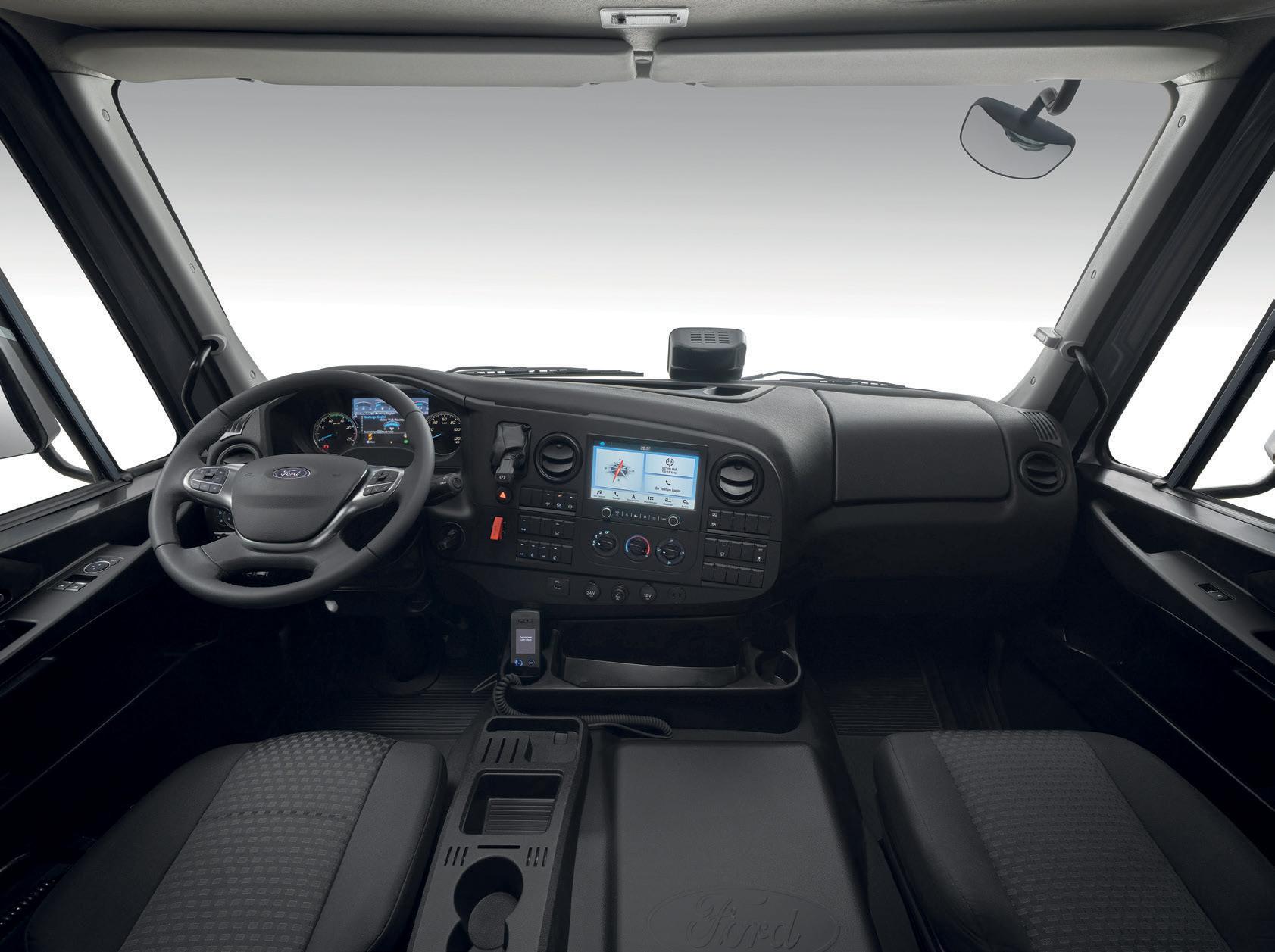
The F-Line features redesigned seats, intuitive controls, a 9” multimedia display, and improved accessibility through new grille, bumper, and mirror trims. The ergonomic cockpit improves visibility and usability, while the Construction Series offers comfort configurations across 4×2, 6×2, 6×4, and 8×4 layouts to suit varied conditions.
Drawing from the F-MAX heritage, the F-Line’s redesigned grille, doors, bumper, and mirror trims contribute to ease of access and improved ergonomics. In the Construction Series, the upgraded cabins are available across 4×2, 6×2, 6×4, and 8×4 configurations, supporting comfort and efficiency in varied operating conditions.
Aftersales, warranty, and financing
Beyond the trucks themselves, Al Tayer Motors underpins the F-Line with comprehensive after-sales support. Customers benefit from a nationwide showroom network with facilities in Dubai, Abu Dhabi, Al Ain, Fujairah, and Ras Al Khaimah, along with mobile service units that can reach customers quickly during emergencies, as well as 24X7 roadside assistance. Flexible financing and leasing solutions are available through Al Tayer Motors’ panel of banks facilitated by the in-house Finance & Insurance team, making the range accessible for businesses of all sizes. Warranty remains a standout feature: a 1+1 unlimited kilometres standard package with optional extensions of up
A STEP FORWARDS
The F-Line marks a significant step in Ford Trucks’ growth strategy, strengthening its presence in the UAE and GCC with a modern product family built around efficiency, connectivity, and safety technologies. It demonstrates the brand’s commitment to delivering next-generation transport solutions tailored to regional needs.
F IS FOR OPTIMISED FLEETS
F-Line’s connectivity and uptime solutions optimise fleet operations and reduce fuel consumption through smart route planning and remote maintenance.
to four years unlimited kilometres — one of the strongest offers in the UAE heavy-duty segment. Tailored service contracts further ensure predictable maintenance costs and extended truck life.
Sustainability and future roadmap
Aligned with its Generation F roadmap, Ford Trucks has pledged to deliver a fully zero-emission product portfolio by 2040 through its “Generation F” roadmap. Until then, the F-Line helps
This combination is a strategic leap forward in our ambition”
customers reduce emissions and fuel use through smart connectivity, uptime solutions, and route optimisation.
Engagement and market positioning
To reinforce customer awareness, Al Tayer Motors is planning open-house events at its Dubai DIP 3S flagship facility in Q4, giving clients the chance to experience the full F-Line range first-hand. Such initiatives highlight Ford Trucks’ commitment to engaging
directly with operators and showcasing the tangible benefits of its technology.
With these moves, the F-Line series cements Ford Trucks’ competitive position in the GCC. Combining advanced connectivity, a modern design, and proven durability, the range ensures Ford Trucks competes head-to-head with established heavyduty brands while offering fleets a compelling balance of cost-efficiency, performance, and long-term support.
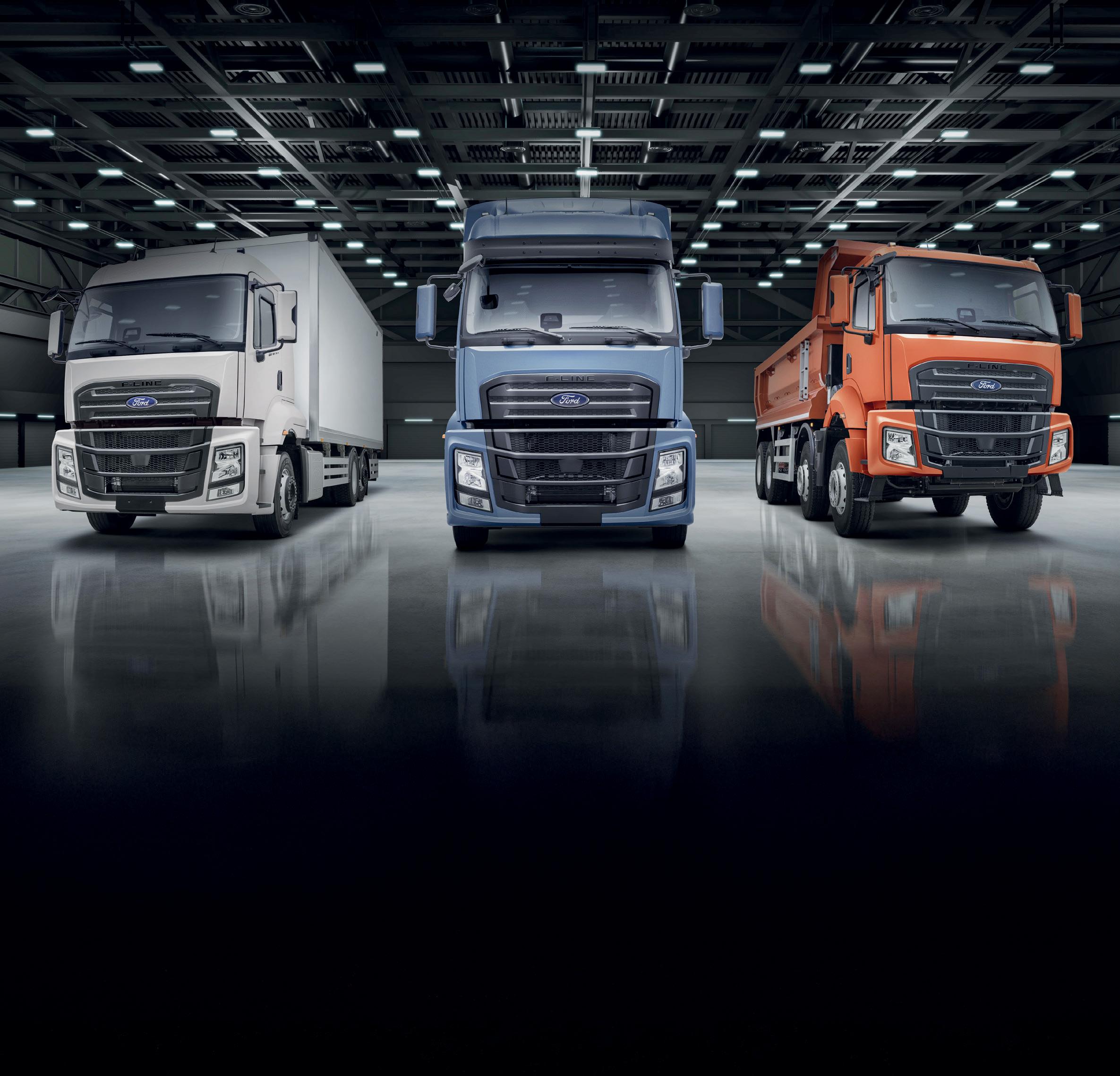
1. Connectivity and Uptime*
The ConnecTruck platform is at the heart of the F-Line, giving fleet managers real-time access to fuel data, driver behaviour, and vehicle performance. With live tracking, predictive maintenance, remote diagnostics, and overthe-air updates, fleets can cut downtime and optimise routes without additional hardware.
2. Safety First*
The F-Line boasts one of the most comprehensive ADAS packages in its class. Features include pedestrian emergency braking, adaptive cruise control with Stop & Go, blind spot information, traffic sign recognition, and lane departure warning. Rear parking aids, tire pressure monitoring, and driver drowsiness detection further ensure safer, more reliable operations.
3. Segment Versatility
With three dedicated series, the F-Line covers every major fleet application:
• Road Series: Long-haul and cross-border logistics with maximum efficiency.
• Construction Series: Rugged chassis, Ecotorq engines, and AMT for demanding projects.
• Tractor Series: Heavyhaul and towing for operators moving large payloads over distance.
4. Comfort and Ergonomics
Drivers benefit from an F-MAX-inspired cabin with a 9” multimedia screen, redesigned seats, and intuitive controls.
The Construction Series offers ergonomic options across 4×2, 6×2, 6×4, and 8×4 configurations. Improved visibility, redesigned doors and mirrors, and enhanced safety systems make long shifts less fatiguing.
5.
Total Cost of Ownership
Al Tayer Motors supports fleets with flexible financing solutions, service contracts tailored to applications, and industry-leading warranty options—up to five years with unlimited kilometres. This, combined with smart fuel optimisation and predictive maintenance, reduces lifetime costs while extending truck life.
*Coming soon.
TOP 5 FLEET BENEFITS OF THE FORD TRUCKS F-LINE
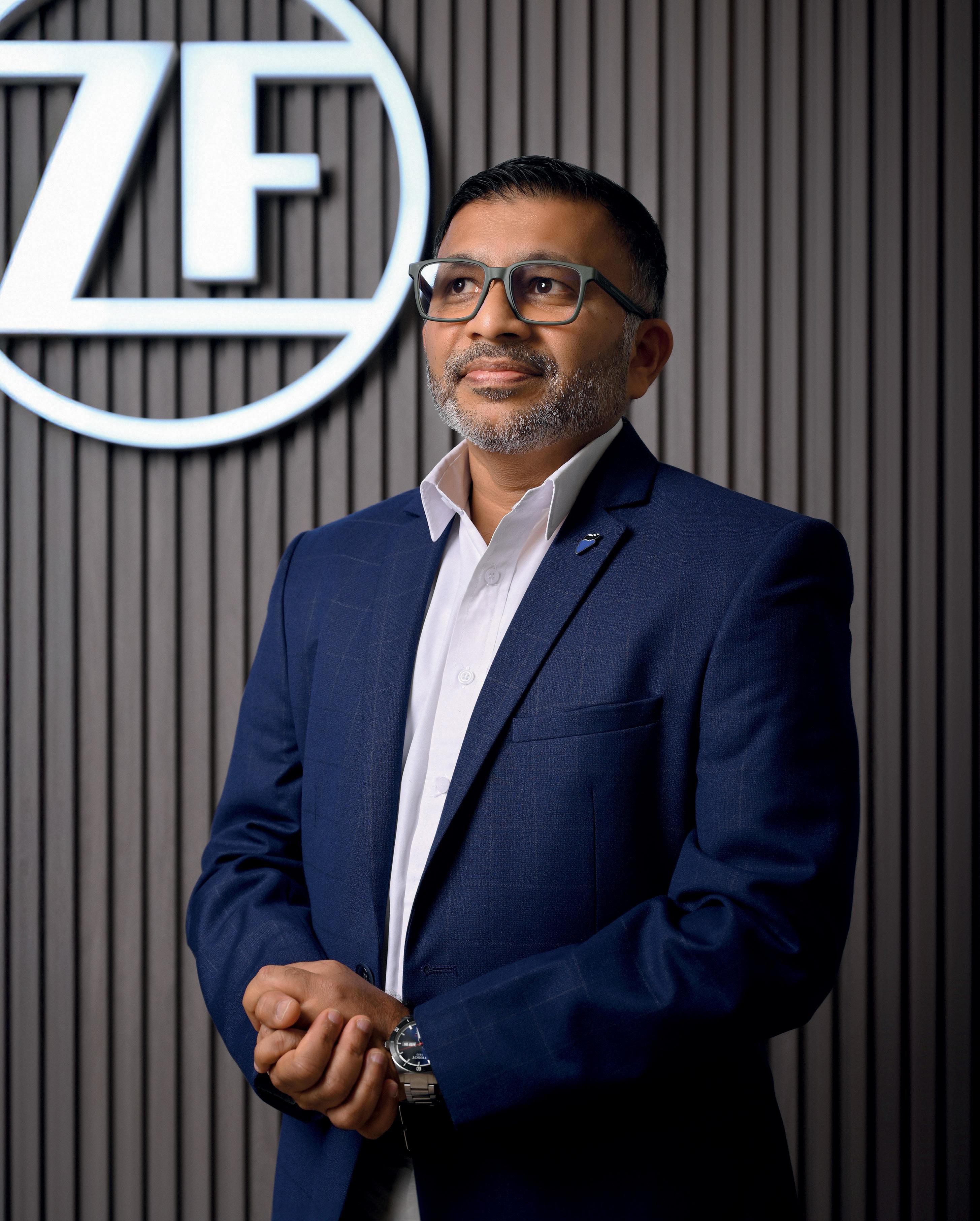

A TRUE PRO
T&FME talks to Micky Mathew at ZF Middle East on his career and how ZF [pro] Service network can provide state-of-the-art aftermarket support in the region
With more than 19 years of experience at ZF, Micky Mathew, Network
& Field Support Manager at ZF Middle East, has played a pivotal role in shaping the company’s aftersales and service strategies across the MENA region.
From building a robust ZF [pro]Service network to supporting fleets with retrofit solutions and training initiatives, Mathew’s work ensures operators across the region have access to OE-quality support and cutting-edge technology. In this interview with T&FME, he discusses how ZF is helping fleets maximise uptime, improve safety, and prepare for the future of mobility.
Micky, to begin with, can you tell us a bit about your role within ZF and what areas of the business you’re most closely involved with on a day-to-day basis?
I have been part of the ZF team for 19 years, where I have been closely associated with the aftermarket service industry for commercial vehicles, providing service and retrofit solutions, especially from the WABCO side of the business. Since the integration of ZF and WABCO, I am more focused on providing a strong service network for all ZF products in passenger car, truck, bus, trailer and off-highway segments in the MENA region. This also involves finding the right partners, promoting our service strategies, and sharing the right technical knowledge.
ZF [pro]Service has become a key part of your aftermarket support strategy. How would you describe the core philosophy behind this concept,
and what differentiates it from conventional workshop networks?
ZF Aftermarket benefits from more than 100 years of innovation, technology, expertise and experience in developing OE-quality parts and solutions, which we provide to all market players in aftersales. This means we need a very strong network in the region. Our core philosophy is to provide a personalised service concept for our unique market segment with the aim of maximising mobility uptime by increasing both efficiency and safety.
We offer expertise and unmatched technological knowledge to our ZF [pro] Service partners. They get a personalised service offer for truck, trailer, bus and offhighway workshops and take advantage of the well-known ZF Aftermarket brands ZF, LEMFÖRDER, SACHS, TRW and WABCO.
What kind of workshops or partners are best suited to join the ZF [pro]Service network?
Are there specific criteria or capabilities they must meet?
We look for partners with well-established professional workshops that can shoulder the service responsibilities alongside ZF and provide our end customers with a professional one-stop-shop service experience in truck, trailer, bus and off-highway segments. There is a big section on our webpage where everyone who is interested can find all the benefits and a link to the application form. We are happy to review all the requests coming from the markets.
Our main goal is to identify the right local partners and to grade them via an initial assessment programme, wherein we factor the workshops’ strategic location, service

We offer expertise and unmatched technological knowledge to our ZF [pro] Service partners”
capabilities, and market reputation among other factors. This mutually helps both parties to up-skill and work together with positive synergies. It is a win-win situation.
From your experience in the region, how have customers and fleet operators responded to the ZF [pro]Service concept? Are there any regional success stories or milestones worth highlighting? Globally, the concept has been in the making for more than 15 years, and our global footprint has grown to include more than 3,800 partners.
On a more regional basis, we see yearon-year growth of our service network. We had 14 service partners by 2020, and after the signing of seven new ZF [pro] Service mobile workshops in Saudi Arabia during Automechanika last year, we are currently sitting at more than 40 service partners in the region, and we continue to grow our network on a daily basis.
As you rightly mentioned, we aim to connect local fleet operators to our ZF [pro]Service network to increase uptime and keep mobility service uninterrupted.
What kind of support and tools does ZF offer its ZF [pro]Service partners to ensure consistent quality and service delivery?
Considering that the ZF [pro]Service concept is modular, the requirement of each workshop differs depending on the vehicle service applications (i.e. bus, truck, trailer or off-highway) and the concept.
There are a set of specific ZF tools that a partner is required to invest in for their workshops, especially diagnostic tools for WABCO products and ZF transmissions.
Having the right tools as ZF [pro] Service partners ensures the contracted workshops are prepared for all situations and can provide an OE standard service.
ZF also offers a growing range of retrofit solutions for trailers through its WABCO offering. What’s driving the demand for these solutions in today’s market?
Trailers are the wagons of today, wherein all of life’s necessities, from clothes to food to construction material, are being transported by road.
The trailer industry is rapidly evolving, especially post-2012, when trailer registration, inspections and road tests were made mandatory, increasing the concerns and demand for trailer safety and stability. Providing retrofit solutions for existing trailers with more safety features improves and increases safety and stability on the roads.
Could you give us an example of a retrofit solution that has had a significant impact on trailer safety or operational efficiency?
The Trailer Electronic Braking System (TEBS) is the latest technological marvel offered by ZF to the market.
The system is a self-sustained computer powerhouse that is retrofittable at a workshop level, and when installed correctly has the capability to provide ABS safety
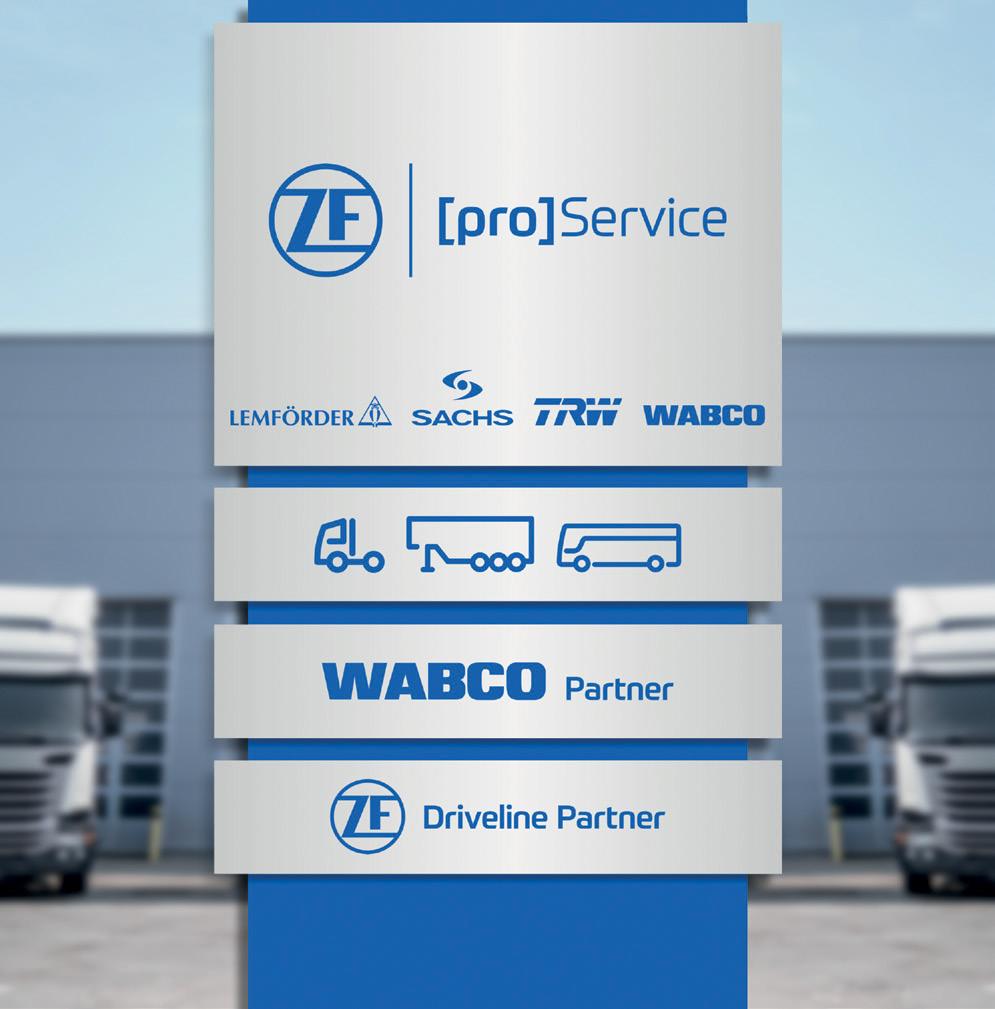
Our main goal is to identify the right local partners”
and rollover stability. It also reads and analyses the driving conditions and the driver’s behaviour during critical situations and proactively ensures trailer stability with a certain amount of automation.
With our inbuilt Operation Data Recorder (like a black box in an aircraft) several critical aspects during driving are monitored with live alerts, avoiding rollover incidents and accident records. All incidents of safety and stability in the trailer, from start to stop, are monitored and recorded during operation for diagnosis, driver training and other safety and operational preparedness.
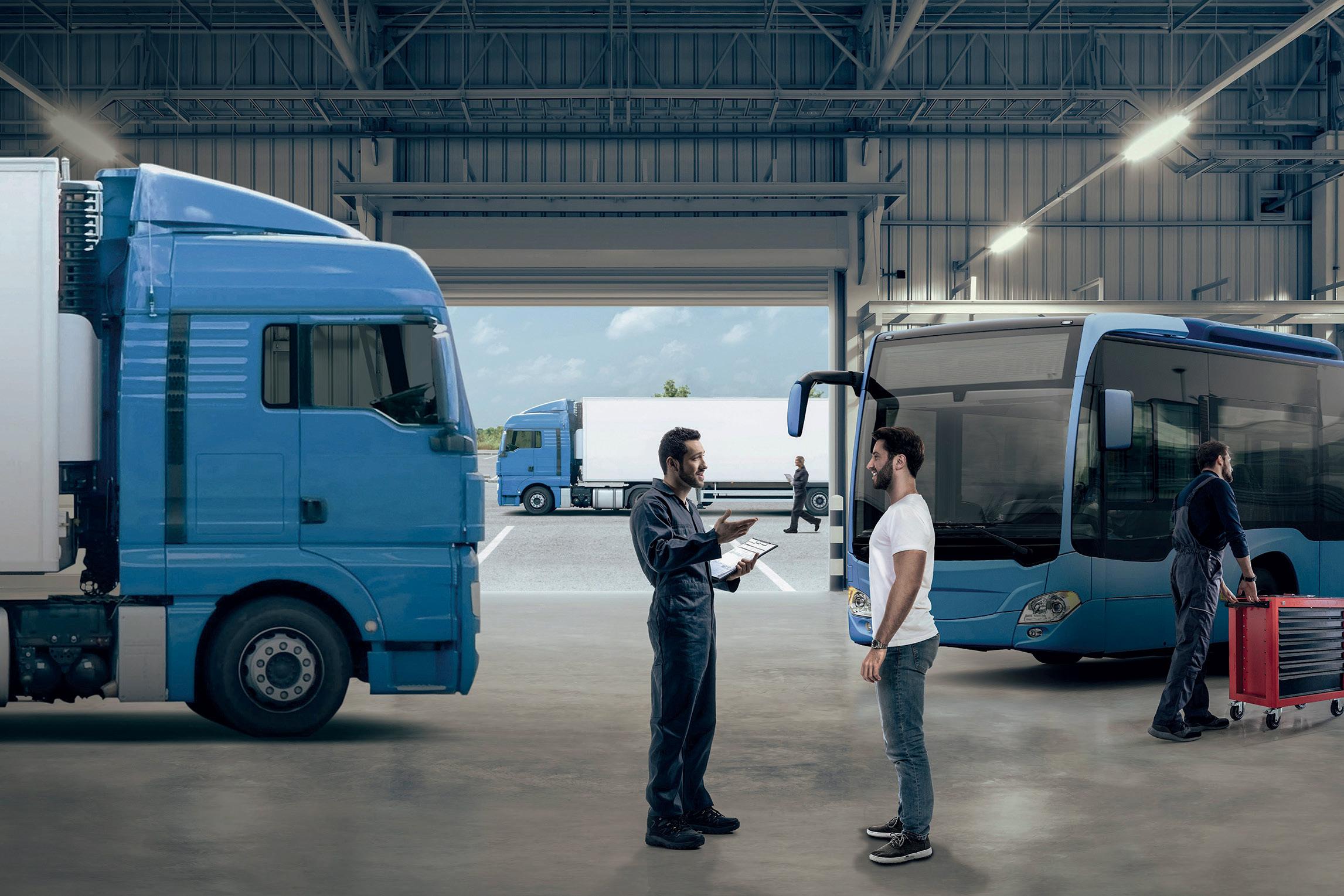
How easy is it for fleet operators to implement these retrofits—are there cost or downtime concerns they should be aware of?
Every implementation project is handled on a case-by-case basis, wherein our technical experts will inspect the trailers first and then come up with a customised solution based on trailer specifications.
During the planning and preparation phase of each project, a detailed assessment of the service readiness, estimated downtime, and costs for each vehicle will be provided. Downtime and costs will vary depending on the requirements.
With sustainability and uptime now more important than ever, how do ZF’s retrofit solutions align with broader fleet decarbonisation or digitalisation goals?
ZF Aftermarket offers several retrofit solutions via our Intelligent Trailer Program (ITP), which function specifically to maximise fuel efficiency and to reduce CO2 emissions. These ITP solutions are designed to work with minimum driver intervention, helping fleet and cargo owners to meet their CO2 emission reduction goals.
Among the retrofit solutions in the Intelligent Trailer Program are solutions like OptiTire, which offers internal and external wheel sensors that monitor tyre pressure, temperature, and detect early tyre issues leading to 2% fuel savings and a significant reduction in CO2 emissions. Our OptiFlow solutions improve trailer aerodynamics, also leading to fuel and emissions reductions.
There is more comprehensive information about our ITP on our website, should anyone be interested in exploring the solutions further, and there are various trainings available on ITP safety solutions via ZF [pro]Academy.
Let’s talk about the ZF [pro] Academy. What types of training does it offer, and who are the key audiences for these programmes?
ZF [pro]Academy’s mission is to provide in-depth knowledge of automotive technologies to industry students, technicians, and professionals.
We offer training programmes for passenger cars and commercial vehicle applications, that include training on ZF powertrain systems and vehicle stability systems, with hands-on learning at various stages.
PLUGGING IN THE NETWORK
Since its launch in 2020, ZF Middle East has been focused on building and expanding the ZF [pro]Service network across the MENA region, it now 40 boast service partners in the region.
RETROFITTING SMART DESIGNS
ZF Middle East is supporting fleets with retrofit safety and efficiency solutions, including the Intelligent Trailer Programme as part of an aim to improve fleet uptime in the region.
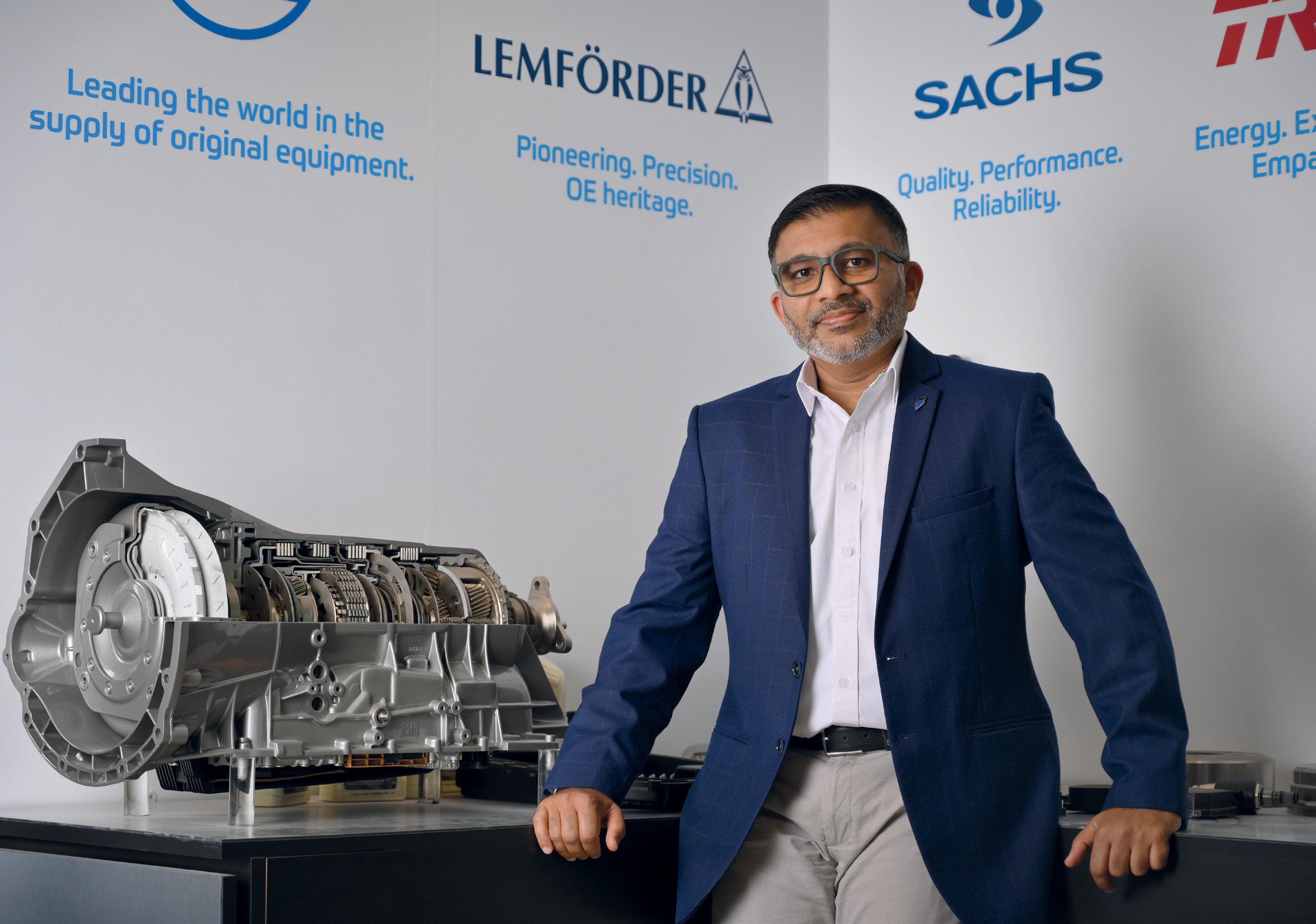
We also offer e-Learning options for commercial vehicles on WABCO products for those who are eager to learn more at their own pace. All registration can be done via ZF [pro]Academy portal on the ZF Aftermarket page.
It is a fast-evolving industry where technology like electrification, digital diagnostics, and ADAS are becoming more common, how is ZF using the Academy to keep workshops and technicians up to date?
At ZF [pro]Academy we believe it is never too late to learn and learning is a never-ending process, as knowledge does not cease to exist. To support our systems, we provide year-round training and refresher programmes scheduled to our contracted service partners to allow them to keep abreast of the solutions offered at ZF.
Is there a particular success story or training rollout from the Middle East or
ZF is embracing the opportunity to combine mechanical and digital technologies to change the world for the better”
Africa region that you feel showcases the impact of the ZF [pro]Academy?
Our success stories are our participants. The ability of the participant to effectively engage with our ZF technical systems, increasing their diagnostic capabilities, and reducing the time to troubleshoot, all lead to reduced vehicle downtime.
The increase in system knowledge amongst technicians and industry professionals has led to a significant rise in training registration. As of today, our training rooms are booked until the end of the year. However, bookings for Q1 2026 are now open for registrations.
How important is ongoing technical education in maintaining the quality of service across your network—and what steps is ZF taking to future-proof skills?
ZF is an OE supplier for more than 55 automotive brands, and with technology evolving at a rapid pace at ZF, it is
paramount that learning be an ongoing process. We are closely aligned with our service partners in the aftermarket, to ensure that they enrol and participate in our regular training programmes, optimising skills and service quality on the ground level.
Finally, what can we expect next from ZF in terms of aftermarket innovations or regional strategy? Are there new service models, digital tools, or product updates on the horizon?
ZF is embracing the opportunity to combine mechanical and digital technologies to change the world for the better.
We’re harnessing this technology and aiming high, using intelligent technologies to aim for a world with zero accidents and zero emissions. We’re applying digitalisation at OE level in both automotive and industrial applications, and all that expertise flows into ZF Aftermarket, keeping our customers equipped for their business needs both today and in the future.
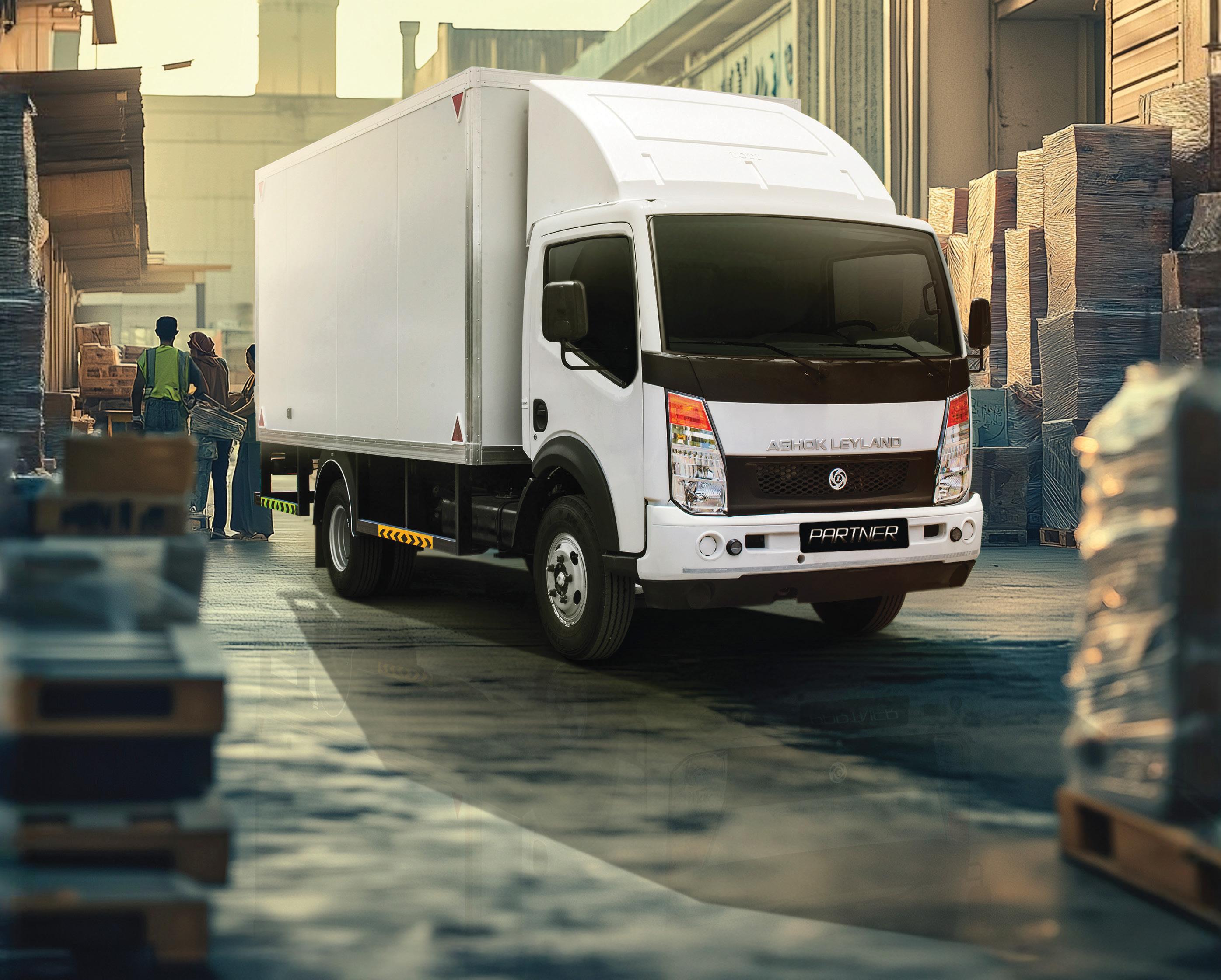
BACK TO DOHA
Stephen White talks to Shenu Agarwal, CEO, Ashok Leyland and Ramez Hamdan of Al-Futtaim Industrial Equipment about their plans for the Qatar market and truck segment
After building momentum in Saudi Arabia, Al-Futtaim Industrial Equipment (FAMCO) and Ashok Leyland are setting their sights on Doha with a phased entry into buses, trucks and light commercial vehicles.
The FIFA World Cup construction rush may be over but Qatar’s commercial vehicle market has undergone rapid transformation in recent years, driven by infrastructure investments linked to national development goals and a strong focus on logistics and
transport efficiency. Fleets are fighting for market share in the crowded market and face mounting pressure to balance uptime, safety, and sustainability while meeting rising customer expectations. If you’re selling into fleets the focus needs to be on providing not just quality products, but also comprehensive aftermarket support, training, and digital tools to keep those operators competitive.
Against this backdrop, Al-Futtaim Industrial Equipment (FAMCO) and Ashok Leyland are determined that to prove they can be key partners for fleets in Qatar and across the wider MENA
Together, we are shaping a resilient and agile enterprise”
region. The world’s fourth-largest bus manufacturer and a leading global truck producer signed a dealership agreement with the GCC distribution plater to represent the brand in the peninsula last month.
For Shenu Agarwal, CEO of Ashok Leyland, the decision was about more than performance.
“Two reasons drove this decision,” Agarwal explained. “One is that we already have a partnership with Al-Futtaim in Saudi Arabia, and they have done a wonderful job. We are very happy with what they have achieved. The other is ethos. Their


value system aligns closely with ours — a focus on customer service and customer experience, not just numbers. That has helped us create a very strong bond.”
That bond is already paying dividends in Saudi Arabia, where the two companies have spent the last year building infrastructure and presence. For Agarwal, it is a model worth replicating in Qatar.
Some commentators have suggested Qatar’s commercial vehicle market slowed after the completion of World Cup projects. Agarwal, however, rejects this narrative.
“I think Qatar is very attractive for us,” he said. “Our brand and our product range should be very well accepted. With a great partner like Al-Futtaim, we are really looking forward to making our presence felt.”
Agarwal believes that governmentled investment in logistics, energy, and infrastructure will continue to drive demand for buses, trucks, and light commercial vehicles in the years ahead.
Ashok Leyland has a clear playbook for entering new Gulf markets: start where it is strongest and expand in phases.
“We have a huge strength in buses right now, so we’ll start with a few bus platforms,” Agarwal explained. “We are preparing a very dynamic and attractive range of light commercial vehicles, which will follow, and then we will move into medium and heavy trucks. As always, our intent is to focus on service first.”
That order of priority is deliberate.
“Our intent is always to focus on the service side first,” Agarwal emphasised. “So similar will be our story in Qatar. We are very, very focused on providing service.”
Service as a Core Promise
For Agarwal, service is the ultimate differentiator in commercial vehicles.
“In cars or two-wheelers, service is important — but in commercial vehicles, it is absolutely critical,” he said. “The uptime of those vehicles has to be close to 100%. If customers lose uptime, they lose revenue. That is why we put customer service at the core of everything we do.”
This focus is also why distributors are not just sales channels but partners in product development.
“Our distributors play a very good role in that. They have access to the customers, they know the local requirements, and we work closely together to decide what new products to bring in.
We are preparing a very dynamic and attractive range of light commercial vehicles”
Beyond sales, they add a lot of value.”
Competition in the Gulf’s fleet market is intensifying, with Chinese OEMs making strong moves into both the passenger and commercial segments. Agarwal remains confident Ashok Leyland is well equipped to compete.
“We breathe commercial vehicles. For 78 years we have done nothing else,” he said. “We understand markets, customers and applications very well. We have a very strong and innovative R&D team, and innovation is one of our values. We are frugal in our approach — keeping products functional and competitively priced rather than flashy. Combined with our service philosophy, that’s what makes us stand out.”
He explained that customer needs, not flashiness, drive product design.
“There are two ways you can go about it — you can make products very flashy, which increases the price, or you can keep them functional and fashionable and keep prices low. That is our intent. Combined with service-first thinking, that is the magic.”
Ashok Leyland is not just an Indian success story — it is an increasingly global brand. It is currently the world’s fourth-largest bus manufacturer and one of the largest truck producers in Asia.
“We are very proud of the fact that we are the fourth largest in buses now in the world and, of course, number one in
India,” Agarwal said. “But we don’t want to be contained to buses. Trucks are a very attractive opportunity for us. We sell a lot of trucks in India and other markets, and now we are preparing ourselves for the GCC with light commercial vehicles first, followed by medium and heavy trucks.”
This global ambition is supported by an R&D capability that Agarwal describes as highly customer-focused.
“We always look at differentiation in the market — learning from customers about what is missing and then going back to R&D to make it happen,” he said. “Innovation is one of our core values.”
Bold Regional Vision
For Al-Futtaim, the Qatar agreement is another milestone in a regional growth strategy. Managing Director Ramez Hamdan said the decision reflects the group’s ambition to become the Middle East’s most comprehensive commercial vehicle partner.
“After the big success we had with Ashok Leyland in Saudi Arabia, we decided to partner together in Qatar, where we see significant growth in commercial vehicles, specifically trucks and buses,” Hamdan said. “When you want to deal with the best, you need to work with the best — and that is why we are expanding with Ashok Leyland.”
Hamdan underlined that the partnership is about shared values
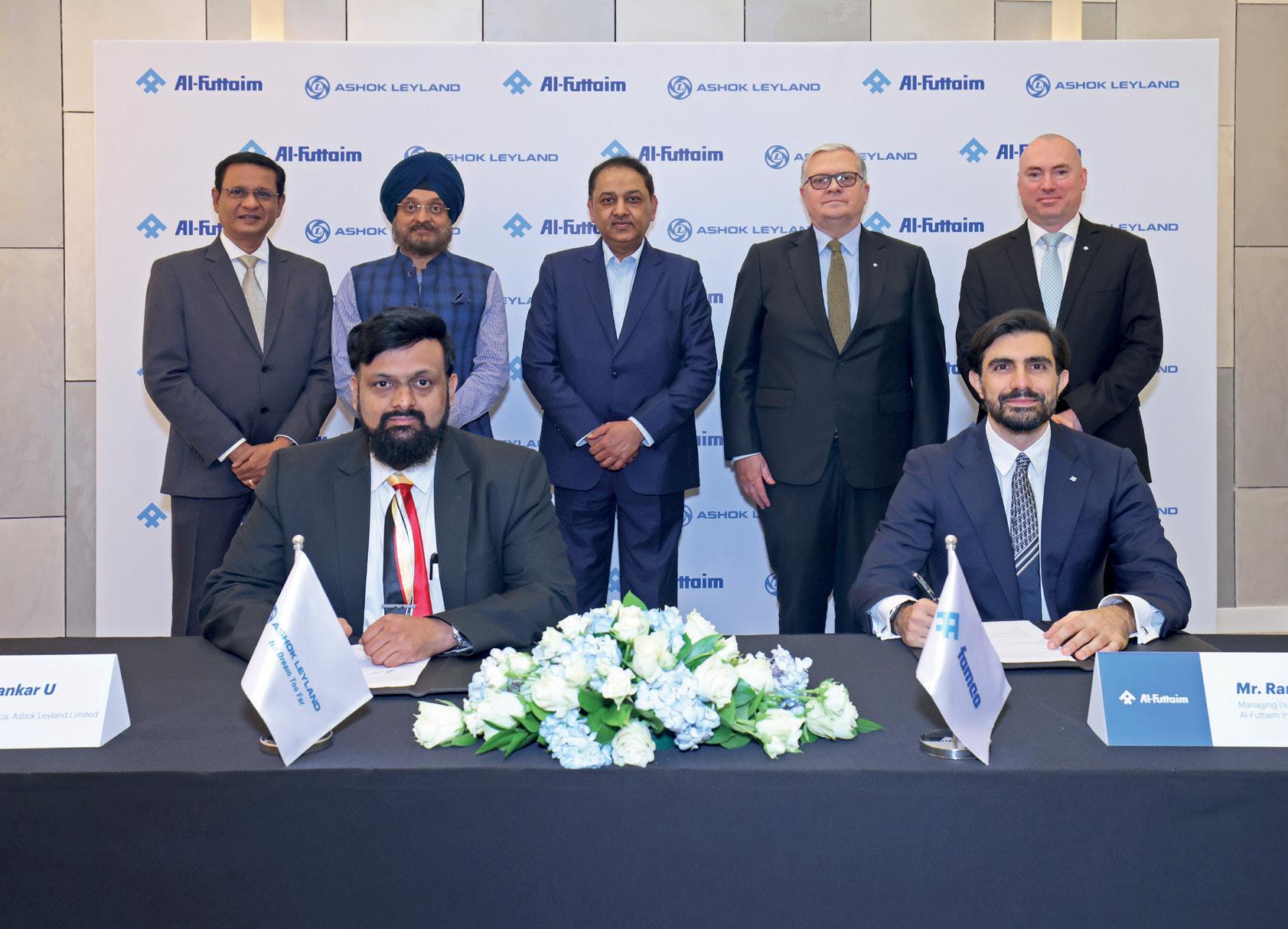
VEHICLES IN DEMAND
The Qatar deal builds on the partners successful launch in Saudi Arabia. Ramez Hamdan say they see significant market growth in commercial vehicles, specifically trucks and buses.

as much as shared goals.
“We share the same vision, whether in terms of product segments or regional presence,” he explained. “We are already discussing how to expand further, and there is more news to come. In the GCC, Ashok Leyland is already a leader — number one in India, strong in the UAE and Saudi Arabia — and now we see great potential in Qatar.”
Al-Futtaim has backed its ambitions with significant investment in facilities and talent.
“We now have seven facilities in Saudi Arabia and more than 200 — close to 300 — people on the ground,” Hamdan said. “We have a great, talented team that knows what it’s doing. It makes it easy to manage.”
The company has also expanded its portfolio with new brands and is preparing to add further distribution agreements.
“Qatar may be small geographically, but the potential is big,” Hamdan said. “There is still a lot of government investment in logistics, infrastructure and energy. Post-World Cup, there are many projects underway. We are really excited about the opportunities.”
Fleet Growth Across the GCC
The Qatar move is part of a broader story of GCC fleet expansion. Both Saudi Arabia and the UAE are investing heavily in transport, logistics, and smart city infrastructure. Saudi Arabia’s Vision 2030 has created huge demand for buses and trucks, while the UAE continues to modernise public and private fleets with Euro 6, hybrid, and electric vehicles.
Qatar, meanwhile, has committed to electrifying its public transport fleet by 2030. While Agarwal and Hamdan did not directly address electrification, Ashok Leyland is investing in electric buses and alternative
Trucks are a very attractive opportunity for us”
fuel technologies in India — experience it could eventually bring to the Gulf.
For now, the focus is on building market share with diesel-powered buses and trucks, supported by service networks that can guarantee uptime.
Both Agarwal and Hamdan frame the Qatar partnership as a long-term play. For Ashok Leyland, it is a chance to prove its global credentials in another Gulf market. For Al-Futtaim, it is another bold step in a journey to become the region’s one-stop-shop for fleets.
Hamdan summed up the mood: “This is the vision of Al-Futtaim Group — to expand in the region, to take bold steps, and to invest in growth. With Ashok Leyland, we are confident in our ability to deliver
value to customers and to shape the future of commercial vehicles in Qatar.”
The story of Ashok Leyland and Al-Futtaim in Qatar is about much more than a dealership agreement. It is about alignment — of values, of strategy, and of vision. It is about recognising that fleet customers in the Gulf demand not only reliable vehicles, but service, uptime, and long-term commitment.
For Agarwal, it is an extension of a 78-year-old legacy in commercial vehicles. For Hamdan, it is a chance to demonstrate Al-Futtaim’s regional strength. And for fleet operators in Qatar, it could mean a new partner promising competitive products, reliable service, and a long-term presence in the market.
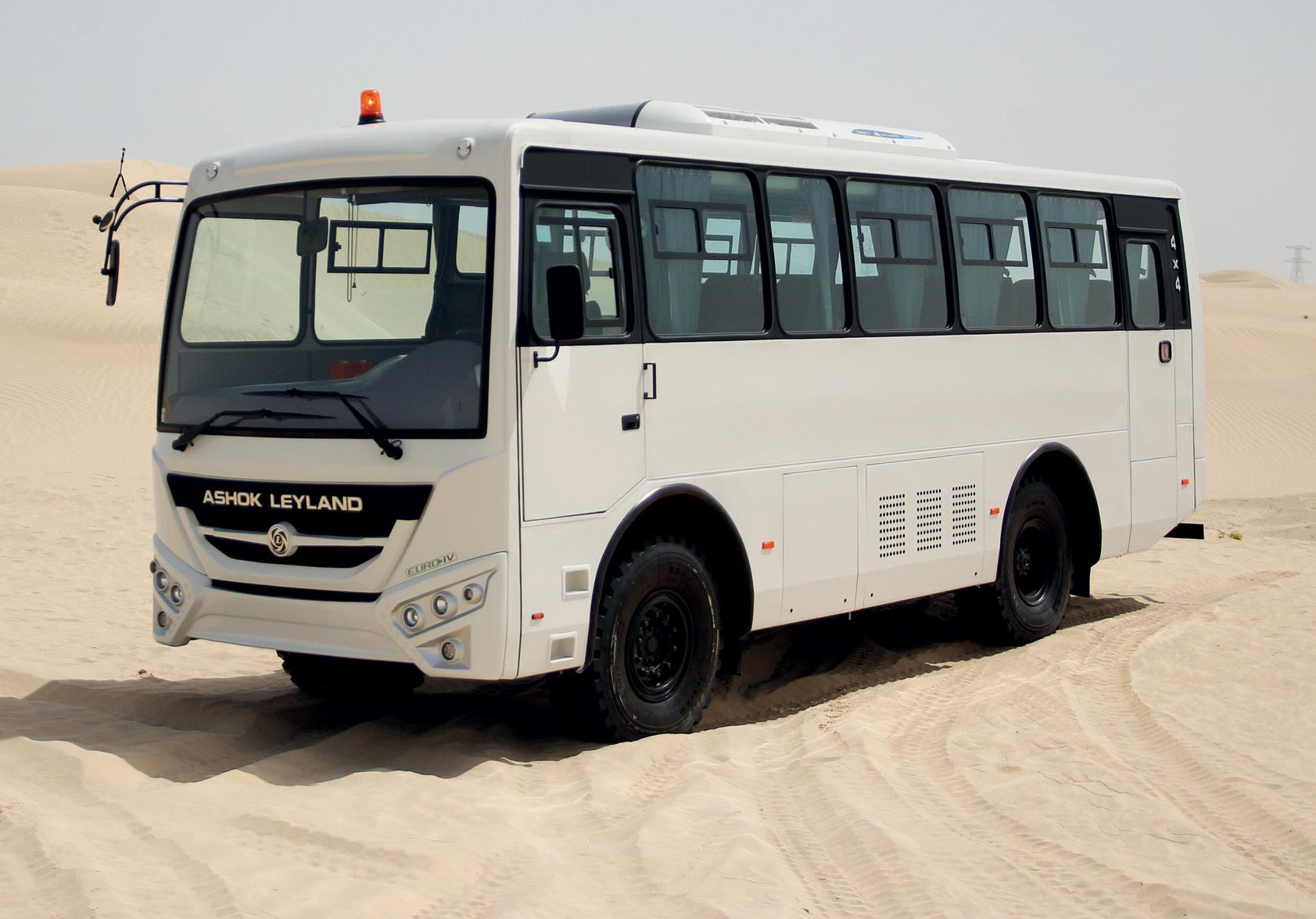
DEMAND FOR ALL VEHICLES
Agarwal believes that government-led investment in logistics, energy, and infrastructure will continue to drive demand for buses, trucks, and light commercial vehicles in the years ahead.
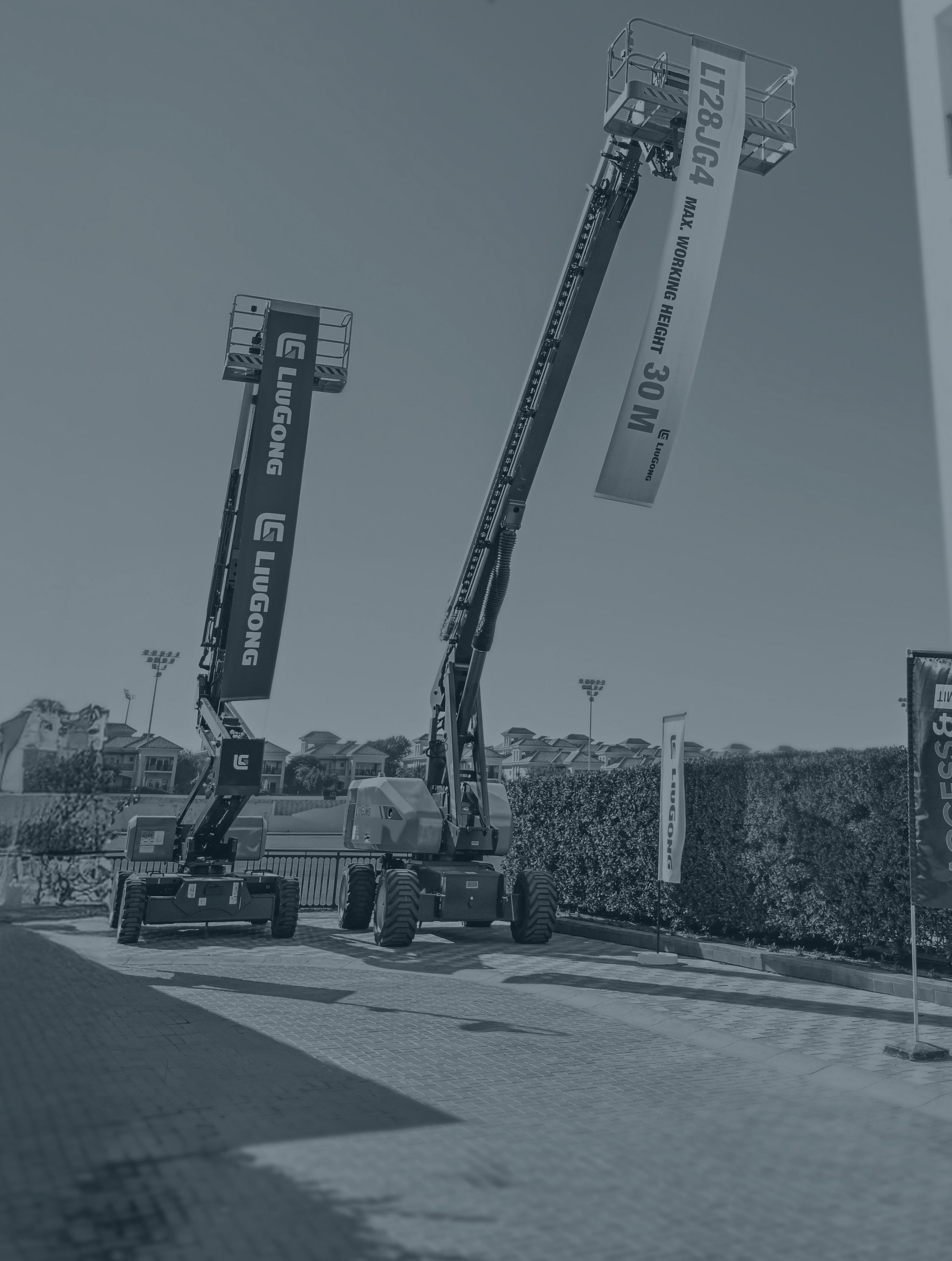

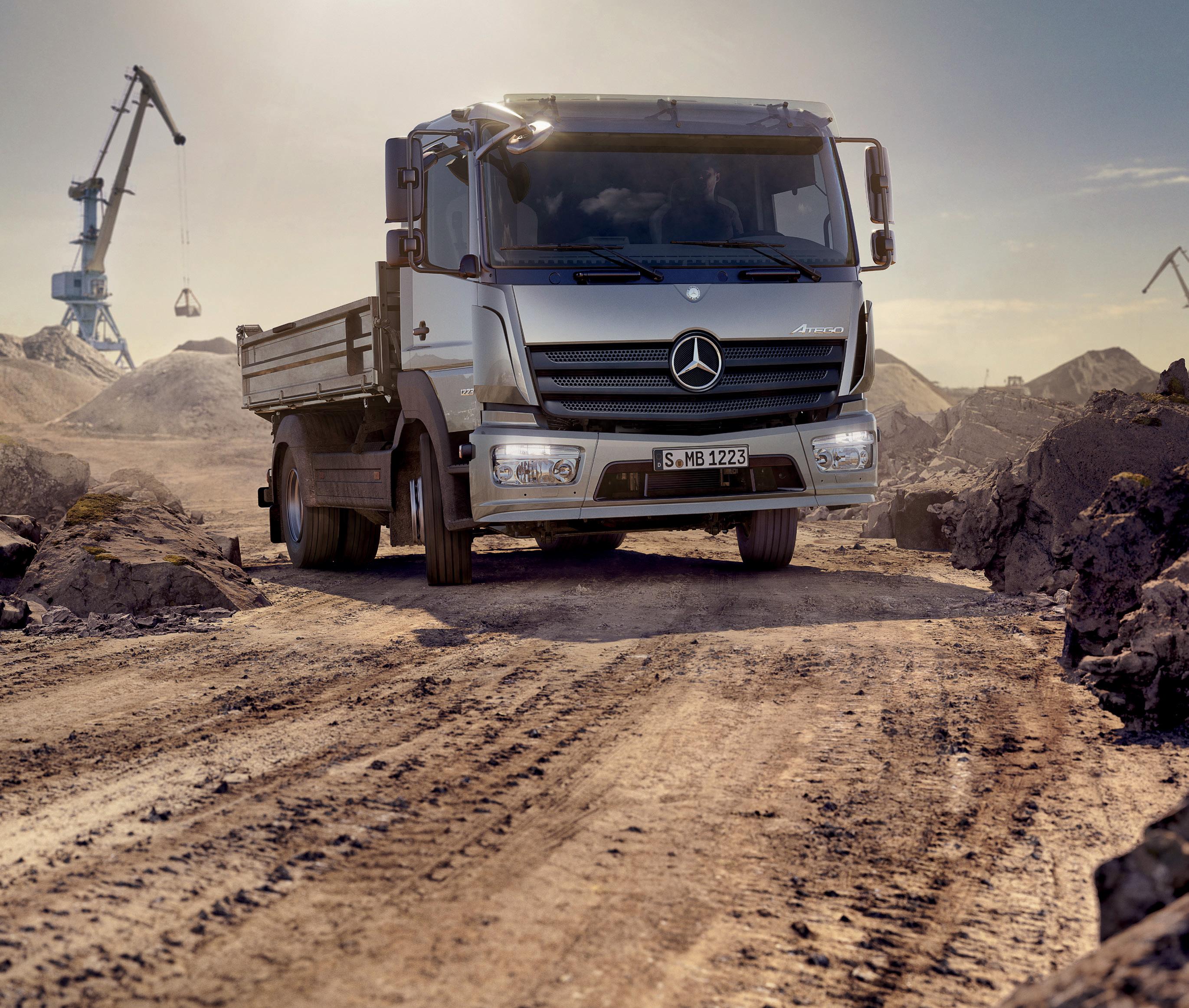
DAIMLER’S DILEMMA
T&FME takes a deep dive into Daimler Truck’s results and how they could impact the Middle East market
At the end of August, Daimler Truck AG released its interim management report for the second quarter and first half of 2025. The report reveals the pressures facing the global truck market amid economic uncertainty, while underscoring growth in zero-emission sales and surprising resilience in select regions such as Asia and Latin America. The good news is that Daimler Truck
remains a multi-billion dollar/euro outfit as it posted an adjusted Group EBIT of €1,118 million in Q2 2025, broadly in line with last year, and €2,282 million for the first half. However, reported EBIT, which represents how much money the firm is earning from its sales, dropped sharply by 54% year-onyear to €494 million due to restructuring expenses tied to its “Cost Down Europe” programme and the discontinuation of certain development projects. Daimler Truck recently launched
We remain committed to delivering another solid result in 2025”
the sweeping cost-cutting initiative after reporting a second consecutive quarterly sales decline — with deliveries falling to 106,715 trucks and buses, down from 112,195 units a year earlier.
The biggest figure is that 5,000 jobs are set to go through retirements departments. The programme aims to restore profitability and resilience for Mercedes-Benz Trucks in Europe, targeting annual savings of more than €1 billion by 2030.
As part of the plan, Daimler reached an


agreement with its central works council in May covering its German truck sites. The deal allows for a socially responsible reduction in workforce while committing to no compulsory redundancies until the end of 2034. Still, it would be interesting to hear the thoughts of the teams left behind.
Revenue from the Industrial Business reached €11.8 billion in Q2 and €23.3 billion in the half-year, slightly below the prior-year levels. Free cash flow painted a mixed picture: €20 million in the quarter (well above 2024’s levels), but €53 million in the half-year (significantly below).
The Group has now revised its full-year guidance: adjusted EBIT is expected in the €3.6–4.1 billion range, unit sales between 410,000 and 440,000, and Industrial Business free cash flow of €1.5–2.0 billion.
Eva Scherer, CFO of Daimler Truck: “After a strong first half in North America, recent months have shown a clear slowdown in order levels, reflecting ongoing market uncertainty. In response, we have adjusted our capacity and lowered our market guidance and volume outlook accordingly.
“Despite significantly lower volumes, we expect to achieve 10 to 12% profitability for 2025 in Trucks North America, highlighting the resilience of our business. With all other segments performing steadily, we remain committed to delivering another solid result in 2025, targeting an adjusted return on sales of 7 to 9% in our Industrial Business. At the same time, we are focused on strong cash generation through yearend. The launch of our new share buyback program in Q3 underscores our confidence in Daimler Truck’s continued performance.”
Truck Market Trends: Demand Weakens in Key Regions
The global truck market has entered a softer phase, with demand falling across North America and Europe. In North America, Class 8 truck volumes fell 5% in the second quarter and 7% in the first half compared with 2024, weighed down by tariff policies and slowing US economic growth. Daimler’s own sales were hit harder, dropping 20% in Q2 to 38,580 units and 18% in H1 to 77,572.
In Europe’s EU30 region (including the UK, Switzerland and Norway), truck registrations fell by 14% in the second quarter and 15% in the first half of the year. Daimler’s Q2 sales were flat yearon-year at 38,294 units, but the half-year picture remained down 10% at 71,740.
We have adjusted our capacity and volume outlook”
By contrast, Latin America stood out as a bright spot. Sales rose 10% in Q2 to 9,889 units and were up 14% in the first half at 17,313 units, driven by strong demand in Brazil and Argentina.
Momentum also came from Asia, where Daimler Trucks Asia posted doubledigit growth. Sales rose 13% in Q2 to 26,443 units and 14% in H1 to 51,215 units, reflecting recovering demand in Indonesia and other regional markets.
Performance in India and Japan
was more mixed. India posted modest Q2 growth with 5,403 units sold, though half-year volumes were down 5%. Japan, meanwhile, contracted slightly with a 7% drop in Q2.
Mercedes-Benz Trucks held steady in Q2 at 38,294 units, but its half-year results still reflected a 10% decline. Daimler Buses fared better, with sales up 5% in Q2 to 7,027 units and 8% in H1 to 13,233 units, buoyed by strength in Europe and Brazil.
Mercedes-Benz Trucks held steady

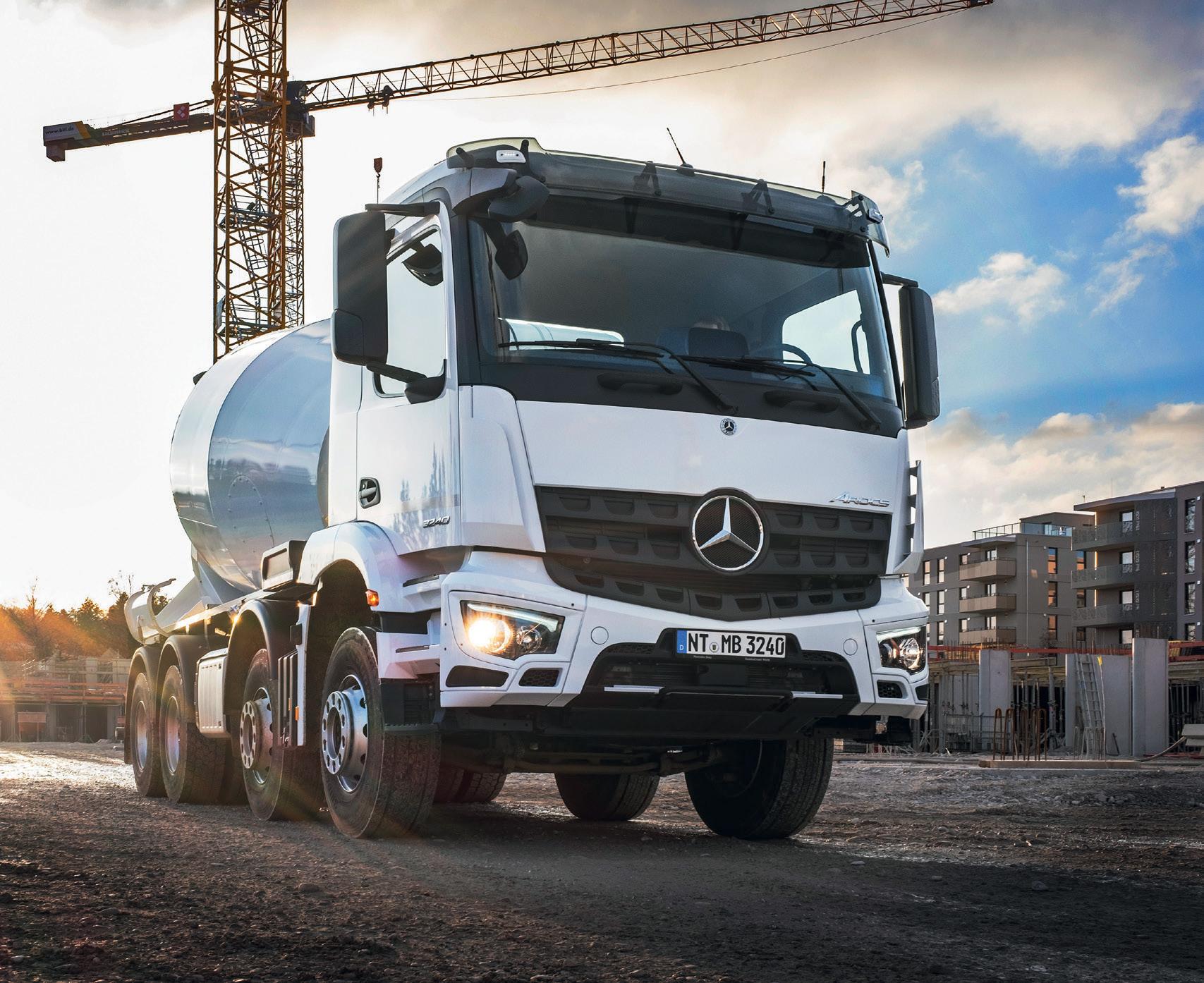
BACKBONE OF THE REGION
Mercedes-Benz Trucks has traditionally held a strong presence in the region, with models like the Actros and Arocs forming the backbone of many Gulf fleets.
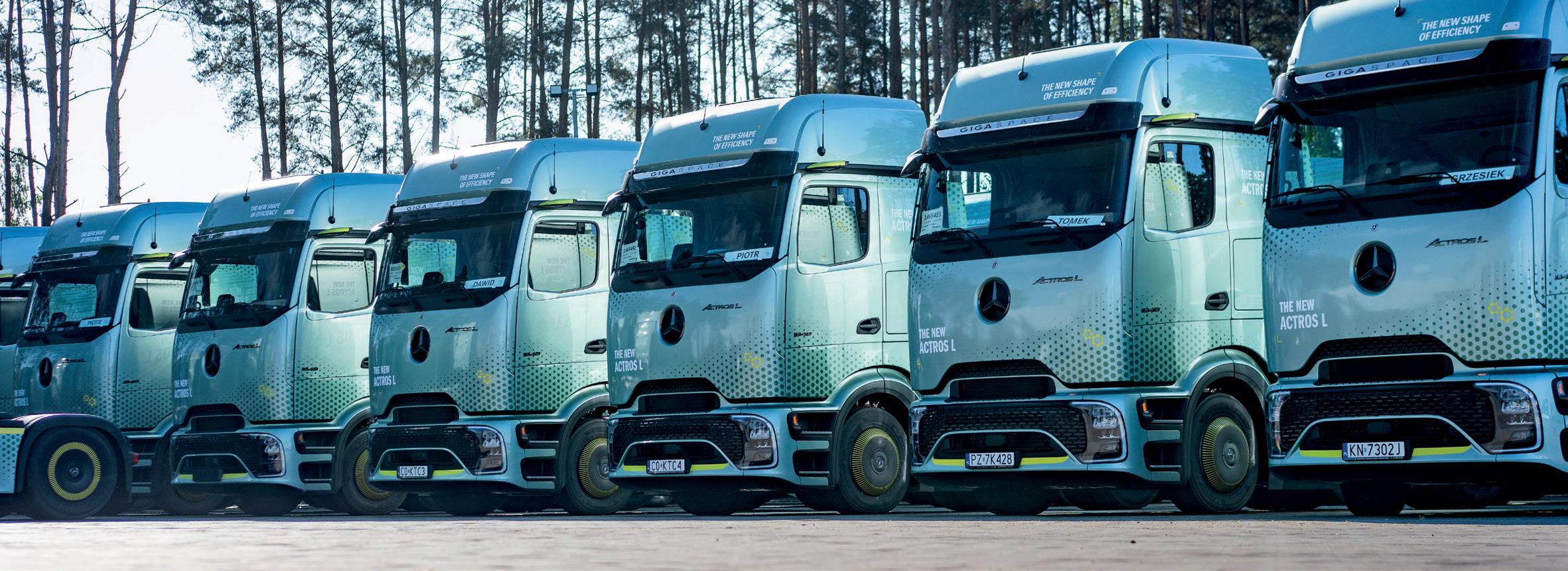
in Q2 (38,294 units), though H1 was down 10%. Daimler Buses also showed strength, with 7,027 units sold in Q2 (+5%) and 13,233 in H1 (+8%), buoyed by Europe and Brazil.
Zero-Emission Vehicles: Strong Growth from a Small Base
One bright spot in Daimler Truck’s results is the sharp rise in zero-emission vehicle (ZEV) deliveries. In Q2 2025, sales of ZEVs surged 90% year-on-year to 1,232
GROWTH WITH CAVEATS
We expect to achieve 10 to 12% profitability for 2025 ”
units. For the first half of the year, deliveries reached 1,991 units, an increase of 36%.
Although ZEVs still represent only a fraction of total sales, the momentum underscores growing demand for electric and hydrogen-powered trucks. Regulatory pressure, customer sustainability commitments and the need to decarbonise fleets are all accelerating adoption.
Another major milestone in Q2 was the June 10 signing of definitive agreements to integrate Mitsubishi
Fuso Truck and Bus Corporation with Hino Motors Ltd., alongside Toyota Motor Corporation. The move, already approved by Daimler Truck’s supervisory boards, will consolidate operations in Asia and streamline development.
As a result of the agreement, both Fuso and Hino are now classified as “discontinued operations” on Daimler Truck’s balance sheet. The transaction, still subject to regulatory and shareholder approvals, is expected to reshape Daimler Truck’s
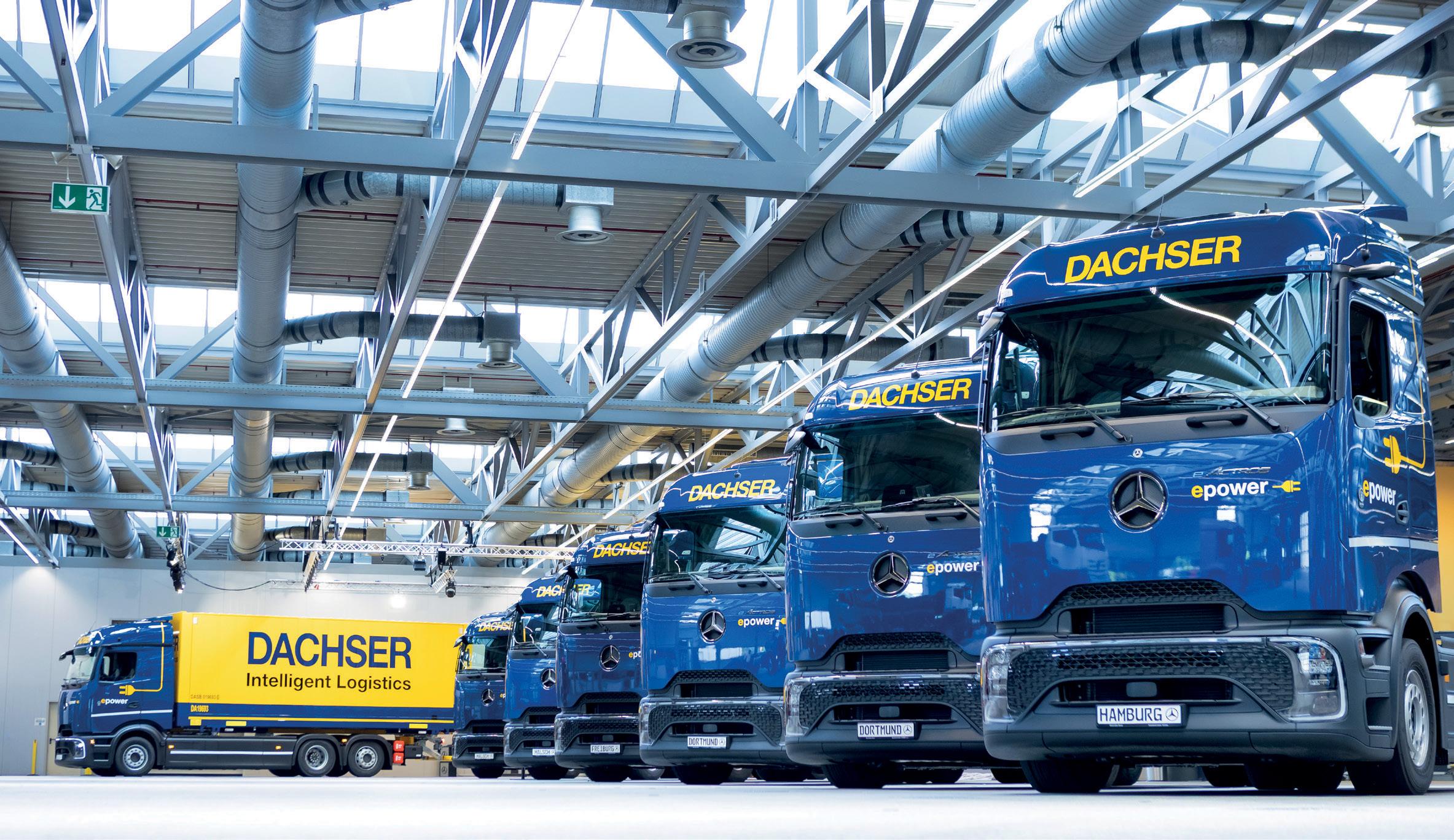
Daimler Truck is wrestling with softer global demand, higher transformation costs, and restructuring in Europe, even as it grows its foothold in Asia, Latin America, and zero-emission vehicles.
Asian footprint and strengthen its strategic partnership ecosystem with Toyota.
Macro-Economic Backdrop
Global economic stability in H1 2025 was clouded by tariffs and trade policy uncertainty, particularly in the US, where GDP growth slowed to 2% in Q2 and inflation crept up to 2.7%. The Federal Reserve has held rates steady at 4.25–4.50%.
The eurozone fared slightly better, with GDP growing 1.4% in Q2 and inflation stabilising at 2.0%, supported by the European Central Bank’s 2% deposit rate.
Still, these trade and inflation dynamics have directly fed into truck market demand, especially in North America and Europe.
Investment and R&D: Transformation Costs Bite
Daimler Truck invested €166 million in property, plant, and equipment in Q2 and €351 million in H1, both below last year. However, R&D expenditure rose to €617 million in Q2 and €1,194 million in H1, reflecting the company’s push into electrification and digitalisation.
This does not include a special €218 million non-cash charge from derecognising capitalised development costs, reflecting slower-than-expected transformation timelines in certain projects.
Middle East Angle: Opportunities Amid Global Pressures
While Daimler Truck grapples with weaker demand in North America and Europe, the Middle East offers a different story. Fleet operators in the GCC are expanding capacity to meet the demands of mega-projects such as NEOM, the Red Sea development, and major logistics hubs in Saudi Arabia and the UAE.
Despite a disappointing pick up in demand during 2025, as some of those projects stalled, they will likely generate demand for heavy-duty trucks and buses, particularly in construction, logistics, and industrial transport for years to come.
Mercedes-Benz Trucks has traditionally held a strong presence in the region, with models like the Actros and Arocs forming the backbone of many Gulf fleets. The global slowdown in Western markets could encourage Daimler Truck to sharpen its focus on high-growth regions like the Middle East, where infrastructure and industrial expansion
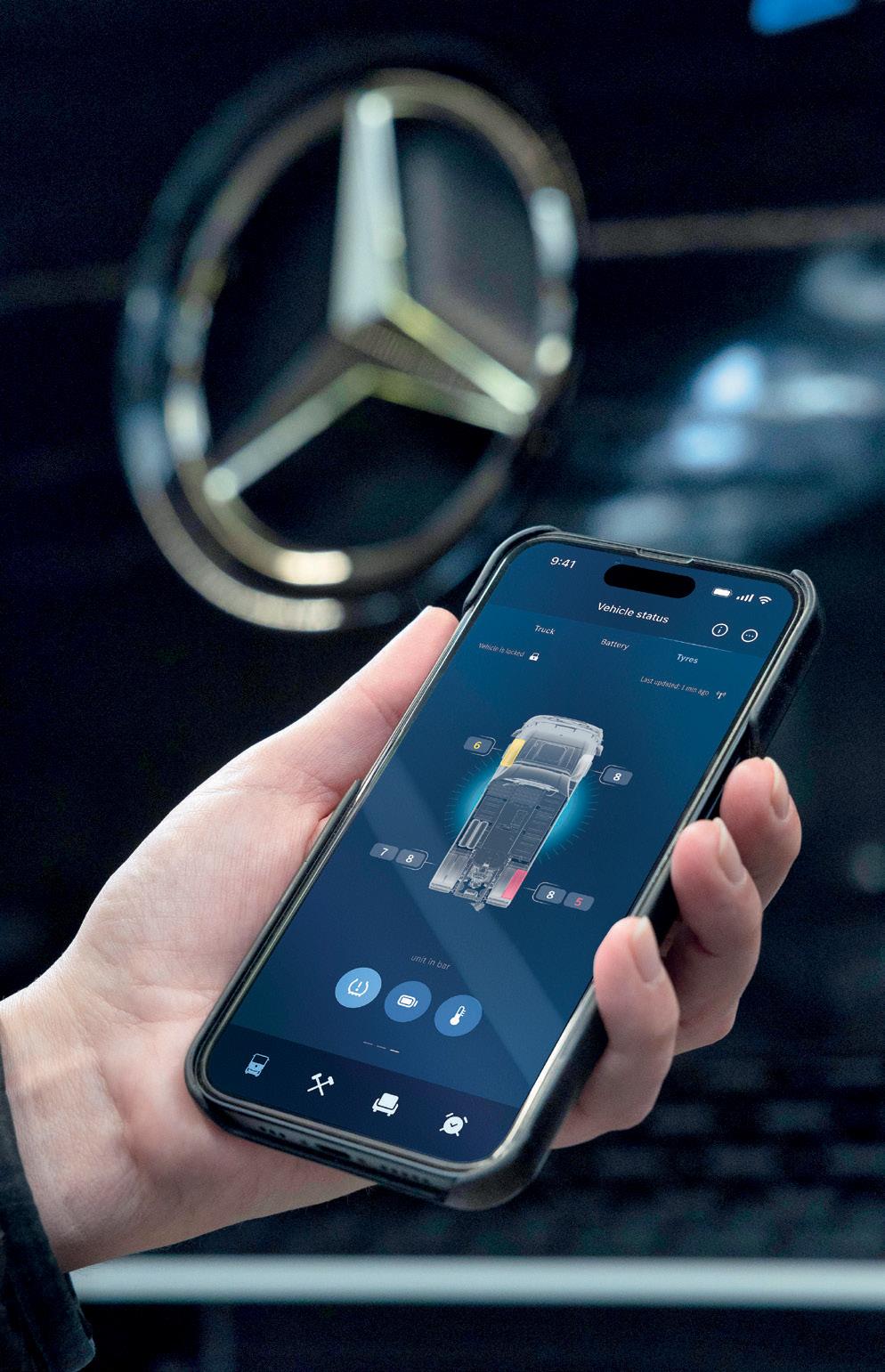
remain central to government visions.
The rise of zero-emission trucks is also relevant to regional strategies. Both Saudi Arabia and the UAE have set ambitious decarbonisation goals under Vision 2030 and Net Zero 2050 respectively. As Daimler Truck scales up its ZEV production, the Middle East could emerge as a testbed for heavy-duty EV and hydrogen trucks, supported by investments in green hydrogen and charging infrastructure.
However, it could also prove to be one of
We are focused
on strong cash generation through year-end”
the biggest casualties of the wave of Chinese imports into the market. This is not a unique challenge for Daimler Truck, but when you are at the top there is only one place to go.
Outlook: A Year of Adjustment
Daimler Truck’s 2025 trajectory reflects a transition year. The company is wrestling with softer global demand, higher transformation costs, and restructuring in Europe, even as it grows its foothold in Asia, Latin America, and zero-emission vehicles.
The revised guidance acknowledges these pressures but still suggests resilience, particularly with a robust pipeline in electrification and the upcoming synergies from the Fuso–Hino integration.
One of the big takeaways is the group’s success in Asia. For instance, its recovery in Indonesia could be easily missed among the numbers, but this is a big win, even as the Global Times reports that Indonesian coachbuilders, for instance, are warning that duty-free Chinese truck imports are eroding market share and threatening local manufacturing.
For Middle East fleet operators, the report highlights two key takeaways: the near-term challenges in global supply may affect availability and pricing, but long-term, Daimler Truck’s pivot to zero-emission technology and its continued strength in construction and logistics vehicles should align directly with the region’s industrial and sustainability ambitions.
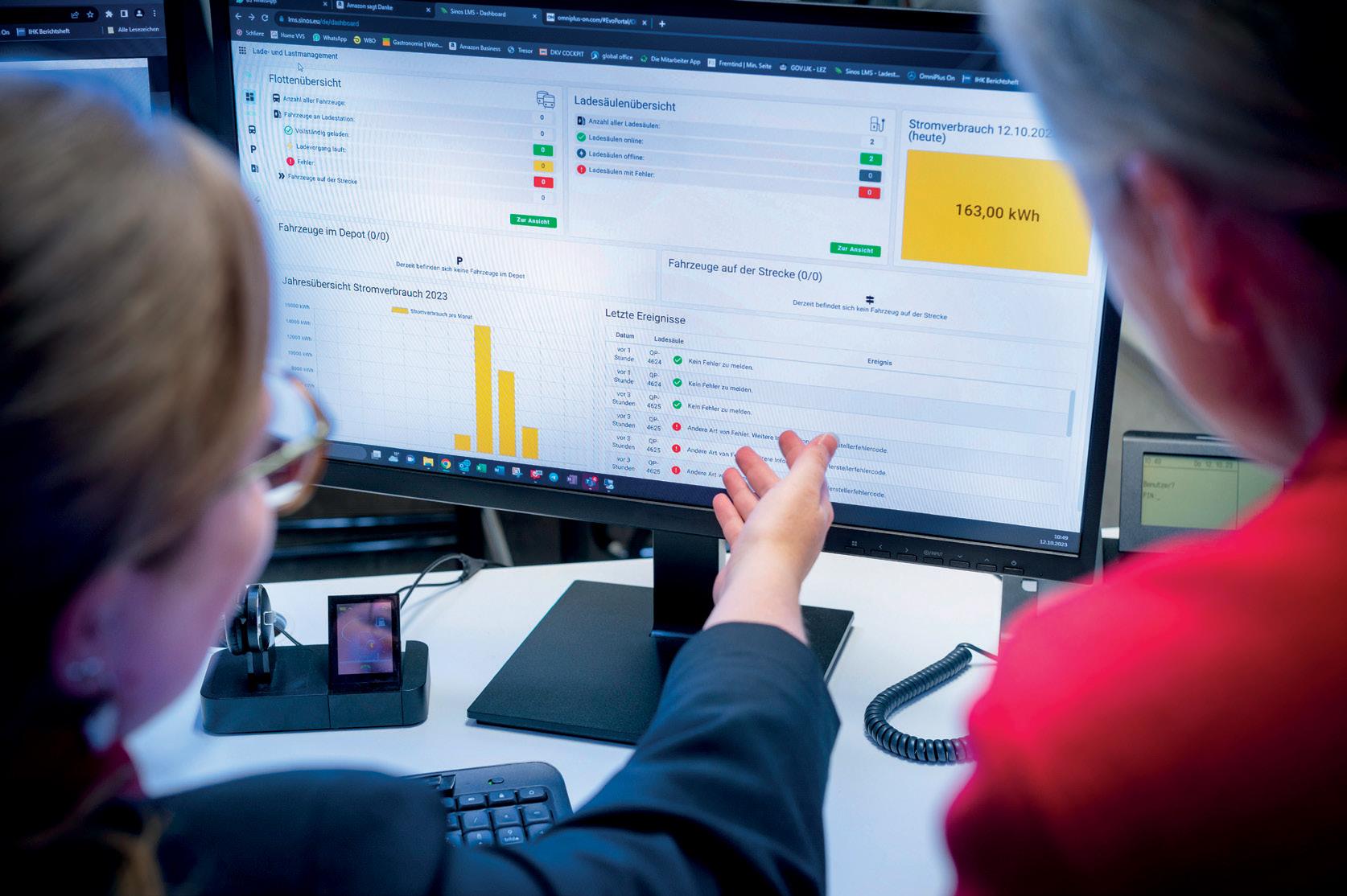
BACKBONE OF THE REGION
Mercedes-Benz Trucks has traditionally held a strong presence in the region, with models like the Actros and Arocs forming the backbone of many Gulf fleets.

Region becomes the first to get MyNissan Ownership features WORKSHOP
A NEARBY NISSAN DEALER AND SEARCH FOR LOCAL EVENTS
SERVICING
Nissan has introduced its nextgeneration Connected Car Services 2.0 (CCS 2.0) across the entire Patrol line-up in the Middle East, including the newly launched PRO-4X and NISMO editions.
The move brings enhanced digital features to the region, including the global debut of the MyNissan Ownership function within the MyNissan app. This new feature allows customers to book service appointments, schedule test drives, locate dealers, and find nearby attractions directly from their smartphones.
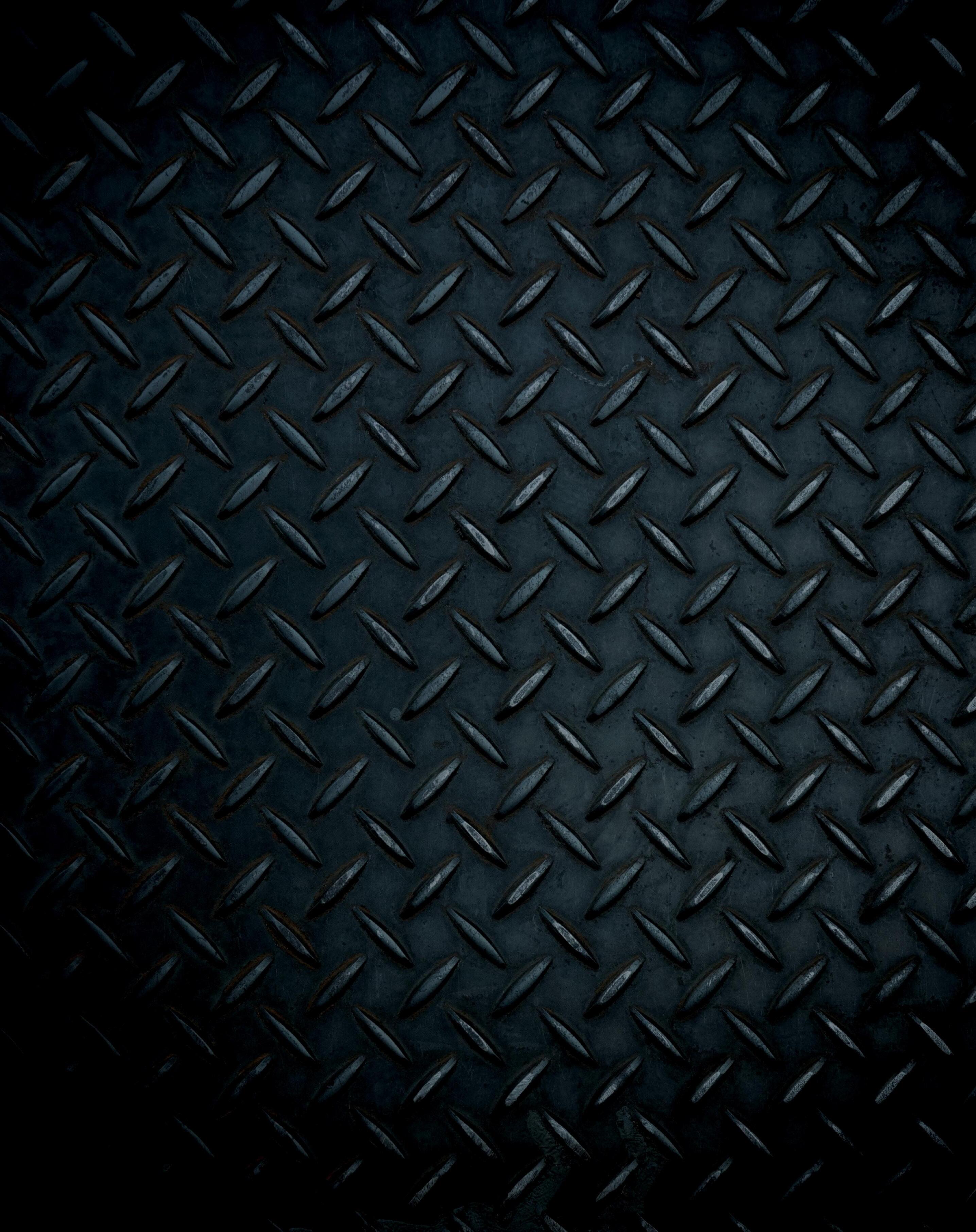
Thierry Sabbagh, Divisional Vice President and President –Middle East, KSA, CIS – Nissan and INFINITI, said: “With the all-new Patrol, we have elevated the connected driving experience across every touchpoint, from CCS 2.0 enhancements to the expanded capabilities of the MyNissan app.
He continued: “As we continue rolling out the app, our goal is to unify and simplify how our customers interact with their vehicle and with Nissan.”
Through CCS 2.0, Patrol owners can remotely lock or unlock their vehicles, start the engine, pre-set cabin
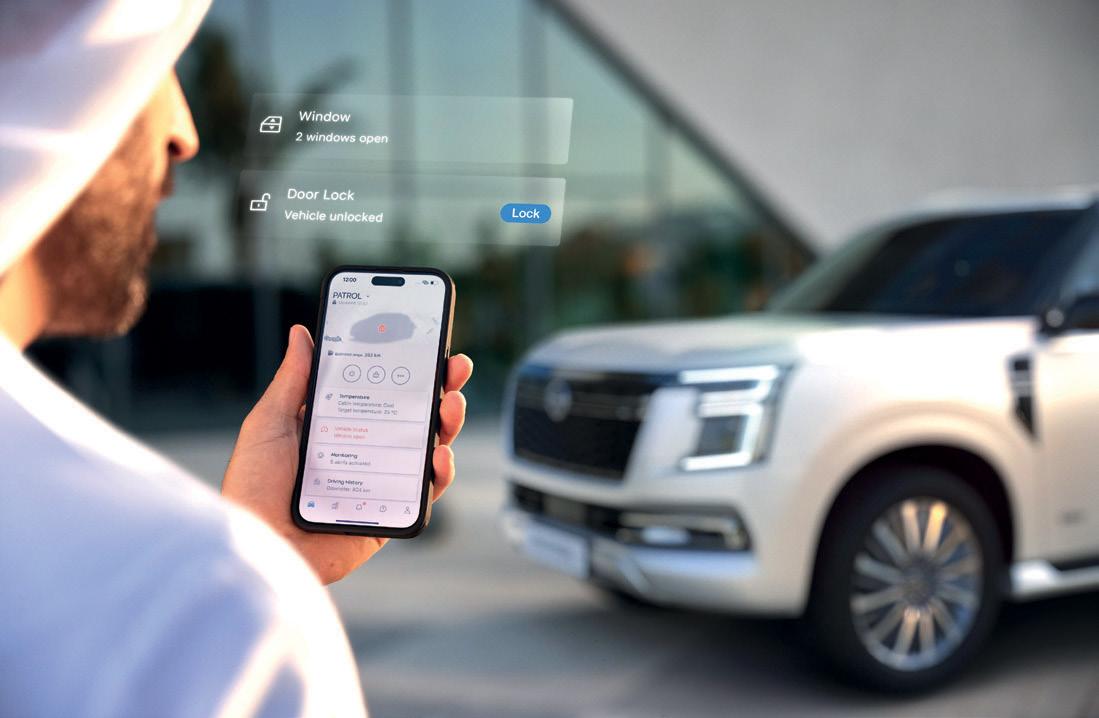
temperature, and monitor the status of doors, windows, and the trunk.
The upgraded system also delivers live vehicle health updates to owners, covering components such as the battery, oil pressure, tyres, and airbags.
The Patrol is also the first Nissan in the region to feature Google built-in, giving drivers access to Google Maps, Google Assistant, and Google Play via a 28.6-inch display, backed by an embedded internet connection. Wireless Apple CarPlay and Android Auto are also standard.
The upgraded services are now live across Patrol models in the UAE and Saudi Arabia, with further rollouts to additional models and markets planned as part of Nissan’s wider digital strategy.
The firm also entered into a partnership with U.S.-based LiCAP Technologies, Inc., for the development of production process technology for the cathode electrode of all-solid-state batteries (ASSB) last month. Developing a dry electrode production process for cathode electrode is highly beneficial for the smooth production and commercialization of ASSBs.
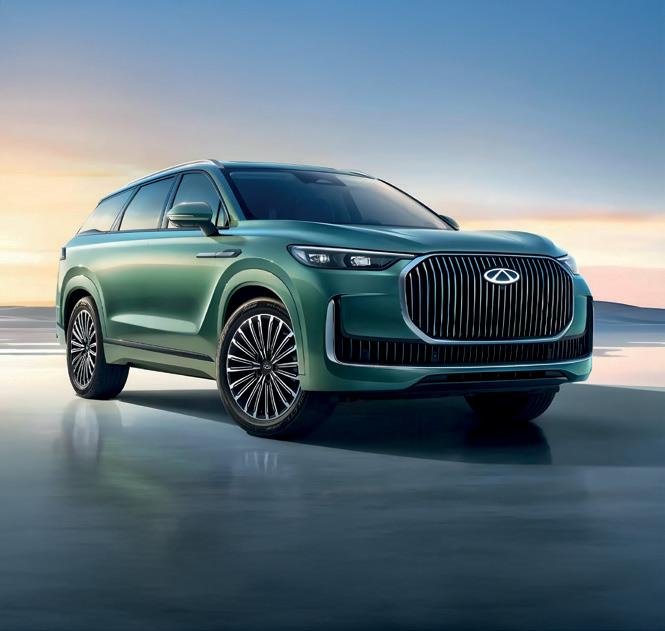
CHERY UAE SHOWCASES
TIGGO 9’S TOPTIER CRASH TEST PERFORMANCE
BODYSHOP
Chery UAE, in collaboration with its local partner AWR Group, has highlighted the exceptional safety credentials of its flagship SUV, the Chery TIGGO 9, following a series of rigorous Euro NCAP-standard crash tests.
The latest full-frontal crash test, conducted at Chery’s cutting-edge safety lab in China, simulated a highseverity collision at 50 km/h into a rigid barrier. The TIGGO 9 demonstrated no deformation to the A-pillar or door frames and full activation of its advanced restraint system. Both front and rear test dummies registered zero critical injuries, a strong indicator of the SUV’s occupant protection capabilities. The SUV has also passed the Euro NCAP’s Mobile Progressive Deformable Barrier (MPDB) and Side Mobile Deformable Barrier tests at 50 and 60 km/h respectivel.
INSIDE THIS MONTH’S WORKSHOP: WILL THERE BE SHANGHAI SURPRISES AT AUTOMECHANIKA THIS YEAR?, THE HISTORY OF FIRESTONE, AND MORE!
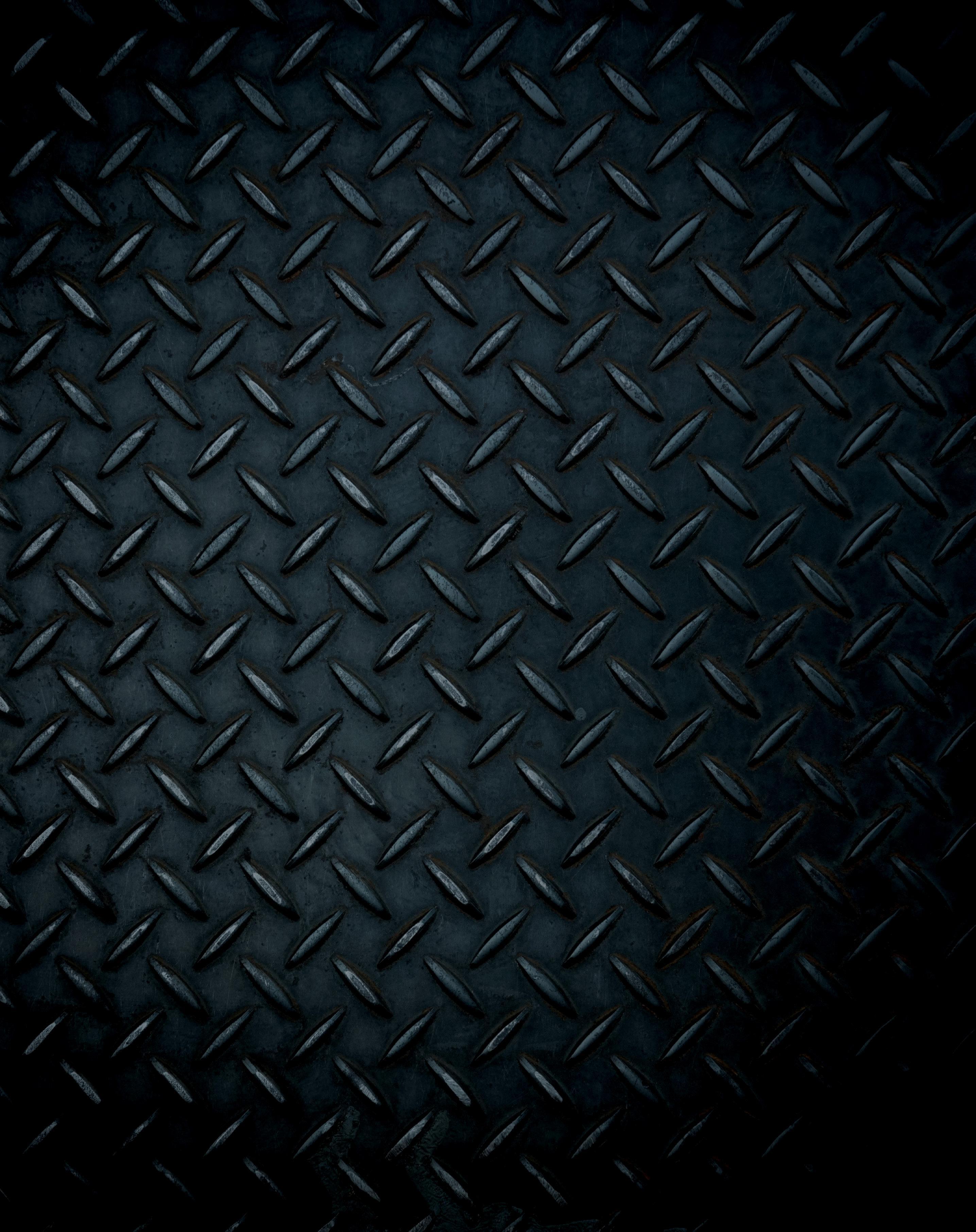

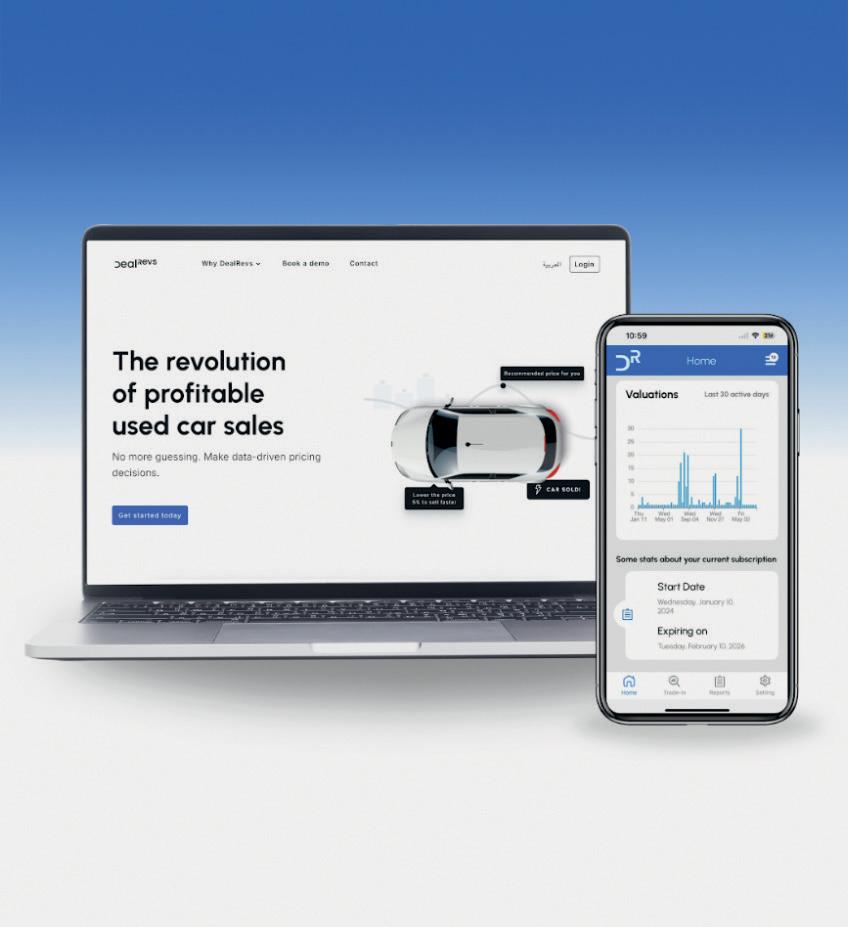
AUTODATA MIDDLE EAST LAUNCHES AI-POWERED INTELLIGENCE SUITE
PARTS
AutoData Middle East has unveiled a next-generation suite of datadriven intelligence tools designed to address pressing challenges in the region’s auto insurance and used car sectors. The launch comes at a time when UAE insurers and consumers are grappling with rising premiums, inconsistent valuations, and data blind spots—particularly for electric and grey-import vehicles.
Built specifically for the GCC market, the new suite introduces four integrated platforms: the AI Valuation Engine, Risk Coefficient, Claim Hub, and DealRevs. Together, these tools offer insurers, dealerships, and digital marketplaces greater pricing accuracy, improved risk assessment, fraud prevention, and enhanced operational profitability.
Sebastian Fuchs, Managing Director of AutoData Middle East, said: “You cannot make strong decisions with partial information—yet that is how much of the industry still operates. This suite is the result of years of market observation and innovation, giving our partners the visibility, speed, and precision they need.”
The AI Valuation Engine delivers real-time used car pricing tailored to the GCC. Trained on more than 100 million data points from both live and historical transactions, the engine provides highly accurate, bi-weekly pricing updates that reflect real market conditions.
SCANIA AND TK CREATE E-FLEET USING BEV TECH
TRAILERS
Thermo King says that Danish foodservice distributor Dansk Cater A/S has successfully deployed a fleet of new fully electric Scania Regional trucks equipped with e-adapted Frigoblock EK refrigeration units.
Dansk Cater operates a fleet of more than 300 vehicles nationwide, supplying temperature-sensitive goods to restaurants, schools, and universities. The latest Scania battery-electric vehicles (BEVs) will serve selected inner-city and regional routes in and around Copenhagen, delivering quiet, zero-emission operations both day and night.
The Frigoblock EK units have been specifically upgraded for Scania’s latest electric truck platform, ensuring high efficiency while meeting safety and technical requirements. Thermo King worked closely with Scania and
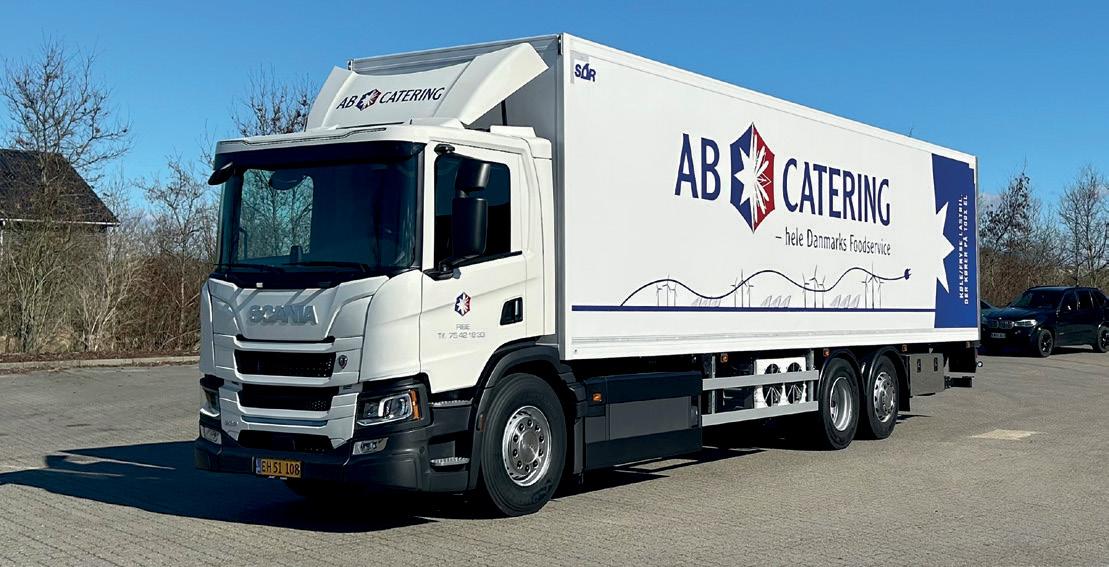
Danish dealer Im. Stiholt A/S to fully integrate the refrigeration system into the trucks’ high-voltage architecture. According to Thermo King, the e-adapted units maintain the same multi-temperature cooling performance as diesel-powered models, while an undermount configuration and reduced power draw further lower noise levels—an important factor for urban deliveries.
“Our priority was to achieve emissions and noise reduction without sacrificing reliability or cooling capacity,” said Kim Christiansen, transport manager at Dansk Cater. “Thanks to Thermo King’s tailored solution and collaboration with Scania, we can operate a fully electrified fleet in urban areas without disrupting customers or local communities.”
ICAUR UNVEILS V27 AND 03T HYBRID SUVS
POWERTRAINS
iCAUR has unveiled two new SUV models — the V27 and 03T — as part of an agressive expansion strategy into the Middle East in the UAE. Both SUVs adopt advanced range-extended electric vehicle (REEV) powertrains that offer extended driving range and stable performance, particularly suited to Middle Eastern terrain and travel distances. The V27, iCAUR’s first mid-to-large SUV, merges rugged retro styling with modern functionality.
At over 5 metres long and nearly 2 metres wide and tall, it presents a commanding road presence. Its golden REEV system delivers consistent, terrain-ready power while eliminating range anxiety for long journeys.
The 03T, meanwhile, is a compact yet capable SUV featuring a segmentleading intelligent all-wheel-drive (i-AWD) system. Designed around a lightweight, all-aluminum multicavity cage structure, it comes with 11 active safety features and dynamic
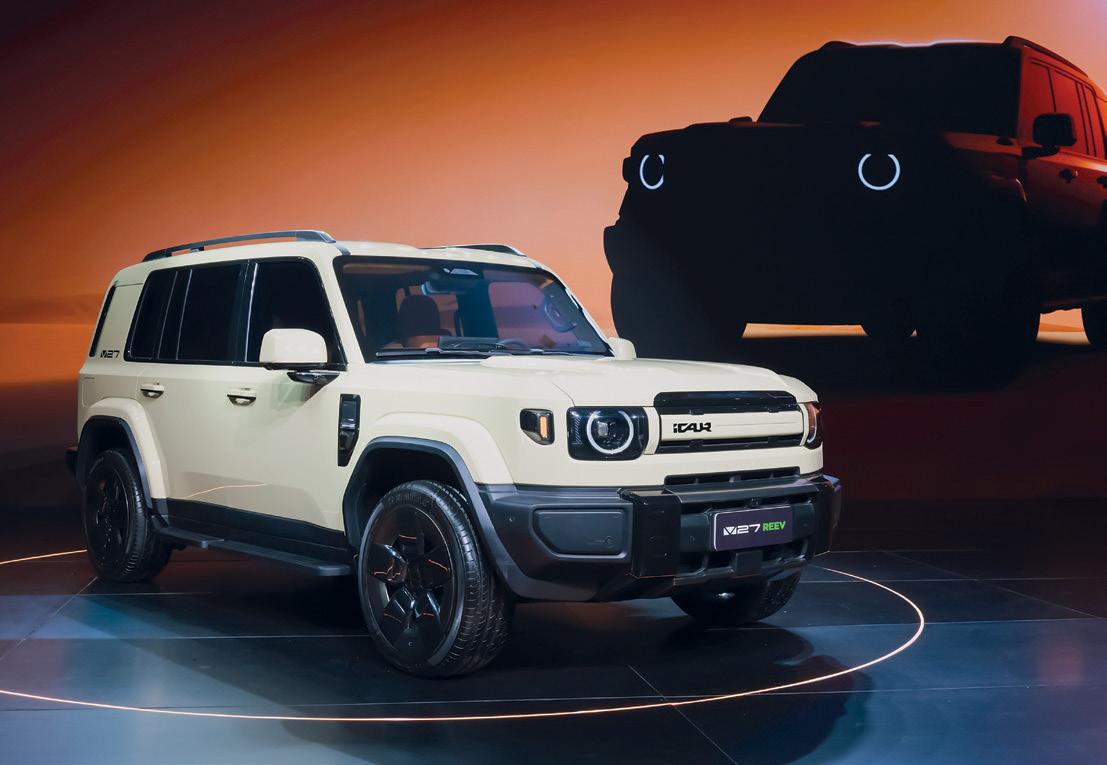
power distribution, ensuring a secure and engaging driving experience. Built around a flexible hardware platform, the brand’s vehicles support three interchangeable configurations—pickup, convertible, and space-exploration themed variants. These custom builds are enabled by quick-release panels, LEGO-style lighting modules, and over 100 plug-and-play accessories.
Adding to the futuristic concept, Chery introduced integration with its AiMOGA humanoid AI robot.
Capable of interacting with users and adapting to mobility and lifestyle demands, the robot highlights iCAUR’s ambition to build a highly personalised, intelligent ecosystem.
Chery has confirmed that iCAUR is targeting the UAE, Qatar, and Bahrain for its initial launch phase by the end of 2025.
Speaking at the event, Mr. Zhang Xiaolong, General Manager of Chery International Middle East, revealed that the brand has already established cooperation agreements with three major regional distributors.


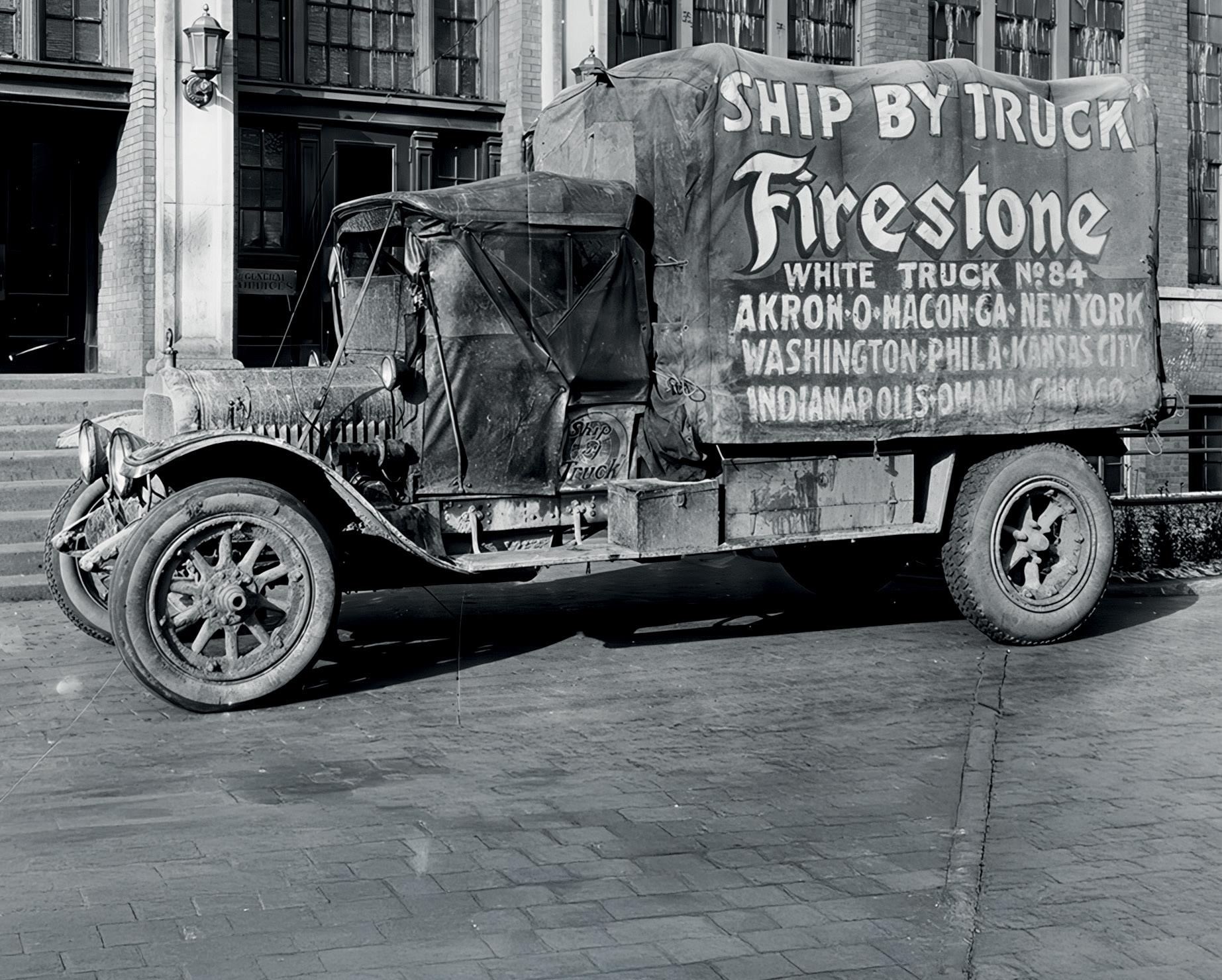
FIRING UP AN INDUSTRY
T&FME looks at Firestone’s legacy of helping others to help themselves
When Harvey S. Firestone founded the Firestone Tire and Rubber
Company in Akron, Ohio, on August 3, 1900, he could scarcely have imagined that his name would become one of the most enduring brands in global mobility. His idea was simple but transformative: provide “extra quality and extra value at no extra cost.” That ethos, rooted in reliability and innovation, has carried Firestone from its humble beginnings to its position today as a household name and a global leader.
Now, as Firestone marks 125 years of history, the company is celebrating not just a brand but a legacy that helped shape modern transportation — from farming and freight to motorsport and passenger cars.
The turn of the 20th century was a time of extraordinary invention. Automobiles were moving from curiosities to mass-market products, and Harvey Firestone recognised tyres would be the key. With a small team in Akron — then the tyre capital of the United States — Firestone began producing tyres that quickly gained a reputation for dependability.
His genius was not only in the product but also in vision. By 1919, he launched the “Ship by Truck” movement, championing the role of commercial vehicles in freight transport at a time when railroads still dominated. This movement pushed governments to improve road networks and paved the way for the trucking industry we know today.
In 1920, Firestone patented the gumdipping process, coating cords in rubber to strengthen tyres and extend their life. This innovation made tyres more durable
Harvey S. Firestone was a pioneer whose life, legacy and commitment to customers remain engrained in our DNA today”
than ever before, a crucial advance for the growing number of motorists.
In 1932, Firestone turned his attention to agriculture with the “Put the Farm on Rubber” campaign, introducing the first pneumatic tractor tyre. It revolutionised farming by replacing steel wheels with rubber, dramatically improving efficiency and comfort for farmers.
Harvey’s vision was also informed by his friendships with other American innovators. Alongside Henry Ford, Thomas Edison and naturalist John Burroughs, he embarked on annual road trips as part of the “Four Vagabonds”. These journeys across America’s wilderness highlighted the possibilities of mobility and adventure, reinforcing Firestone’s belief in tyres as enablers of freedom.
When Harvey Firestone passed away in 1938, he left behind not just a thriving company but also a philosophy of
continuous improvement and customer focus that still defines the brand.
Following Harvey’s death, Firestone entered its second great chapter. By the mid20th century, Firestone tyres were standard on millions of vehicles, and the brand was synonymous with American progress.
In 1938, Firestone engineers introduced air spring technology, later branded as Airide, which transformed ride comfort and cargo transport reliability. That innovation carried the company into commercial transport and laid the foundation for its thriving air springs business today.
Firestone also cemented its place in motorsport. Its first Indianapolis 500 win came in 1911, and by the 1950s and 1960s, Firestone tyres were a fixture at the Brickyard and beyond. Motorsports not only elevated the brand’s reputation
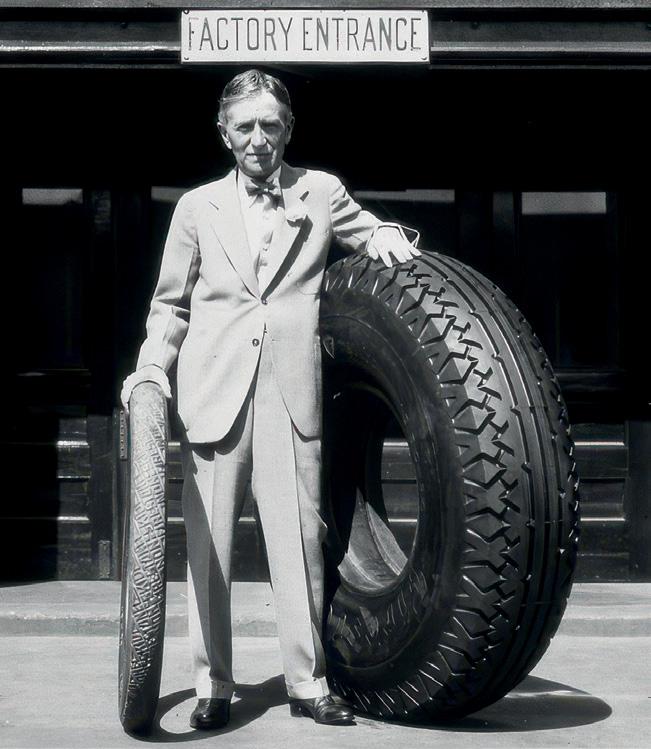
We continuously strive to innovate — improving our customers’ lives with our products, services and solutions”
but also acted as a proving ground for tyre durability, grip and performance.
Through the mid-20th century, Firestone grew globally, exporting tyres, investing in overseas operations, and becoming one of the “Big Four” US tyre makers. Its reputation rested on two qualities: dependability for everyday drivers, and innovation that made vehicles safer and more capable.
Evolving as an Icon
In 1988, Firestone merged with Bridgestone of Japan, creating one of the largest tyre and rubber companies in the world. The move gave Firestone new resources and a stronger international footprint.
Product innovation has remained constant. The launch of the Destination tyre line in the 2000s cemented Firestone’s position in the SUV and light truck market, appealing
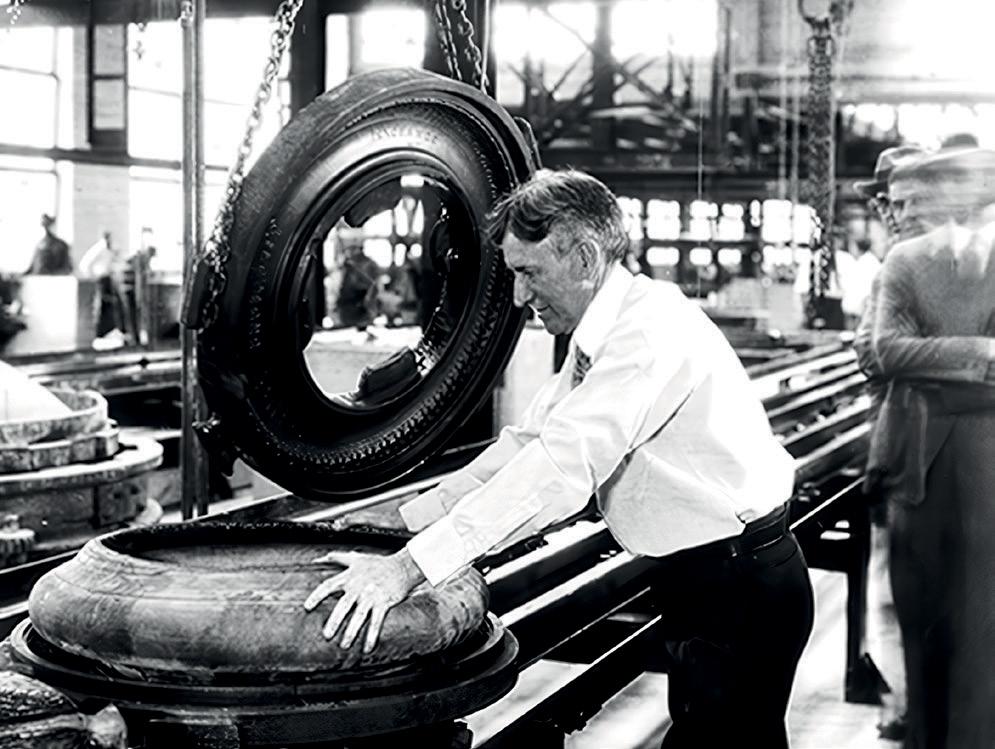
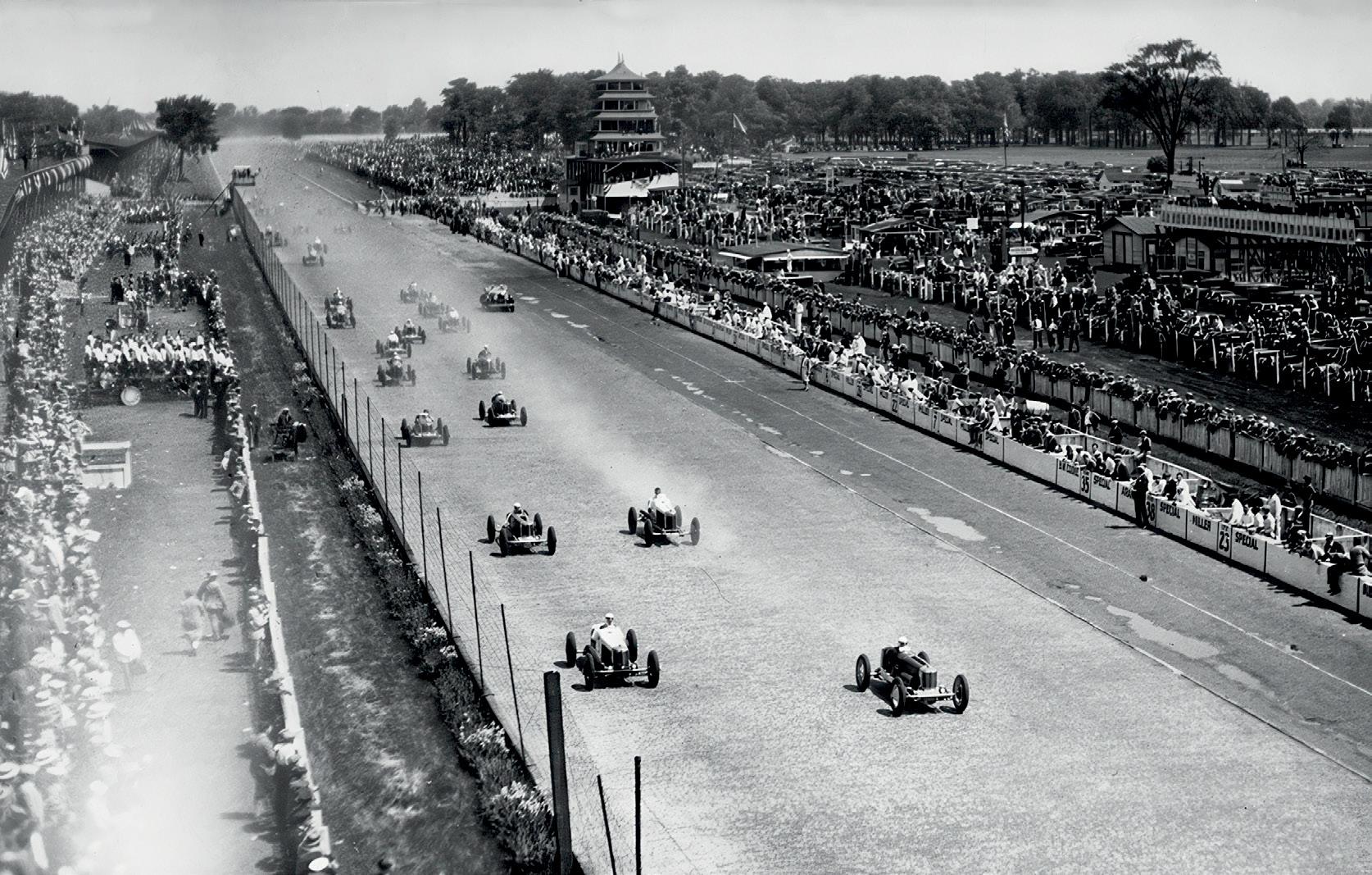
to drivers who demanded both on-road dependability and off-road confidence.
Through it all, Firestone never lost touch with its origins. The spirit of the “Four Vagabonds” continued to inspire campaigns and products aimed at the adventurous, the hardworking, and the everyday driver seeking confidence in every journey. The brand’s essence remains unchanged: a belief that every driver, in every country, should be able to rely on tyres that perform in every condition. Or, as Harvey Firestone himself once put it: “The greatest pleasure is in doing something to help others to help themselves.”
The 125th anniversary is both a commemoration and a launchpad. As Bridgestone Americas and Firestone look toward 2026 and beyond, the focus is firmly on innovation, sustainability, and supporting the next generation of mobility.
A YEAR OF CELEBRATION
The Firestone’s 125th anniversary will be marked through to August 2026.
Vagabonds Expeditions: Off-road adventures with storytellers in the backcountry of America, echoing Harvey Firestone’s journeys with Ford, Edison and Burroughs. The first took place in Wyoming’s Bighorn National Forest, one of the least populated regions in the US, celebrating durability and confidence on the road less travelled.
New Product Launches: Firestone will roll out a slate of new tyre solutions across consumer replacement and commercial segments between late 2025 and 2026.
INDYCAR Racing Celebrations:
Firestone’s motorsport heritage will be highlighted throughout the 2026 NTT INDYCAR SERIES season, with special anniversary activations around the 110th Indianapolis 500 on May 24, 2026.
Trade Show Engagements:
At major industry events Firestone will showcase its products and host immersive experiences.
AN OLD STORY WITH NEW PRODUCTS ON THE WAY
Bridgestone America will be celebrating the heritage of Firestone throughout the next year but it will also introduce a range of new products designed to continue pushing the boundaries of performance and reliability.
ADVANCING TRAILERS
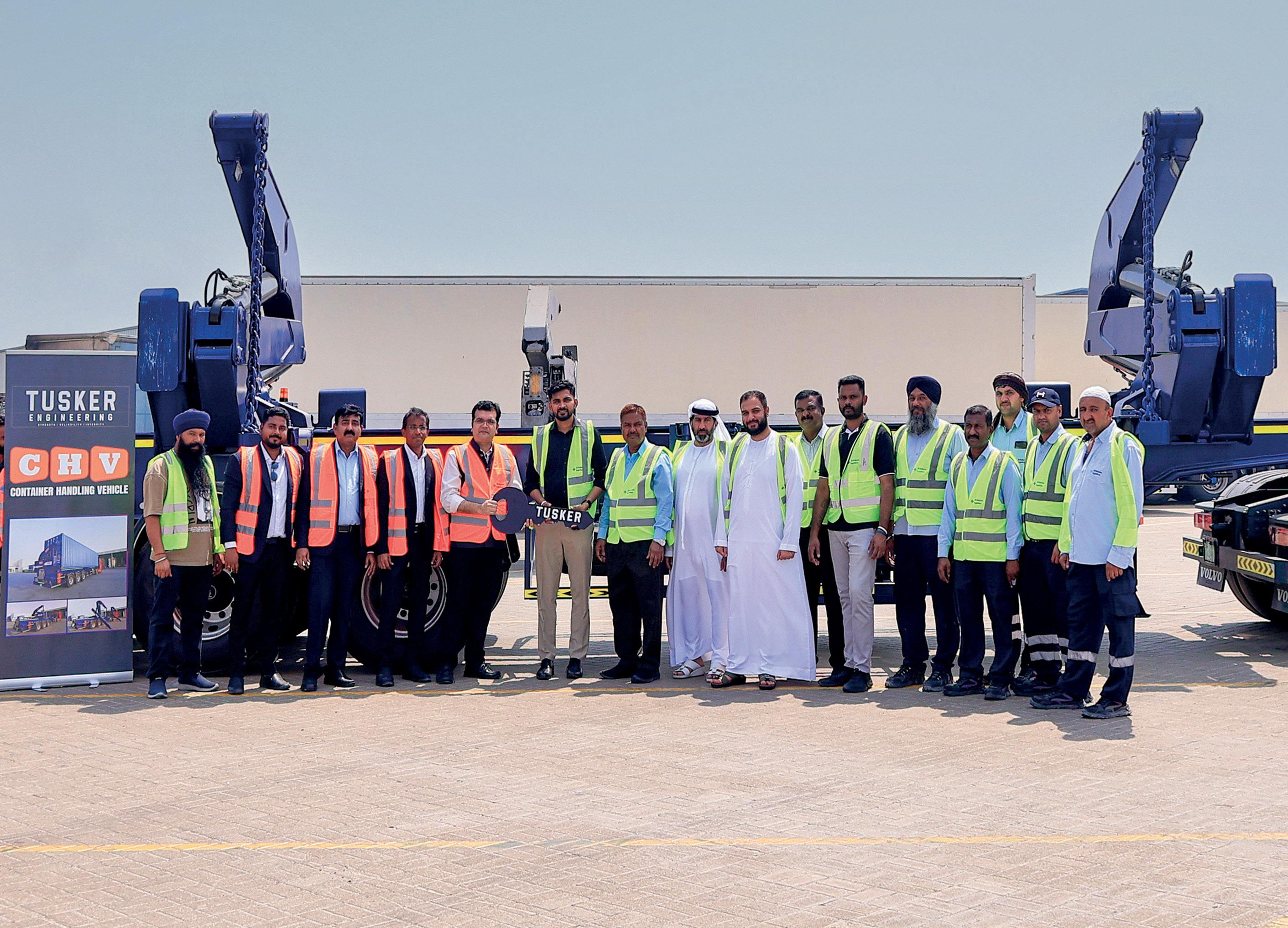
Tusker Engineering FZC delivers UAE’s only local-manufactured container side loader semi-trailer to Al-Futtaim Logistics
Tusker Engineering
FZC is proud to announce the successful delivery of a container side loader trailer (CHV) to Al-Futtaim Logistics — underscoring Tusker’s unique position as the UAE’s only local manufacturer of container side loader semi-trailer.
Designed and engineered in the UAE, the delivered trailer reflects Tusker’s commitment to providing high-quality, efficient, and innovative solutions for the logistics and cargo handling industry. Available in 20 FT, 40 FT, and 45 FT configurations, Tusker’s Container Handling Vehicles (CHVs) are built to meet a wide range of container transport needs, offering options in both Power Take-Off (PTO) and Diesel Engine Power Pack models for maximum flexibility and performance.
The unit delivered to Al-Futtaim Logistics is equipped with a state-of-
the-art photoelectric sensor, allowing for precise container alignment during loading and unloading. This advanced feature ensures safer and more accurate operations, reducing downtime and increasing overall efficiency.
Speaking on the occasion, Mr. Rohit Ramsinghani, Managing Director of Tusker Engineering FZC
said “This milestone delivery reflects our ongoing mission to support the logistics and transportation sector with locally manufactured, worldclass equipment. We are honored to collaborate with a reputable organization like Al-Futtaim Logistics and to contribute to their operational success with homegrown innovation.”
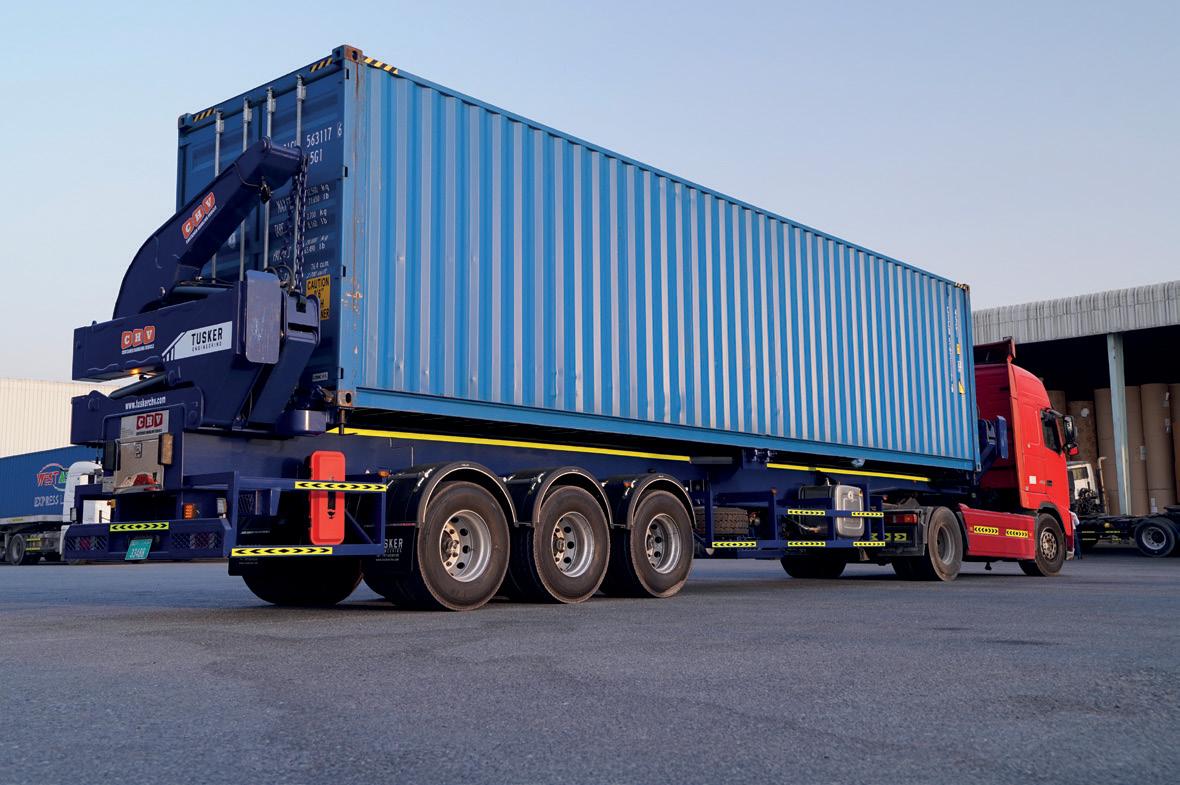
Manufactured in certified facilities to the highest safety and quality standards, Tusker’s CHVs are built for strength, durability, and long-term reliability. These vehicles are trusted across the logistics and transportation sectors for handling standard containers, delivering reliable performance and purpose-built engineering to meet industry demands. With this delivery, Tusker Engineering continues to reinforce its reputation as a trusted partner for forward-thinking logistics operators who value both local expertise and world-class quality.
Tusker Engineering FZC is a UAE-based manufacturer specialising in the design and production of trailers, truck bodies and heavy-duty transport equipment. Known for its innovative approach and commitment to excellence, Tusker provides cuttingedge solutions to a broad spectrum of industries, combining robust engineering with real-world practicality.
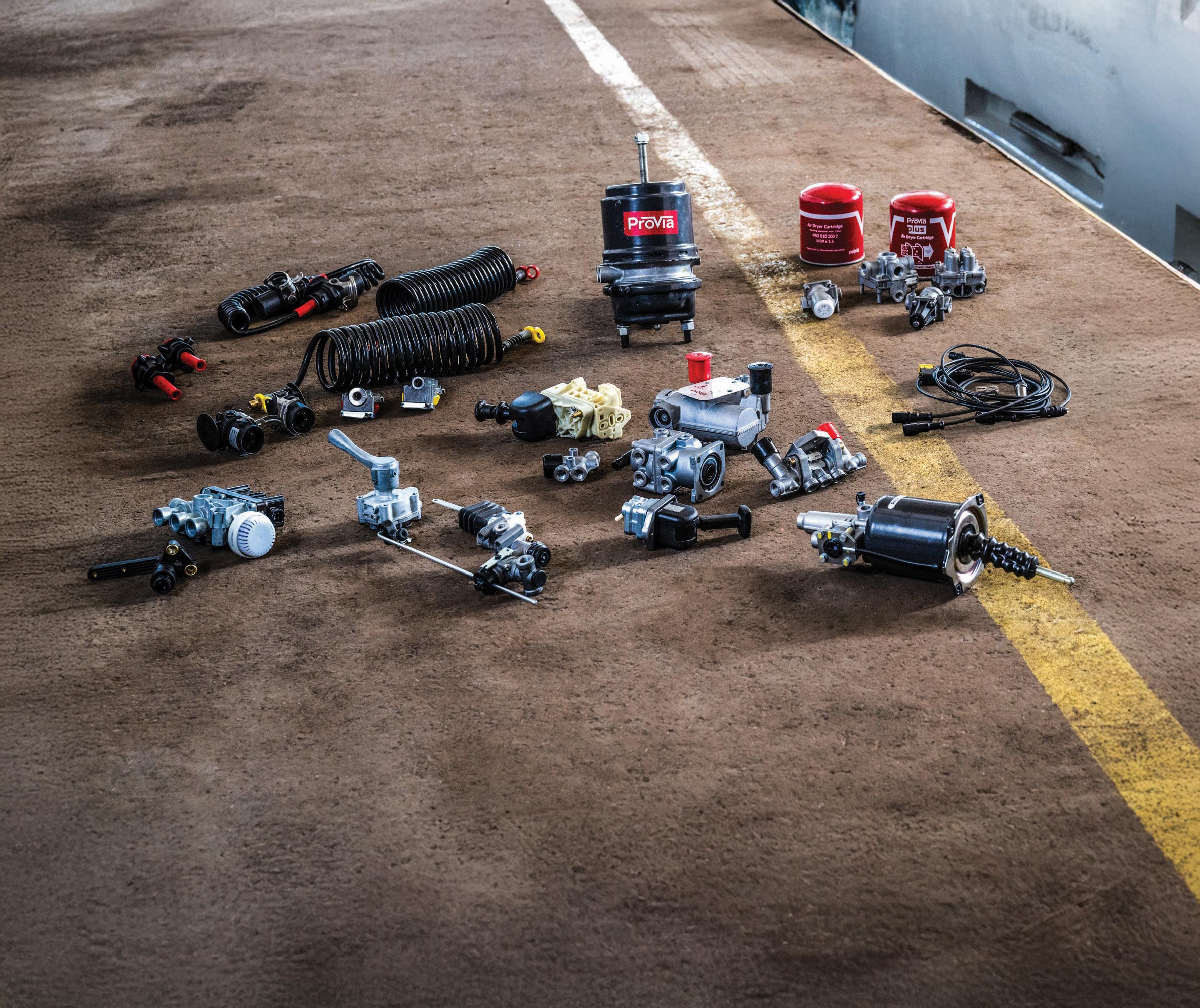
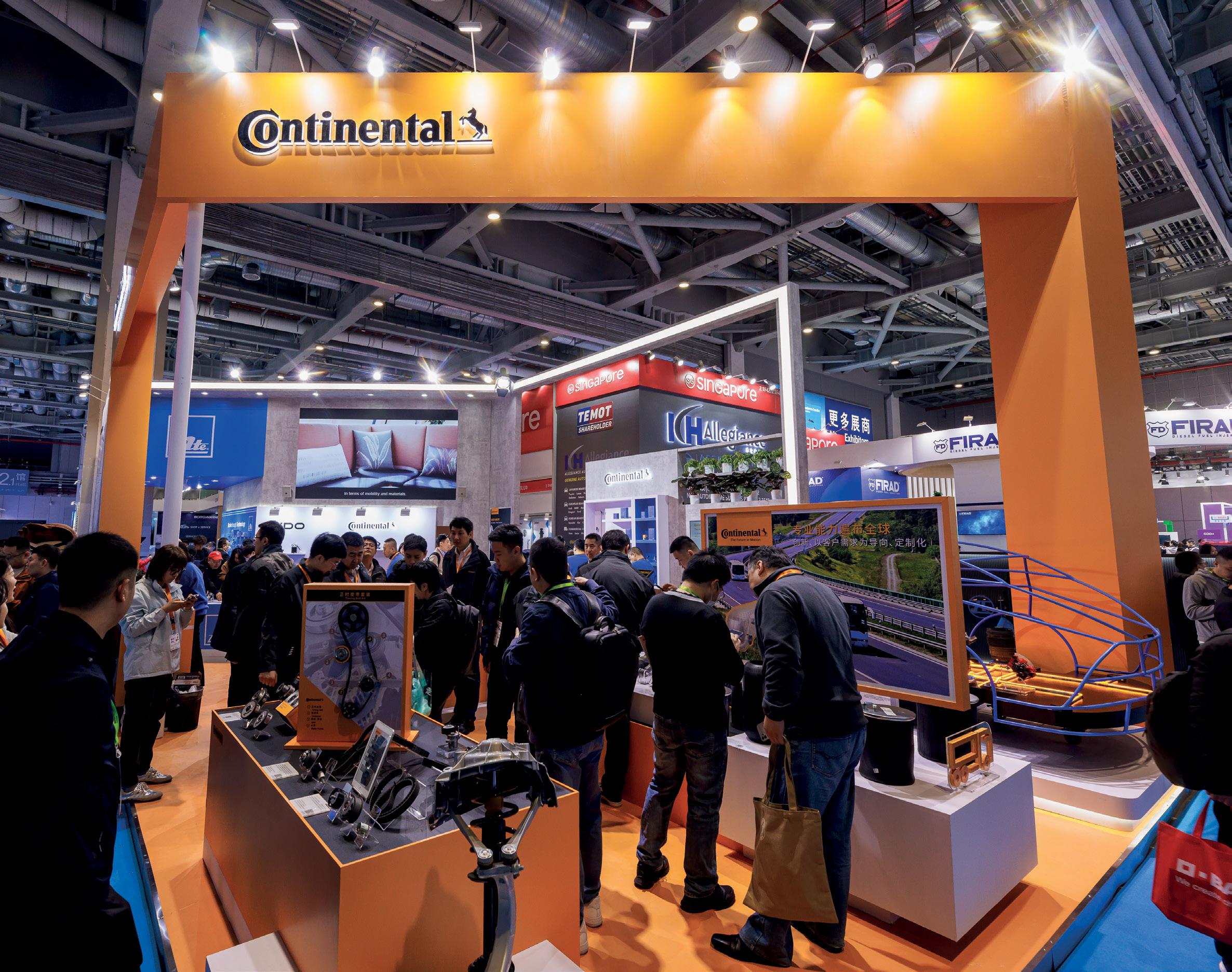
SHANGHAI SURPRISES?
Automechanika Shanghai 2025 should raise the bar for the global-facing
event
China’s position as the world’s largest automotive market makes Automechanika Shanghai one of the most important trade fairs on the global calendar. It is where international suppliers, OEMs, and aftermarket specialists gather not only to sell but to spot the trends that will define mobility over the next decade.
In 2024, the 20th anniversary edition of the show drew a record 6,763 exhibitors and more than 222,000 visitors from 181 countries . The atmosphere was celebratory but also reflective: senior Messe Frankfurt figures including Michael Johannes, Olaf Musshoff, and Fiona Chiew spoke candidly about the need to remain relevant in a postCOVID landscape, the growing complexity of the aftermarket, and the challenge of
attracting new talent. “It’s not just about the numbers — it’s about attracting the right people,” Musshoff told T&FME
This year’s edition — running 26–29 November 2025 — promises to be even bigger. For the first time, Automechanika Shanghai will occupy all 15 halls of the NECC, spanning 383,000 sqm, with 7,000 exhibitors expected. Organisers say more than half will showcase innovations in new energy and connectivity, from EV batteries and hydrogen fuel cells to charging infrastructure and connected-vehicle systems.
Bigger, Broader, Bolder
The New Energy & Connectivity sector alone is expanding by 50% to 39,000 sqm, reflecting China’s position as the world’s leading NEV market. Visitors can expect Innovation4Mobility displays,
Our goal is to ensure that Automechanika Shanghai continues to be a hub for innovation and collaboration”
start-up activations, and scenario-based presentations exploring technologies on the cusp of commercialisation.
The Tyres & Wheels sector is also growing by 50%, spurred by the demands of heavier, faster, and quieter electric vehicles. More than 60 percent of all exhibitors will also cater to commercial vehicles, underscoring the evolving landscape of logistics, transportation and mobility. This is particularly relevant for expanding business channels in emerging markets like those along the Belt and Road.
Meanwhile, the Digital Services / Solutions zone will highlight e-commerce, smart logistics, warehousing, and supply chain management — themes with direct resonance for Middle East distributors and fleet operators.
Commercial vehicles are another priority,
with organisers estimating that 60% of exhibitors will have products and solutions tailored to logistics and transportation.
Like last year, when sustainability and training took centre stage ,Automechanika 2025 will be supported by an extensive fringe programme of around 80 events. The International Automotive Industry Conference will explore supply chain resilience and market dynamics, while the Talent Development Conference will focus on equipping both new and existing professionals with the skills to service next-generation vehicles.
New for 2025, the Technology Seminar Series will bring in global experts to discuss electric drive systems, thermal management, autonomous driving, and new materials.
Why It Matters for the Middle East
For Gulf fleets, distributors, and service providers, the “Shanghai Surprises” lie not only in new products but in the scale of innovation happening in China. With Saudi Arabia and the UAE investing in megaprojects and pushing electrification agendas under Vision 2030 and Net Zero 2050, many of the solutions unveiled in Shanghai — from EV-ready tyres to hydrogen drivetrains — are directly relevant to the region.
As Fiona Chiew noted last year: “Our goal is to ensure that Automechanika Shanghai continues to be a hub for innovation and collaboration.”
With its biggest edition yet, 2025 looks set to deliver on that promise — and offer a few surprises along the way.
With a rising need for safe, intelligent and efficient mobility, the fair expands and enhances several elements for companies eager to exhibit in high-potential market segments. For instance, over half of all exhibitors are set to present products related to the development of new energy vehicles, including advancements in traditional components, diagnostics and repair, body and paint, accessories and customising.
Following a positive introduction to the show, the New Energy & Connectivity area will feature battery, motor and electric control systems, as well as charging, swapping, and energy storage technologies alongside hydrogen fuel cells, connected and assisted driving systems, intelligent chassis, and thermal management. Here, Innovation4Mobility offers a window to the future through a range of product displays, forums, and start-up activations.
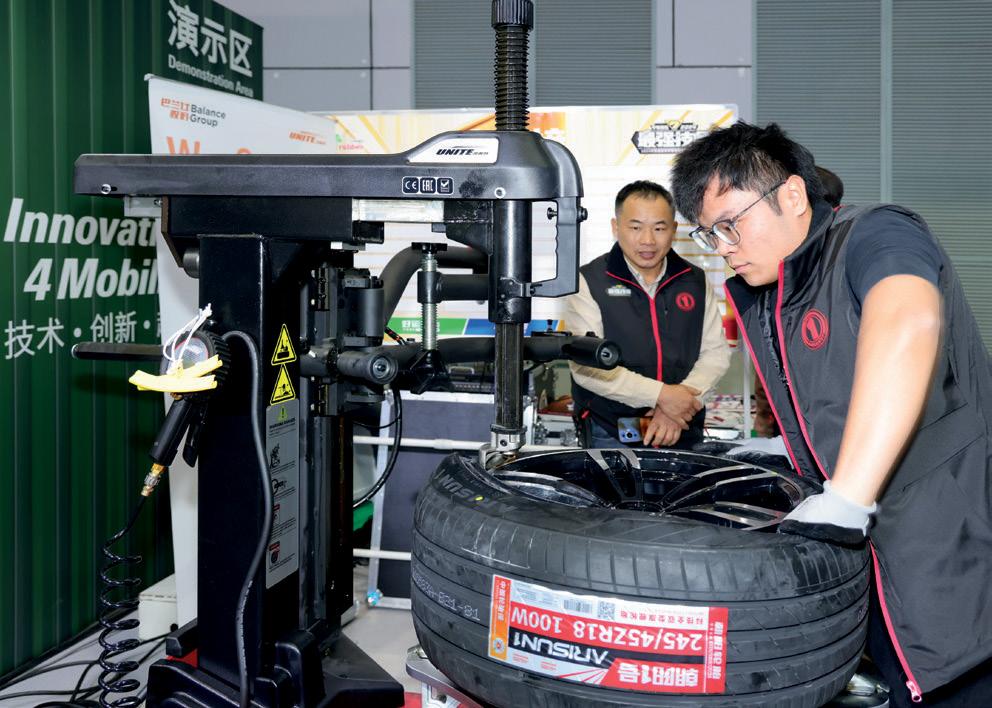
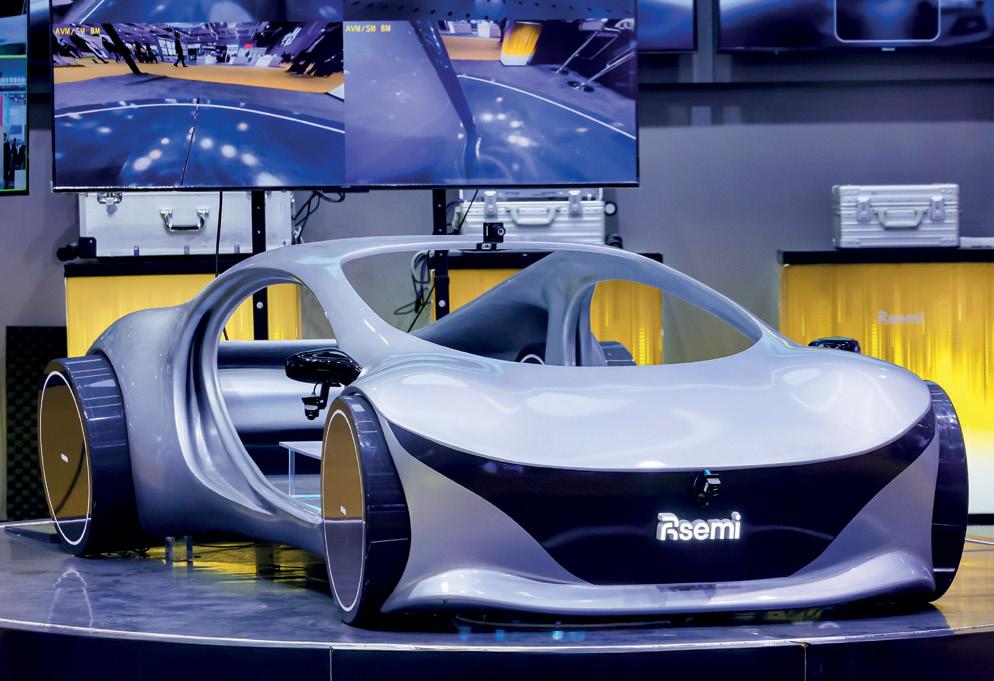
This complete showcase offers a comprehensive guide to emerging trends by the variety of resources from various sectors. The start-up zone, as an example, will see collaborations between research institutes, universities, start-ups and financial establishments, all presenting developing technologies poised for commercialisation through scenario-based presentations.
Digital technologies are also creating space for new business models in the automotive value chain. The Digital Services / Solutions zone embraces the integration of applications that improve efficiency
Our events will focus on electrification and intelligent transformation”
and reduce costs in the aftermarket. Companies here can also address crossborder e-commerce, as well as smart logistics and warehousing. The zone will introduce automatic identification technologies, digital solutions, and supply chain management solutions.
The International Automotive Industry Conference 2025 Presented by Automechanika Shanghai will offer perspectives on how current trends are influencing supply chains, market dynamics, and relevant policies and regulations. This year’s edition shall also emphasise the need to build up industry professionals and a Gen Z workforce during the International Automotive Industry Talent Development Conference 2025.
Ms Li Zhang, General Manager of China National Machinery Industry International Co Ltd, elaborated: “The transformations and innovations that define exhibits will also extend to the strong line-up of some 80 fringe events. As China’s automotive market continues to grow rapidly, our value-added events will focus on electrification and intelligent transformation, digital services, supply chain resilience, and sustainable development, creating an environment for technology exchange, trade, and policy insights. By bringing together global brands and offering targeted networking, the show supports businesses in international collaboration and identifying new opportunities in the evolving market.”
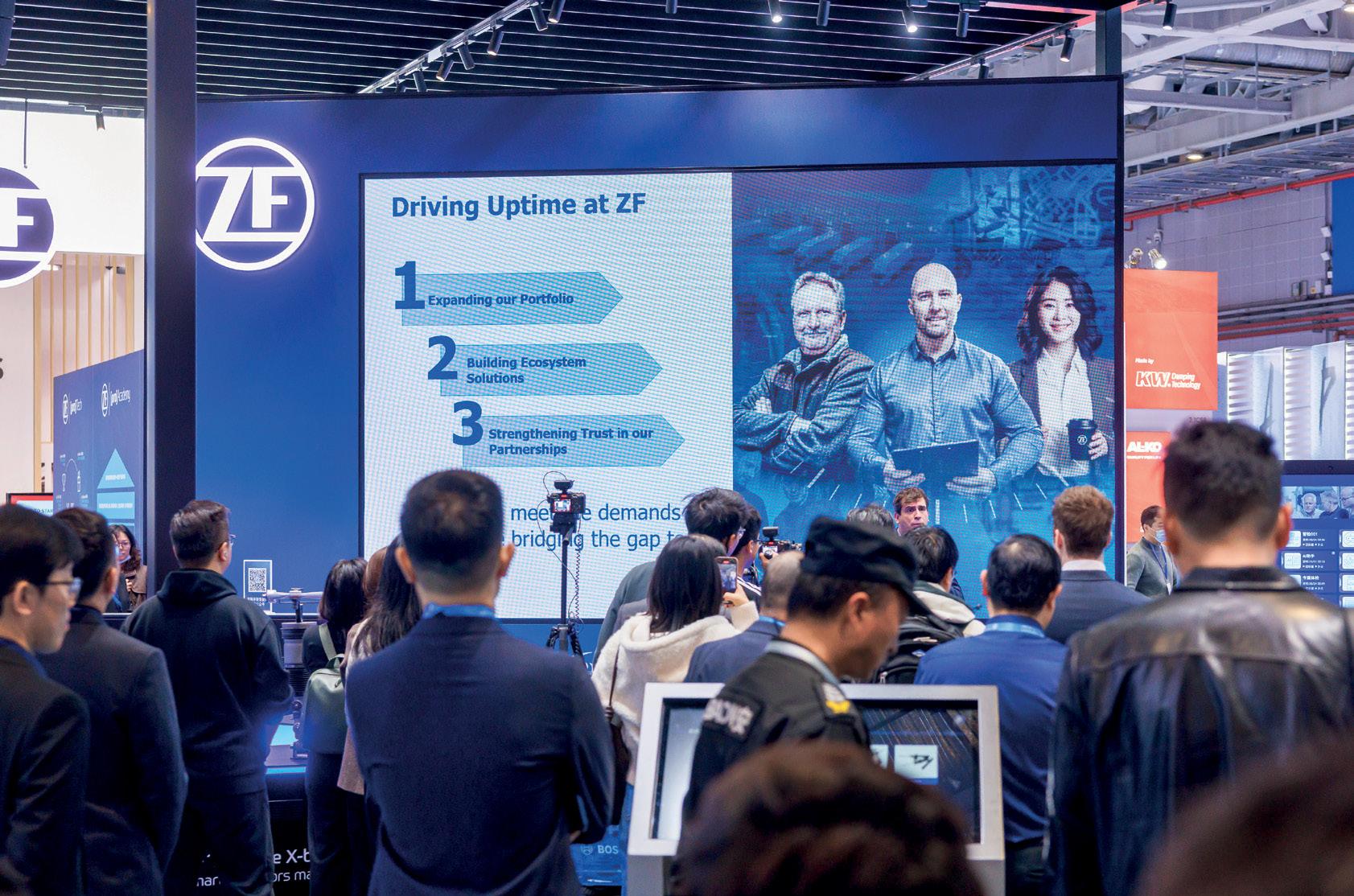
Driver-less services cleared to launch in 2025 WERIDE IN KSA
Autonomous driving technology company WeRide has achieved a major milestone with the announcement that it has secured Saudi Arabia’s first autonomous driving permit for its Robotaxi service. The permit positions WeRide as the only autonomous technology firm with certified operations in six countries: Saudi Arabia, China, the UAE, Singapore, France, and the United States.
The approval enables WeRide to deploy its Robotaxi fleet across Saudi Arabia, beginning with a pilot programme in Riyadh operated in partnership with Uber and local mobility player Ai Driver. The pilot covers high-traffic routes including King Khalid International Airport and key city centre locations.
A full commercial rollout of Robotaxi services is scheduled for launch by the end of 2025.
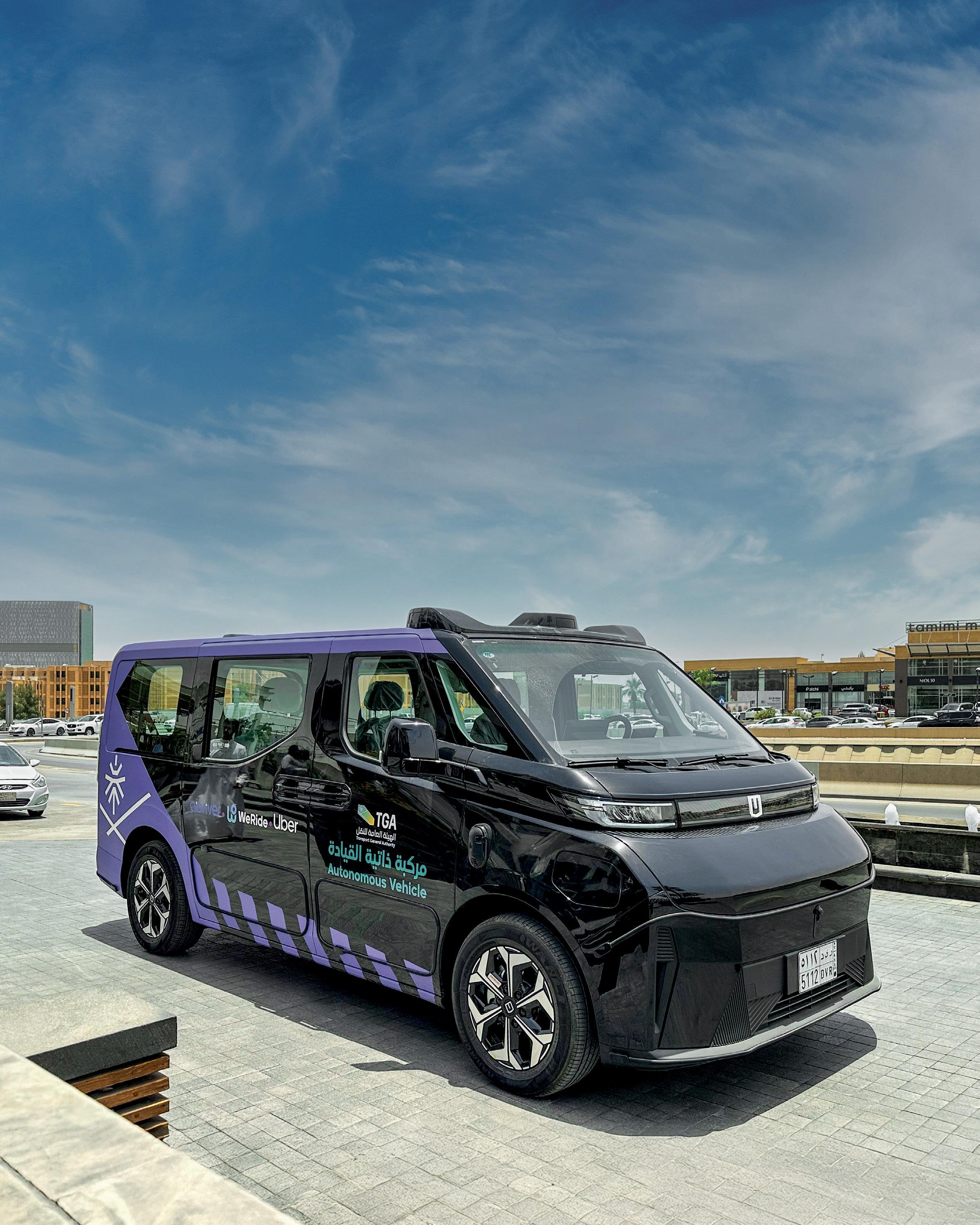
WeRide is the first AV technology firm to successfully complete the Transport General Authority’s Regulatory Sandbox for AV Piloting. The extensive process included multi-agency evaluations, performance tests, and safety validations.
“This permit marks a major step in our global expansion, enabling us to scale Robotaxi services and unlock new commercial opportunities in Saudi Arabia,” said Jennifer Li. “We thank the TGA for supporting our vision for safer, smarter transportation at scale.”
WeRide first entered the Saudi market in May 2025 and has since trialled its Robobus in locations including King Fahad Medical City, Aramco residential communities, AlUla, and the Ritz-Carlton in Riyadh. It has also introduced the Robosweeper S1 at King Fahad Medical City, in what is reported to be the first monetised autonomous sanitation project in the Middle East.
Regionally, WeRide is also conducting fully driverless Robotaxi testing in Abu Dhabi and plans to launch in Dubai in the coming months.
WeRide recorded another strong quarter in Q2 2025 as it bolstered its fleet in Abu Dhabi, the firm has reported. WeRide’s Robotaxi fleet size has tripled in the UAE capital since December 2024, accelerating regional commercialisation and maintaining the largest Robotaxi fleet outside of the US and China. Autonomous vehicle adoption has been slower than expected over the past decade with question marks still remaining over the safety of the technology on the roads. WeRide’s driver-less services, then, are important in-the-wild tests and the signs are promising. The company says it has now achieved over 2,200 days of safe Robotaxi operations, setting an industry benchmark for safety.
